Peter Obi: Nigeria Needs Leaders with Verified Credentials, Genuine Identities
Segun James
The presidential candidate of the Labour Party (LP) in the recent general election, Mr. Peter Obi,
has said Nigeria needs political officeholders who have an identity and authentic credentials.


Obi said this in the United States where there is an ongoing

case on President Bola Tinubu’s academic record.
Speaking at the Chinua Achebe Symposium at Princeton University, US at the weekend,
Obi who is one of those who filed an appeal at the Supreme Court to challenge the tribunal’s ruling that upheld Tinubu’s victory, said Nigerians must start working
towards a country driven by competence and commitment to fighting corruption. He submitted that leaders in Africa’s biggest economy must
Special Report on Nigeria @63…

Pages 51-59


be committed to the rule of law.
“We must have leadership that is committed to the rule of law…
Continued on page 5
Nigeria’s Reform Momentum in Jeopardy as Labour Strike Looms… Page

5





PDP Govs, N’Assembly Members Move to Rescue Party
Mount pressure on Saraki to vie for chairmanship Wike's camp favours Ortom, Gana
Chuks Okocha in Abuja
Governors and members of the National Assembly elected on the platform of the Peoples
Democratic Party (PDP) have commenced moves to rescue the party from its present docility since the suspension of its National Chairman, Dr. Iyorchia Ayu,
THISDAY has learnt. Investigation also revealed that some of the governors and National Assembly members are putting pressure on the former President
of the Senate, Dr. Bukola Saraki to vie for the position of the National Chairman of the party. However, the loyalists of the former Rivers State governor and

Minister of the Federal Capital Territory (FCT), Mr. Nyesom Wike are said to be rooting for a former governor of Benue State, Samuel Ortom, and a former Minister of

Information, Prof Jerry Gana. THISDAY gathered that the PDP governors, who are nine in
Continued on page 5
In Maiden Independence Speech, Tinubu Salutes Nigerians’ Perseverance Amid Economic Crisis
Says enduring today's pains panacea for a better future Enumerates his reforms to stabilise economy, direct fiscal, monetary authorities to fight inflation
Deji Elumoye, Chuks Okocha, Adedayo Akinwale and Sunday Aborisade in Abuja
President Bola Tinubu in his early morning broadcast today to mark Nigeria’s 63rd independence anniversary has hailed Nigerians for their courage in the midst of the nation's economic woes, which have made life unbearable for an average citizen.
Tinubu, in his maiden Independence speech, stressed that enduring today's pains is a panacea to a better nation in future.
He praised the labour unions as well as the civil society organisations for their support for democracy notwithstanding occasional disagreements with them.
This is as some of Nigeria’s present and past leaders have commended the resilience and indefatigable spirit of Nigerians, who in the face of the current economic realities, have continued to keep hope alive as they struggle
Continued on page 5
NEW OFFICERS ON BOARD…
L-R: Chief of Army Staff, Lt. General Taoreed Lagbaja; Chief of Defence Staff, General Christopher Musa; Minister of State for Defence, Bello Matawalle; Minister of Defence, Mohammed Badaru Abubakar; Commandant, Nigerian Defence Academy, Major General John Ochai; and the Vice President Kashim Shettima, during the passing out parade of cadets of 70 Regular Course in Kaduna..... yesterday
TRUTH & REASON
Sunday 1 October, 2023 Vol 28. No 10399 N400
www.thisdaylive.com

2 SUNDAY OCTOBER 1, 2023 • THISDAY

SUNDAY OCTOBER 1, 2023 • THISDAY 3
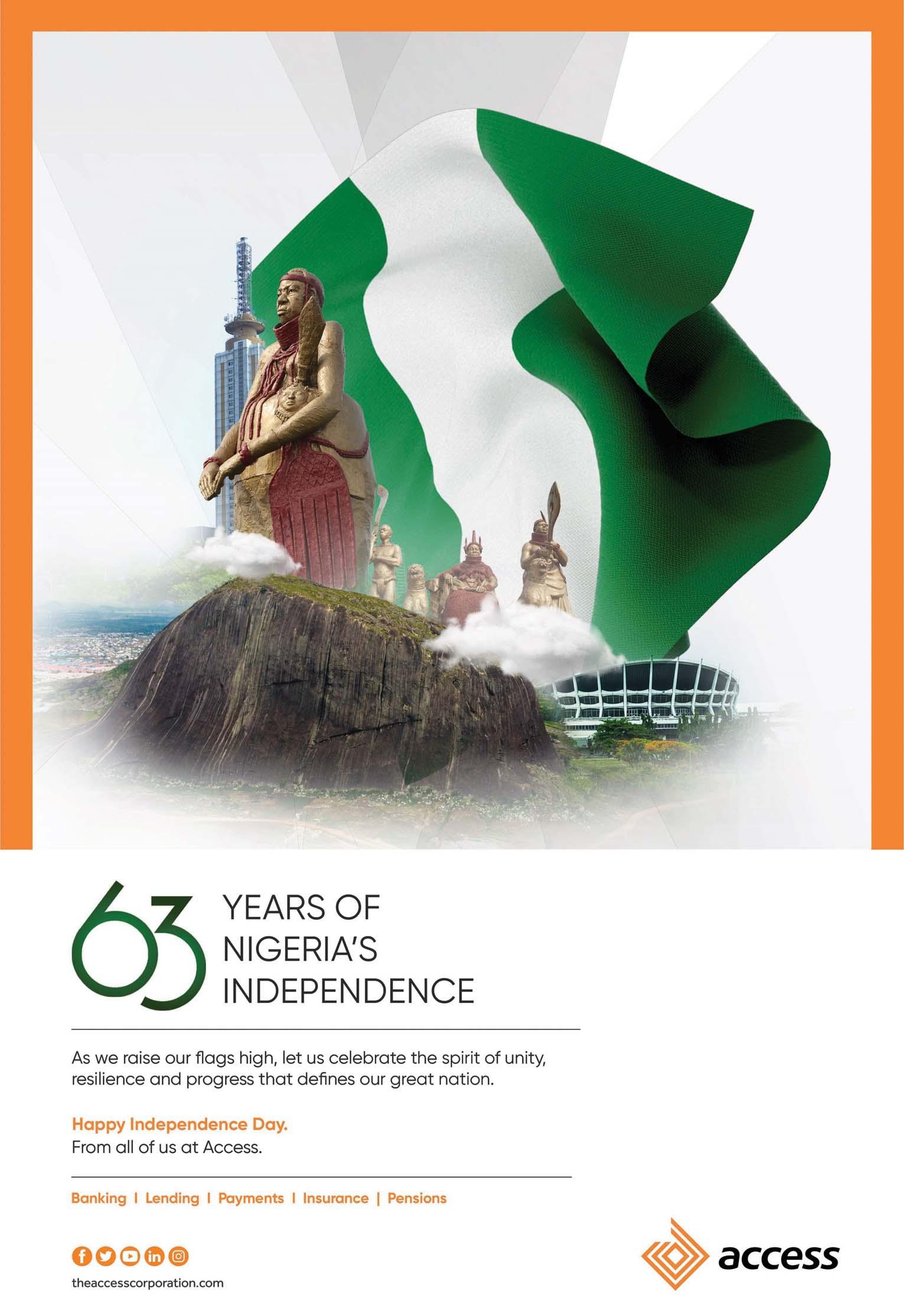
4 SUNDAY OCTOBER 1, 2023 • THISDAY
Nigeria’s Reform Momentum in Jeopardy as Labour Strike Looms
Festus Akanbi
There are indications that the economic reforms embarked upon by the current administration may have turned into mounting economic troubles and a reversal of fortunes for the country.
At his inauguration as the President and Commander-in-chief of Nigeria, President Bola Tinubu pledged to unify a complex system of exchange rates and scrapped a costly years-old system of
fuel subsidies, sending Nigerian markets soaring. However, economic analysts noted that as a result of the general feeling of disillusionment caused by issues like the unrelenting fall in the value of the Naira and the attendant high cost of living, prompting organised labour to declare an indefinite strike this week, it is very clear that the reform momentum has entered a reversed gear. There are also indications that
the Federal Government may have returned subsidy on petrol, using the supposed commercialised Nigerian National Petroleum Company (NNPC) Limited to manage the market shocks and maintain a monopoly of the downstream segment of the nation’s oil and gas industry.
According to a Reuters report, the naira value was at its lowest, going for as low as N1,000 per $1 at the black market, widening the gap with the official rate which
stood at N785 per dollar last week, despite President Bola Tinubu’s promise to unify the foreign exchange windows during his inaugural speech on May 29.
Meanwhile, petrol pump prices, have not budged since July despite a more than 30 per cent rise in crude oil prices.
Many analysts fear that the president may not be able to wean Nigeria off the costly policies that have stymied investment and throttled economic growth and
according to an African economist at research firm, Capital Economics, David Omojomolo, “Momentum just seems...almost in reverse."
However, public anger is swelling as inflation spirals higher, and Nigeria's two biggest workers' unions, the Nigeria Labour Congress (NLC), and Trade Union Congress (TUC) are planning an indefinite strike from Wednesday to protest a cost-of-living crisis.
An analyst with Tellimer, Patrick Curran said: "Sentiment towards
IN MAIDEN INDEPENDENCE SPEECH, TINUBU SALUTES NIGERIANS’ PERSEVERANCE AMID ECONOMIC CRISIS
to earn a living daily.
In their separate messages, former presidents Muhammadu Buhari, Goodluck Jonathan, former vice president and presidential candidate of the Peoples Democratic Party (PDP) in the 2023 general election, Atiku Abubakar; his counterpart in the Labour Party (LP), Peter Obi; President of the Senate, Senator Godswill Akpabio; former Senate President, Dr. Bukola Saraki; Speaker of House of Representatives, Hon. Tajudeen Abbas, and some governors have also hailed Nigerians on this year’s occasion.
Tinubu, was however, silent on the planned strike by the organised labour to protest the hardship being faced by Nigerians since the removal of fuel subsidy from Tuesday.
President Tinubu said: "I thank members of our dynamic civil society organisations and labour unions for their dedication to Nigerian democracy. We may not always agree but I value your advice and recommendations. You are my brothers and sisters and you have my due respect."
He likened those who wanted to perpetuate fuel subsidies and broken foreign exchange policies to people building their mansion in the centre of a swamp adding that Nigeria’s home must be built on safe and solid ground.
He said: "I said that bold reforms were necessary to place our nation on the path of prosperity and growth. On that occasion, I announced the end of the fuel subsidy.
"I am attuned to the hardships that have come. I have a heart that feels and eyes that see. I wish to
explain to you why we must endure this trying moment. Those who sought to perpetuate the fuel subsidy and broken foreign exchange policies are people who would build their family mansion in the middle of a swamp. I am different. I am not a man to erect our national home on a foundation of mud. To endure, our home must be constructed on safe and pleasant ground.
"Reform may be painful, but it is what greatness and the future require. We now carry the costs of reaching a future Nigeria where the abundance and fruits of the nation are fairly shared among all, not hoarded by a select and greedy few. A Nigeria where hunger, poverty and hardship are pushed into the shadows of an ever fading past.
"There is no joy in seeing the people of this nation shoulder burdens that should have been shed years ago. I wish today’s difficulties did not exist. But we must endure if we are to reach the good side of our future".
On steps being taken by his government, the president disclosed that "we have embarked on several public sector reforms to stabilise the economy, direct fiscal and monetary policy to fight inflation, encourage production, ensure the security of lives and property and lend more support to the poor and the vulnerable.
"Based on our talks with labour, business and other stakeholders, we are introducing a provisional wage increment to enhance the federal minimum wage without causing undue inflation. For the next six months, the average low-grade worker shall receive an additional
N25,000 per month".
President Tinubu also emphasised that the nation's monetary policy will henceforth be for all Nigerians and not few selected wealthy people adding that ongoing investigation into the financial transactions in the nation's apex and, the Central Bank of Nigeria (CBN) saying the Investigator's report is almost ready for submission to government.
He said: "I pledged a thorough house cleaning of the den of malfeasance the CBN had become. That housecleaning is well underway. A new leadership for the Central Bank has been constituted. Also, my special investigator will soon present his findings on past lapses and how to prevent similar reoccurrences. Henceforth, monetary policy shall be for the benefit of all and not the exclusive province of the powerful and wealthy."
The president in the speech also pledged to adhere to constitutional provisions in making key appointments and assured women, youth and physically challenged people of more patronage through appointments.
Buhari, Jonathan, Atiku, Obi, Govs, Others Hail Nigerians
Meanwhile, Buhari, in a statement by his spokesman, Mallam Garba Shehu, said Nigeria’s democratic rule has continued to inspire the rest of the continent with the creativity and diversity of its citizens.
He also sent warm greetings to President Tinubu and the people
PDP GOVS, N’ASSEMBLY MEMBERS MOVE TO RESCUE PARTY
number across the six geopolitical zones, are worried over the effects of the absence of a substantive chairman on the party.
The governors are also said to be concerned that the legal battle to reinstate Ayu is not making progress as the matter is stalled between the Benue State High Court and the Court of Appeal.
It was gathered that the governors - three from the Southsouth, two from the North-east, and one each from South-east, south-west, and North-west, met recently on how to reactivate the party.
The meeting, it was further learnt, was on how to ensure the emergence of a substantive national chairman that would complete Ayu's tenure.
A source privy to the development told THISDAY that the meeting also explored ways to achieve a total reorganisation and reconciliation of the party if the outcome of the presidential election petition at the Supreme Court does not favour PDP’s presidential candidate, Atiku Abubakar.
With the suspension of Ayu on May 26, 2023, a national chairman would be appointed from his North-central zone to complete his tenure.
The Deputy National Chairman of the party, North, Ambassador Iliya Damagum has been acting as the national chairman.
The quest for a substantive national chairman, it was learnt, will not affect the current structure of the National Working Committee
(NWC) of the party as currently constituted.
THISDAY was told that National Assembly members are also involved in the search for leadership that will give the party direction.
In this regard, the governors and National Assembly members are putting pressure on a former Senate President, Saraki, to accept to lead the party in the capacity of national chairman.
Multiple sources that spoke to THISDAY on condition of anonymity, confirmed that pressure was on Saraki to lead the party.
One of the sources said: "We find him very accommodating with a sense of loyalty. He is also from the same zone as Ayu.
"Saraki is a natural unifier who enjoys wide acceptability and has goodwill among all groups, including the G-5 Group, Atiku’s acolytes, the non-aligned members, and others, such as the members of the NWC,” the source explained.
Saraki, another source said, did very well when in 2021, he handled the reconciliation assignment of the party that brought life back into the party when it was haemorrhaging after the 2019 loss of the presidential election.
“Saraki also enjoys the support of elder statesmen like Generals Ibrahim Babangida, Aliyu Gusau, and the rest of them. His acceptance by the youths is also a strong factor”, the source added.
According to the source, " the governors and members of the National Assembly will be visiting Saraki immediately after the Independence anniversary holiday
of Nigeria on the occasion of the 63rd independence anniversary of the nation.
“I am very optimistic that democracy as a system of government will continue to gain strength year after year in our nation. Happy anniversary," Buhari added.
On his part, Jonathan, in his goodwill message released by his spokesman, Ikechukwu Eze, commended Nigerians for their steadfastness and loyalty to the country, in the face of the modest successes recorded and the developmental challenges the nation has faced since independence.
The former president encouraged Nigerians not to despair but remain committed to the task of charting a more progressive path for a greater tomorrow.
He noted that the anniversary offers citizens and leaders of the country to reflect on Nigeria’s journey of nationhood since independence.
In his message, Atiku urged Nigerians to be prepared to pull the country back from uncertainty to a place of common safety.
Atiku noted that the anniversary was coming at a time when the country is at a crossroads in many aspects of national life.
According to him, the talents and doggedness of young Nigerians who have refused to give up on the country are the inspiration for a greater future that the nation celebrates.
The presidential candidate of the LP, Obi, in his message, predicted that there will be a country, in reaction to the saying of the literary
sage, Prof. China Achebe in one of his novels that ‘There Was a Country.
In a statement by his Personal Assistant, Tai Emeka Obasi, the former Anambra State governor noted: "If Chinua Achebe was to come to Nigeria today, he would weep bitterly for his country as comparatively, there was really no trouble with Nigeria four decades ago when the iroko of literature, Achebe wrote the book, "The Trouble With Nigeria. "If Achebe was alive, he would have taken back the book. When he wrote it, there was no trouble. Now, there is real trouble in Nigeria," Obi added.
Obi re-echoed Achebe's stance that "the problem of Nigeria is simply a failure of leadership, adding that Nigerian problem is the unwillingness or inability of its leaders to rise to the responsibility, of the challenge of personal example which are the hallmarks of true leadership"
The President of the Senate, Senator Akpabio in a statement issued by his Special Adviser, Media and Publicity, Hon Eseme Eyiboh, acknowledged the present challenges in the polity. He, however, said that there were many landmarks in the nation’s 63 years to give a sense of optimism for a better tomorrow.
In his message, former Senate President, Dr. Abubakar Bukola Saraki has congratulated Nigerians on the 63rd anniversary of the nation’s independence and urged them to believe that despite the difficult situation confronting the country now, good days will soon return.
Nigeria has been continuing to sour as the initial reform momentum under President Tinubu's administration has faded." Tinubu's decision to let the official naira rate weaken saw it briefly converge with the black market. Recently, he promised investors they could take money out, touting a "reliable, one-figure exchange rate of the naira." But the gap widened to nearly
Continued on page 12
of the nation.
In his message, Obaseki commended the resilience and indefatigable spirit of Nigerians. The governor, in a statement, urged Nigerians to continue to pray and work in unity to overcome the country’s present economic challenges.
On his party, Governor Oborevwori, in a statement by his Chief Press Secretary, Sir Festus Ahon, implored Nigerians not to give up despite the country's current dire circumstances.
Similarly, Makinde, in a statement by his Chief Press Secretary (CPS), rallied Nigerians to dream and work for a better Nigeria as the country celebrates its 63rd independence anniversary.
The governor, who called on all Nigerians to look at the prospects of the country, the possibilities and opportunities rather than the challenges, said it was time to put the country first.
Also, Mbah urged Nigerians to work together for the country's peace and development, saying national interest must always take precedence over every other interest and consideration.
The Enugu governor, who also stressed the import of quality education to nation building, equally commended Nigerians for their resilience in the face of socio-economic challenges, expressing strong conviction that the country would emerge from the present difficulties stronger and more prosperous.
to inform him of the decision for him to vie to lead the party at this moment of its trying times.
“Those mounting pressure on Saraki are expected to visit him in Maitama, Abuja; under the guise of discussing the future of the main opposition party. While some will make it a single-person visit, others come as small groups,” the source added.
Another source privy to the ongoing horse-trading also told THISDAY that the camp of the Minister of the FCT, Wike is also deeply involved in the search for a new chairman for the PDP.
"It was learnt that the Integrity Group is trying to prop up the former governor of Benue State, Dr. Samuel Ortom, or the former Minister of Information, Prof Jerry Gana for the substantive office of national chairman," the source explained.
He, however, disclosed that the North-central caucus of the PDP is resisting this arrangement on the ground that it was the same Wike and his group that brought
Ayu in the first place.
THISDAY learnt that the PDP leaders are concerned that the opposition party will die under the Tinubu presidency if not led by a person who can pull every member or group back into the fold and build a strong party.
A member of the NWC said that with the current situation of the party, which has left the national secretariat as a graveyard with no activity, the only solution is a reorganisation and reconciliation with somebody like Saraki at the helm of affairs.
"He has done it before. If given the chance and support, he can do it again", THISDAY was told.
The source added that if Saraki accepts the offer, meetings of various organs of the party would be summoned to commence the process of getting a substantive national chairman in place.
Meanwhile, THISDAY also learnt that the former Senate President, Senator David Mark has also opted out of becoming the national chairman of the party.
In a statement signed by Yusuph Olaniyonu, head of his Media Office, Saraki stated that no matter the state of the economy, politics, and social situation, the Independence anniversary presents an opportunity for every citizen to celebrate and renew their commitment to the country.
He added that the economic situation of the country, the political challenges, poor social conditions, and security crises are strong factors that could make the people unhappy and reduce their enthusiasm to celebrate as they usually do every first day of October.
In his message, the Speaker of the House of Representatives, Abbas called on fellow citizens and compatriots to keep hope in the country alive, saying doomsayers and pessimists would soon be disappointed.
Edo State Governor, Mr. Godwin Obaseki; Oyo State Governor, Seyi Makinde, Enugu State Governor. Mr. Peter Mbah and Delta State Governor, Sheriff Oborevwori have also congratulated Nigerians on the 63rd independence anniversary
The governor saluted the nation's founding fathers for their doggedness, patriotic zeal, and lofty visions for Nigeria, urging all tiers of government to work together to reorient the country towards the path of recovery in all sectors of national life.
Deputy Senate President, Senator Jibrin Barau; his counterpart in the House of Representatives, Hon. Ben Kalu, and the National Chairman of the ruling All Progressives Congress (APC), Dr. Abdullahi Ganduje have also congratulated Nigerians on the occasion of the nation’s 63rd Independence anniversary, promising that the ruling party will remain true to its promises and pledges to the people
On its part, the PDP congratulated Nigerians for surviving what it described as the eight years and four months dreadful administrations of the APC, describing the APC’s regime as the worst in history.
In a statement by its National Publicity Secretary, Debo Ologunagba, the party noted with pain that the APC has reversed all the gains made by the founding fathers as well as the immeasurable achievements recorded by the PDP in its 16 years in government; a period widely acknowledged as Nigeria’s golden years.
PETER OBI: NIGERIA NEEDS LEADERS WITH VERIFIED CREDENTIALS, GENUINE IDENTITIES
that has an identity and credentials that can be verified. We can start thinking of a new Nigeria with competence, and capacity that is committed to fighting corruption.
Is it possible to fight corruption?
The answer is yes!
“The trouble with Nigeria is self-inflicted. If Achebe was alive, he would have taken back the book. When he wrote it, there was no trouble. Now, there is
real trouble in Nigeria. Rascality has become a measure of success in Nigeria. That must change,” he noted.
Recall that former Vice-President Atiku Abubakar, who contested the presidential election under the Peoples Democratic Party (PDP) is currently digging for the academic and personal records of Tinubu, from the Chicago State University (CSU).
A court presided over by Judge Geoffrey T. Gilbert had ruled in favour of Atiku, ordering CSU to release Tinubu’s record, but the Nigerian president has urged the court not to grant all Atiku’s requests.
Tinubu had since filed a motion challenging the Northern District of Illinois order directing the Chicago State University to release his academic records within
two days.
In the motion, Tinubu contended that the district court breached the US Constitution by acting as a final court in such matters of discovery.
He argued that a magistrate should only report and recommend to the district judge in such matters and not to make a final order for immediate compliance.
NEWS 5 OCTOBER 1, 2023 •THISDAY, THE SUNDAY NEWSPAPER
CELEBRATING A MILESTONE…
Tribunals Uphold Victories of Ogun, Sokoto, Taraba Governors
James Sowole in Abeokuta, Onuminya Innocent in Sokoto and Wole Ayodele in Jalingo
The Governorship Election Petitions
Tribunals sitting in Abeokuta, Sokoto and Jalingo yesterday upheld the election of Ogun State Governor, Prince Dapo Abiodun, Governor Ahmed Aliyu of Sokoto State and Taraba State Governor, Agbu Kefas.
While Abiodun and Aliyu are of the All Progressives Congress (APC), Kefas is a member of the Peoples Democratic Party (PDP).
In Ogun State, the tribubal upheld the return of the Governor Abiodun by the Independent National Electoral Commission (INEC) in the March 18, 2023 election.
The three-man of tribunal consequently, dismissed the petition filed by PDP and its candidate, Hon Oladipupo Adebutu against the return of the governor.
In a unanimous decision of the panel, which was read for over 11 hours, the tribunal held that the petitioner, failed to prove the
allegations levelled against the return of the incumbent with credible evidence on most issued raised in the petition.
According to the panel, witnesses and evidences proffered by the petitioners were strong enough to prove, allegations of corruption, noncompliance of the March 18 election with Electoral Act 2022, allegation of conviction of Abiodun by the United States of America Court , forgery of WAEC certificate, which could have led to disqualification of Abiodun from contesting the election.
However, the tribunal ruled that the allegation of vote buying against Adebutu due to production of pre-loaded ATM cards, could not be established against the petitioner, because names on the cards, were not the same with the name of the petitioner.
In a unanimous judgment, the Sokoto State tribunal Chairman, Justice Haruna Mshelia, said the governorship candidate of the PDP, Sa’idu Umar, and his party, were unable to prove the six grounds
Adebanjo: Current Constitution Must Be Changed to Solve Nigeria’s Problems
Adedayo Akinwale in Abuja
The leader of the Pan-Yoruba sociocultural organisation, Afenifere, Chief Ayo Adebanjo, has said Nigeria needs to do away with the 1999 Constitution to put an end to most of the problems stunting the growth of the country.
Adebanjo, who featured as a guest yesterday on a live television programme, suggested that Nigeria would be put on the right path once the constitution which he claimed was imposed on the country by the military is changed.
He said Nigeria lost direction after independence when the military seized power and changed the constitution, adding that this is what is damaging the foundation of a stable future for the country.
“We lost the ball when the military seized control and changed the constitution. We’ve got it wrong since the military took over and we got it wrong when they went back to the barracks. They didn’t go back with their luggage of the constitution, which we didn’t know about.
“They imposed a constitution on us, which is the cause of the problem today. So, to go back to where we were, we should change this constitution; that’s the bottom line of our problem. All the problems we are having are based and embedded in the fraudulent constitution imposed on us by the military,” he said.
According to the elder statesman, the current 1999 Constitution makes the Nigerian government look like a unitary system of government, noting that a unitary constitution is inappropriate for a multi-ethnic nation like Nigeria.
“You cannot rule this country under a unitary system of government. We have this problem of disunity because of the unitary form of government the colonialists were using.
“What I am saying is that the problem we are having in this country today, whether economic, political, or cultural, it’s based on the way we are running the country under a wrong constitution that was not embedded when we got our independence,” Adebanjo said.
formulated in their petition.
He said that the grounds bordered on alleged ineligibility for Aliyu and Gobir to contest, falsification of certificates, variation of names, election frauds, and non-compliance with electoral guidelines.
Mshelia said also that the petitioners were unable to prove the allegations beyond reasonable doubt as required by the law as 70 per cent of the exhibits were out of context because they related to State Assembly elections conducted on the same dates.
According to him, to prove forgery, two different documents or persons needed to be presented and the petitioners failed while the
variation of names issue was settled by Supreme Court judgments.
Mshelia said that three subpoenaed witnesses were not tenable as they were not makers of the documents from the alleged primary school, while the other 28 polling unit agents who testified could not fully identify themselves along with their roles. The tribunal chairman said that the alleged 138 polling units’ frauds were not adduced to indicate how substantial non-compliance of the elections had marred the election’s outcome.
Mshelia added that the tribunal dismissed all the preliminary objections on competency to institute
the case by the respondents as the petitioners duly linked the grounds in the petition. He dismissed the petition for lack of merit and failure to prove the allegations by the petitioner.
In Taraba State, the three-man panel headed by Justice Ayo Sunmonu dismissed the petition filed by the New Nigeria People’s Party (NNPP) and its governorship candidate, Prof. Yahaya Sani, on the grounds of lack of sufficient evidence. Sunmonu dismissed the petition, stating that the petitioners failed to justify the relief they sought.
“The petitioner failed to prove his ground that the governor was not duly elected, and therefore, the
petition lacked merit,” he said.
The counsel to the governor, Mr. Sam Adda, applauded the judgment.
“It is a landmark judgment,” he said.
The NNPP and its gubernatorial candidate had filed a petition before the tribunal seeking the cancellation of the election, alleging that it was characterised by irregularities.
Other relief sought by the NNPP was for the tribunal to order a fresh election in the state.
Apart from the alleged irregularities, the party also alleged non-compliance with the Electoral Act 2022, as a major reason for the demand for the cancellation of the election, among others.
LCCI Calls on FG to Increase Workers’ Minimum Wage
Dike Onwuamaeze
The Lagos Chamber of Commerce and Industry (LCCI) has called on the federal government to increase the country’s minimum wage to ameliorate the impact of the harsh reforms being initiated by the President Bola Ahmed Tinubu administration.
It made the call yesterday in its statement on Nigeria’s Independence anniversary entitled: ‘The Nigerian Economy at 63: Sustaining Reforms and Promoting Macroeconomic Stability,’ which was signed by its President, Dr. Michael Olawale-Cole. He said: “LCCI recognises the impacts of the reforms on vulnerable workers and low-income earners.
The chamber is of the view that there is urgent need to review the wage structure of Nigerian workers. At $30 for 30 days, the minimum wage is extremely poor.
“With high inflation rate, volatile exchange rate, low GDP growth, weak infrastructure, insecurity, etc., I call on the federal government to address the macroeconomic issues and the insecurity challenges facing the country.”
Olawale-Cole also observed that the country’s “business environment remains a concern to investors, especially in the real sector. Weak infrastructure, uncertain policy environment, and institutions have continued to adversely affect the efficiency, productivity, and
competitiveness of many enterprises. These conditions pose a major risk to job creation, economic inclusion, and competitiveness, especially with the Africa Continental Free Trade Area (AfCFTA) agreement now in place.”
He said that “the way forward is to address the fundamental constraints to manufacturing competitiveness. In reality, job losses in the sector have increased over the decades as productivity declined on the back of the difficult operating environment.
“Our nation is at a crossroads and in dire need of big decisions to drive the drastic transformation the economy required to return to meaningful economic prosperity.”
The chamber recalled that the Central Bank of Nigeria (CBN) in its July 2023 MPC meeting increased the benchmark interest rate by 25 basis points to 18.75 per cent from 18.5 per cent and commented that “this consistent hawkish stance by the monetary authority is in response to the high inflationary pressure, consistent weakening in the value of the local tender, and developments in the global economy.”
The chamber also identified poor power supply, insecurity and weak infrastructure as major burdens on businesses in Nigeria.
It said power supply has been on progressive decline since 1960 when the country gained its independence from Britain.
Eight Rescued as Gunmen Abduct 25 Church Members in Ondo
David Fidelis in Akure
The Ondo State Police Command yesterday said it had begun a search for the gunmen who, on Friday, kidnapped no fewer than 25 members of the Christ Apostolic Church (CAC), Oke Igan, in Akure, Ondo State.
The state police command added that it had rescued eight out of the 25 kidnapped CAC people.
The victims, said to be members of church’s choir, were reportedly attacked and kidnapped on the Benin-Akure Expressway around Ifon axis in Ose Local Government
Area of the state, Friday evening.
They were said to be traveling to Ifon for a burial ceremony while the hoodlums waylaid them and dragged them to the bush to an unknown destination.
A member of the church, who pleaded anonymity, said the vehicle conveying the victims was seen abandoned by the roadside. He said the matter had been reported at the police station.
The spokesperson of the Ondo State Police Command, Funmi Odunlami-Omisanya, said “The incident happened Friday afternoon, the police were informed that a church bus
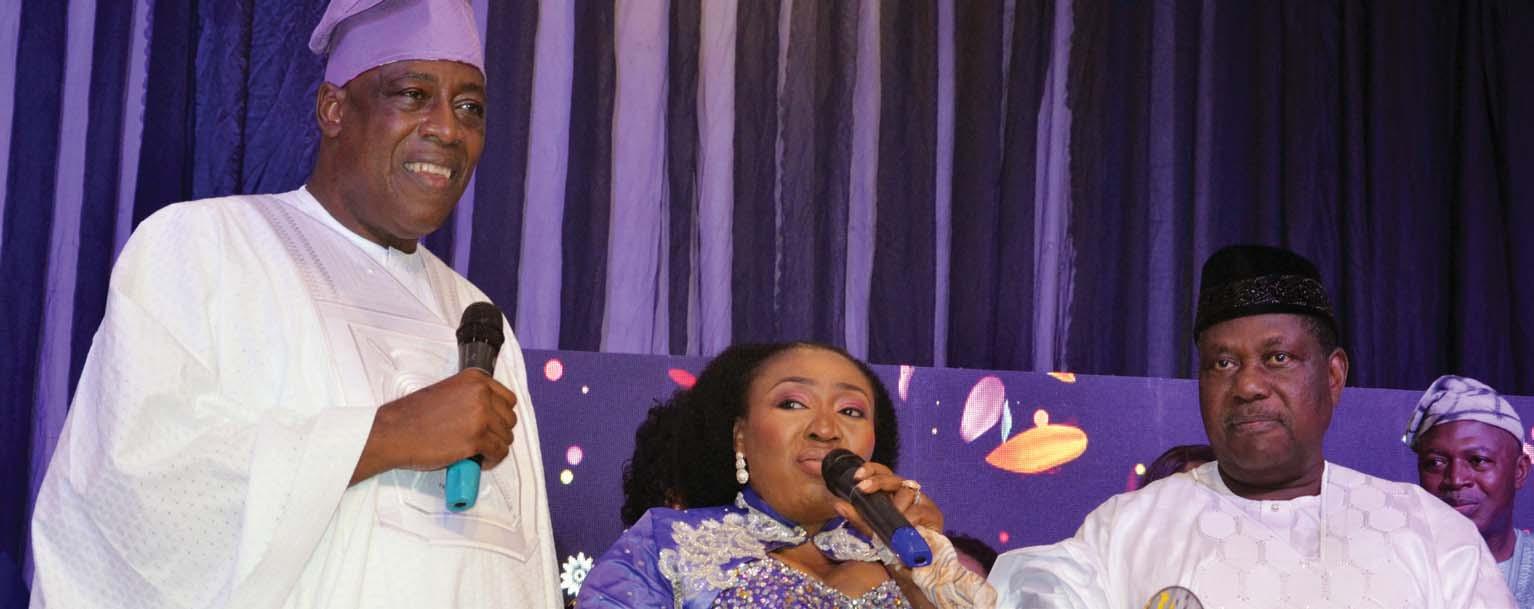
with the Inscription CAC was abandoned around the Elegbeka area and there are also suspicions that the passengers in the vehicle were kidnapped.
“But we are already on the trail of the kidnappers with the view to rescue the abducted victims. Our men from the Anti-kidnapping squad are combing the bush already.”
Meanwhile, the Ondo State Police Command said it had rescued eight out of the 25 people.
The state Police Public Relations Officer, Odunlami, confirmed that eight of the victims had been rescued while efforts were ongoing
to rescue the remaining victims.
“Good news!, eight victims rescued, effort is on to rescue others unhurt,” she said on a WhatsApp platform.
But speaking on the ugly incident, the Commander, of the state security outfit codenamed Amotekun, Chief Adetunji Adeleye, confirmed the escape from their abductors.
Adeleye said that personnel of Police Anti Kidnapping, Amotekun Corps in conjunction with the Nigeria Army are on the kidnapper’s trail in Owo/ Ose axis to ensure that remaining victims are released.
NEWS 6 THISDAY, THE SUNDAY NEWSPAPER• OCTOBER 1, 2023
L-R: Celebrant, Mr. Tarka Kwaghve, his wife, Mary; Secretary to the Government of the Federation, Senator George Akume, during Kwaghve’s 65th birthday celebration in Abuja…recently KINGSLEY ADEBOYE
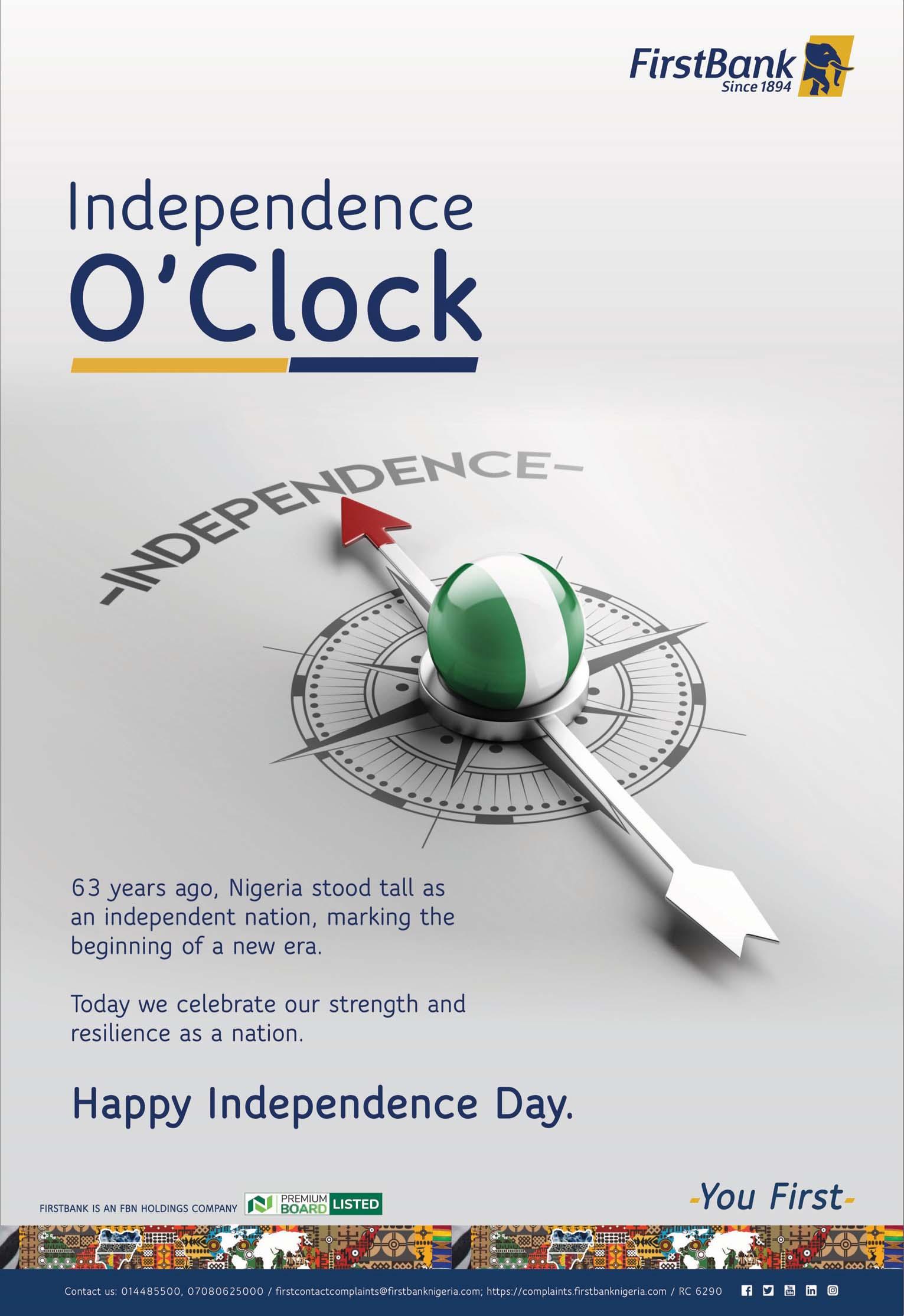
SUNDAY OCTOBER 1, 2023 • THISDAY 7
HUMANITARIAN SERVICES ON THEIR MINDS…
Tinubu Vows to Eliminate Terrorism, Criminality, Poverty in Nigeria
Deji Elumoye in Abuja
President Bola Tinubu has reiterated his administration's commitment to eliminating poverty, terrorism, and all forms of criminality in the country.
The president, who was represented by Vice President Kashim Shettima, gave the pledge yesterday during the passing-out
parade of Cadets of the 70 Regular Course, Direct Short Service Course 27 (Army), and Direct Short Service Course 31 (Air Force) of the Nigerian Defence Academy (NDA) in Kaduna.
Presenting the president's address entitled, ‘The Heroes of Nigeria's Path to Prosperity and Security,’ at the passing-out parade, the vice president said, "Every day, every
FIRS: FG Granted N1.8tn Tax Incentives in 2022
James Emejo in Abuja
The federal government granted various tax incentives that amounted to N1.81 trillion in the 2022 financial year, the Federal Inland Revenue Service (FIRS), has said.
In its 2022 annual report and financial statement, according to Premium Times, the tax agency said it granted tax incentives, different from tax credits, to support businesses and enhance business and economic performance in the country.
The report showed that the FIRS, in the year 2022, collected a total of N10.1 trillion in both oil (N4.2 trillion) and non-oil (N5.9 trillion) revenues as against a target of N10.44 trillion.
The actual oil tax revenue collection of N4.2 trillion exceeds the set target of N3.32 trillion while the N5.9 trillion non-oil revenue tax represented 90 per cent of its budget, the agency said.
It is the first time that the FIRS crossed the N10 trillion mark in tax revenue collection.
The agency would have exceeded its target if not for the tax waived on account of various tax incentives.
A breakdown of tax incentives include: Loans granted for agriculture: N3.19 billion; Government bonds: N132.35 billion; Government Treasury Bills: N212 billion; Pioneer Incentive: N388.83 billion; VAT Exemptions: N1.068 trillion.
At the end of the year 2022, the total tax incentives in these categories totalled N1.8 trillion.
VAT exemptions were granted on interest on agric loans to allow farmers enough resources to improve their output, FIRS said.
This category is for VAT
exemptions on interest received by companies/investors on federal government securities (bonds and treasury bills) to further encourage investments in government securities and provide resources to finance government expenditures.
The FIRS report did not state how many companies or investors benefitted under this category.
The VAT Act CAP. VI LFN 2014 requires that you pay VAT on all goods manufactured /assembled in or imported into Nigeria, and all services rendered by any person in Nigeria except those specifically exempted under the law as follows: basic (raw) food items, baby products, medical services and services rendered by Community Banks etc.
The federal government granted tax holidays for a minimum of three years to companies with Pioneer Status awarded by the Nigerian Investment Promotion Commission (NIPC).
This was under the Industrial Development Income Tax Relief Act (IDITRA) to boost investment in the sectors in the approved pioneer status list.
In 2022, NIPC listed 57 companies as PSI beneficiaries. These companies include Aarti Rolling Mills Limited, Stallion Motors Limited, Von Automobile Nigeria Limited, Ikorodu Steel Mills Limited, Confluence Metals Fabrication Company Limited, Cormart Nigeria Limited, and Princess Medi–Clinics Nigeria Limited.
Others are Tiamin Rice Limited, Honeywell Flour Mills Nigeria Plc, Outsource Global Technologies Limited, Crown Flour Mills Limited, Elvis Hotels Nigeria Limited, Olam Hatcheries Limited, etc.
minute, we are reminded of the consequences of economic and social disintegration around us.
This is why we favour cooperation and the formation of bilateral and multilateral alliances to create opportunities for our people.
"We are implementing programmes and policies to empower our citizens to combat the challenges of poverty, criminality, and terrorism. From preparing for the food security crisis triggered by the Russian-Ukrainian war to responding to banditry attacks on farmers, natural flood disasters, and the repercussions of military coups, this administration has remained vigilant in devising solutions to mitigate their impact and enhance national security," Tinubu said.
As part of the moves to deal decisively with the criminal elements, President Tinubu noted that his government has embarked on a new era in the country's national defence and security strategy.
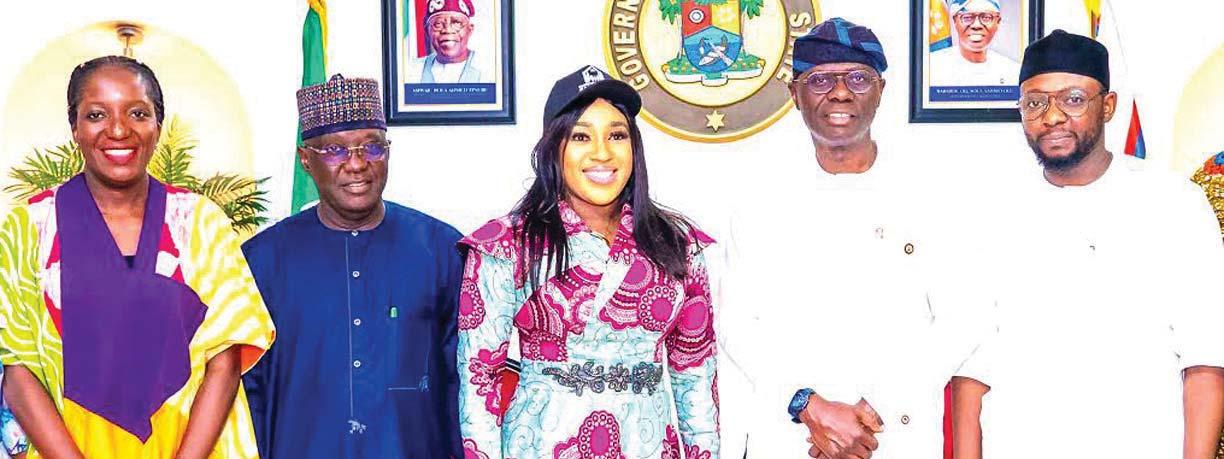
This, he said, would be driven by a resolute commitment to confront the substantial threats and challenges that confront us within the West African sub-region. He said: "I have directed all heads of defence and security institutions to unite in their efforts to protect our nation's integrity and well-being, and as Chairman of the ECOWAS, we
are diligently working to enhance our regional conflict management and development mechanisms. To forge a path towards greater peace, stability, and progress across West Africa and beyond is not negotiable".
The president noted, however, that in tackling poverty inflicted on Nigerians by activities of the terror groups, he would treat every region equally and give them a sense of belonging in his government.
"Justice is the mainstay of prosperity, and so we are going to be fair to each region. Whether in tackling the secessionist elements disrupting the peace and economic activities of the good people of the South-east or doubling up our efforts in winning the counter-insurgency in the North-east, and whether in pursuing normalcy in the Northwest or in making the farmer-herder crises a thing of the past in the North-central, every group will be treated as equal and given a sense of belonging in our government.
"While I acknowledge that we have made bold decisions to bolster our economy, even as some developed economies face the threat of recession, our commitment remains resolute. We are intensifying our efforts to implement tangible measures that will alleviate the hardships caused by the removal of fuel subsidies and the unification of exchange rates.
"Our immediate actions, such as reducing taxes on strategic manufacturing industries, distributing grains from the national reserve to vulnerable demographics, providing fertilizer and farm inputs, and extending soft loans to small and medium-scale industries, all serve as a clear message to our nation.
"We stand firmly with our citizens, determined to guide our country towards a path of accelerated economic growth and opportunities, where no one lives on handouts."
The president further said he was proud of the devotion and dignity with which the NDA and its alumni have safeguarded Nigeria, noting that the passing-out parade was not just a ceremony to honour the transition of the graduates to a more active phase of duty to their fatherland.
According to him, the ceremony "stands as a symbol of our enduring commitment to the ideals of patriotism and investment in our human capital.
"I am, therefore, delighted to witness the passing-out parade of the Cadets of the 70 Regular Course, Direct Short Service Course 27 (Army), and Direct Short Service Course 31 (Air Force)," he added.
"Our solemn commitment to safeguarding Nigeria’s security
hinges upon a crucial realization that without vigilant attention to the very foundations and individuals who fortify order and stability, this promise remains unattainable. It is here, at the Nigerian Defence Academy, that this promise crystallises into action.
"Year after year, we reaffirm that sound education is the ultimate security strategy, and our resilient Armed Forces are proof of this. This prized legacy, thankfully, is one to which we are not the only testifiers. There's an international consensus on the quality of this Academy, an institution that has given a sense of purpose to alumni from as far as Zimbabwe, Uganda, Togo, Sierra Leone, Niger, Central African Republic, Chad, and Burkina Faso", the President further said.
Speaking earlier, the Commandant, of Nigeria Defence Academy (NDA), Major General John Ochai, expressed gratitude to President Tinubu for his unwavering commitment and support to the academy towards the realisation of the noble dreams of its founding fathers.
He applauded the personnel and staff of the academy for their unwavering efforts in discharging their duties, as well as the graduating cadets for their tireless efforts throughout their training.
Senator Cries out as Bandits Overrun Niger Communities
Laleye Dipo in Minna
As bandits continue to run riot, killing and kidnapping people in the Niger East Senatorial zone of Niger State, the Senator representing the area, Sani Musa has cried out to the federal government to come to the rescue of his people.
No fewer than 30 villagers have been kidnapped in recent weeks in the senatorial zone, most of them women.
While five of the kidnap victims were reportedly killed, one was severely injured by the bandits.
An entire community in Munya Local Government Area (LGA), according to reports from the area, has also been taken over by the bandits who used it as their camp.
Musa described the latest
development in his senatorial district as unacceptable and asked the federal government and the security agencies to do the needful by rescuing "my people from the hands of these blood-thirsty marauders."
He lamented that the heightened insecurity in the Munya LGA has rendered the villagers jobless as they can no longer access their farmlands and other means of livelihood.
The senator noted that his constituency accounts for almost 60 per cent of food production in the entire Niger State, adding that as a result of the activities of bandits and terrorists, 80 per cent of these farmers have been forced to leave their farms and homes.
“The latest attack and acts
of terrorism targeted at my people by these criminal elements are inhuman, wicked and unacceptable. The people have been forced out of their farm lands and their ancestral homes, and have been turned into refugees in their own land, this is unfortunate," Musa added.
"I seriously feel the pain of my people; it is very sad to see people being forced out of their homes without committing any crime. My people are helpless and the authority must act immediately to restore normalcy in the communities”.
Musa asked the federal government, the armed forces, and other security agencies to "stand together and rise to the occasion, to bring this ugly situation under control", adding
that the situation if allowed to continue, would frustrate the food security programme of the government.
Meanwhile, eight women were among the 23 people kidnapped last Thursday after gunmen raided the Tsohon Kabula community in the Munya LGA.
A report from the area said a large number of the bandits operated on foot unlike in the past when they rode on motorcycles. The men in the village were said to have escaped, leaving the women and girls to the mercy of the bandits.
Efforts to get police confirmation did not yield any result as the Police Public Relations Officer in the state, DSP Wasiu
did not respond to calls made to his mobile phone.
NEWS
8 THISDAY, THE SUNDAY NEWSPAPER• OCTOBER 1, 2023
Abiodun
L-R: Director General, National Agency for the Prohibition of Trafficking in Persons, Dr. Fatima Waziri-Azi; Federal Commissioner/Chief Executive Officer, National Commission for Refugees, Migrants and Internally Displaced Persons, Mr. Aliyu Ahmed; Minister of Humanitarian Affairs and Poverty Alleviation, Dr. Betta Edu; Lagos State Governor, Mr. Babajide Sanwo-Olu; and National Coordinator, National Social Safety Net Coordinating Office, Mr. Abdulaziz Danladi, during a courtesy visit to the governor in Lagos...yesterday

SUNDAY OCTOBER 1, 2023 • THISDAY 9

10 SUNDAY OCTOBER 1, 2023 • THISDAY

SUNDAY OCTOBER 1, 2023 • THISDAY 11
CELEBRATING SWEET VICTORY…
L-R:
FG Revives Committee for Warri, Port Harcourt, Kaduna Refineries’ Overhaul
Emmanuel Addeh in Abuja
The federal government has announced the revival of the Refineries Rehabilitation Steering Committee to oversee the overhaul of the Warri, Port Harcourt, and
Kaduna refineries and ensure that timelines are met.
The Minister of Petroleum (Oil), Senator Heineken Lokpobiri, who disclosed the new move after his latest tour of the facilities in the Niger Delta, explained that
there would be routine monthly meetings with members of the committee.
Lokpobiri, who urged the contractors to increase the pace of work to ensure that the deadlines are not exceeded, noted that
the meetings will henceforth be held on a rotational basis on the premises of the plants.
“After my first inspection of the Port Harcourt refinery in August, I revived the Refineries Rehabilitation Steering Committee
Tribunal Judgment Unexpected, Says Omo-Agege, Asks His Lawyers to Appeal
Sylvester Idowu in Warri
A former Deputy President of the Senate, Senator Ovie Omo-Agege, said the judgment of the Delta State governorship tribunal, which dismissed his petition against the Peoples Democratic Party (PDP) was unexpected.
The Independent National Electoral Commission (INEC) had declared Sheriff Oborevwori, the PDP candidate, as the winner of the Delta State governorship election held on March 18.
Oborevwori polled 360,234 votes to defeat Omo-Agege, candidate of the All Progressives Congress (APC), who secured 240,229 votes.
Omo-Agege and his party filed a petition before the tribunal to challenge the election outcome. But the petition was dismissed on Friday. The three-man panel held that the petitioner failed to prove the allegations of non-compliance with the Electoral Act and corrupt
practices beyond reasonable doubt.
In a statement at the weekend, Omo-Agege said the judgment was “flawed”, saying he had directed his lawyers to appeal the verdict.
“The outcome is not what we expected. Let it be said with every sense of conviction and responsibility that in reaching its judgment, the tribunal in Asaba, in our respectful view, failed to avert its mind to the intendment of the plethora of unambiguous innovations now contained in the Electoral Act, 2022,” Omo-Agege said in a statement.
“In relation to the instant petition, these are the most particularly evident in sections 137 and 73(2) and paragraph 46(4) (First Schedule) of the Act mandating the tribunal on how to properly handle the required evidence duly placed before it by the petitioners in proof of the petition and corroborated by INEC itself.
“We hold the reasoned view that
if the tribunal dutifully attended to the unassailable evidence in support of all the polling unit results and every other relevant electoral document duly tendered before it using our present electoral jurisprudence and benchmarks already set by the Supreme Court as its compass, today’s outcome would have been clearly in our favour.
“As chief proponents of a clean electoral system, we disagree that ballots obtained in manifest breach of the Electoral Act and our Constitution are lawful and valid votes in the 2023 Delta State governorship election. Further, we also do not believe that the law permits the tribunal to do nothing having found as a matter of fact and consistent with the petition that votes were arbitrarily inflated in favour of our opponents.
“Also, we do not believe that today’s judgment is in consonance
with the letters and spirit of the new Act which, for the first time in our electoral history and jurisprudence, now unequivocally mandates a tribunal to reject and cancel an election conducted at a polling unit if the serial numbers and other identities of the electoral materials used are not formally recorded into the INEC prescribed forms. We know that where this particular infraction is manifest on documentary evidence before the tribunal, the Act clearly says such must be thoroughly considered by a tribunal and the result cancelled, as same is unlawful. This, regrettably, is not the case with the instant decision.”
“I call on our people to remain calm and law-abiding. We came into this race to rescue our beloved Delta State knowing that it would not be a smooth sail. So, keep hope alive. With God, we shall get to our destination under His abiding grace,” Omo-Agege said.
FG Moves to Boost Production of Military Hardware, Equipment
Kingsley Nwezeh in Abuja
In a renewed bid to contain insurgency and banditry in the country, the federal government yesterday expressed its determination to boost production of military hardware and equipment.
This came as the military high command said it was set to change its mode of operation to involve both kinetic and non-kinetic measures to tackle insecurity and terrorism across the country.
Speaking during a visit to the Defence Industries Corporation of Nigeria (DICON), in Kaduna, the Minister of State for Defence, Bello Matawalle, said the government planned to revamp and scale up the arms manufacturing agency to full capacity.
A statement issued by the Ministry of Defence quoted Matawalle as saying that the
government was committed to increasing the capacity of arms production at the agency.
The minister "charged the staff and engineers of the Defence Industry Corporation of Nigeria (DICON) to improve on their performances as the federal government plans to revamp and scale up the industry to a full production capacity in the production of military equipment and hardware."
Matawalle, who made the assertion during his maiden visit to DICON facilities in Kaduna State, urged the staff of the agency to show more dedication to duty
"As the technical personnel of this promising industry, your professionalism and dedication to work are paramount in sustaining the vision and growth of this industry. We will ensure you get adequate funding to achieve this", he said.
In his remarks, the DirectorGeneral of DICON, Major General AE Edet, thanked the minister for his words of encouragement and assured him of DICON’s unwavering commitment to its vision and objective for which it was set up.
As part of his maiden tour of the agency, the minister visited DICON's special equipment factory, ballistic helmet production unit, and tailoring unit among others.
Meanwhile, the military high command said it was set to change its mode of operation to involve both kinetic and non-kinetic measures to tackle insecurity and terrorism across the country.
Speaking during a courtesy visit to the Kaduna State Governor, Uba Sani; the Chief of Defence Staff (CDS), Gen Christopher Musa, said ‘Operation Safe Haven’ of the Nigerian Army will be
expanded in Southern Kaduna to cover Birnin Gwari areas as requested by Governor Uba Sani.
"We are going to expand Operation Safe Haven in Southern Kaduna and Birnin Gwari areas. What we are doing is that we had a meeting with task force leaders and theatre commanders to develop a more robust and result-oriented approach.
“We are changing the mode of operation from what it used to be; it will now be both kinetic and non-kinetic. We observed that there are some gaps, so we are going to close them down because closing them down will make it difficult for terrorists to move around and operate freely, ensuring that the people of Kaduna have peace of mind,” he reportedly said.
He called for concerted efforts on the part of stakeholders to contain security challenges afflicting the nation.

and scheduled a routine monthly meeting with members of the committee.
“Consequently, I was joined by the Group CEO of the Nigeria National Petroleum Company Limited (NNPC), Mr. Mele Kyari, for the scheduled meeting, during which we reviewed the quick-fix work progress on the refineries across the nation,” he narrated on his X/Twitter handle.
The minister added that his choice of the facilities as the venue of the meeting on a rotational basis was to ensure immediate inspection of reported progress.
Lokpobiri noted that the government remains committed to delivering on the promises of the ‘Renewed Hope' agenda of President Bola Tinubu, even as Nigerians eagerly await the commencement of operations at the refineries to address Nigeria's local fuel consumption needs.
“We want to see how these refineries can be fully rehabilitated so that we can stop or reduce the quantity of product imported into the country and free our forex for more productive purposes for the betterment of our economy.
“So, these projects are so important to the government and that's why as a steering committee
we are going to be rotating our meetings. Today, we have come here for that meeting.
“We have seen things for ourselves and the next one will be in Kaduna, then Port Harcourt, and I will also come to these refineries to ensure we keep to our timelines given to the contractors.
“Government is not doing it directly, the contractors are. So, we are engaging the contractors who have given us timelines and our staff are on the ground who are giving us periodic reports and this is what we can do. I assure you that in no distant time, these things will be sorted out,” he added.
Tinubu had recently directed the NNPC and other authorities to fix the refineries, promising the Nigeria Labour Congress (NLC) and the Trade Union Congress (TUC) that the refineries would be functional before December to cushion the effect of the removal of fuel subsidy.
Nigeria imports almost all its products since its refineries, which have been non-functional for years, cannot produce any fuel.
Tinubu recently removed the expensive subsidy on petrol, which has led to more than tripling of the price of the product at the pump.
NIGERIA’S REFORM MOMENTUM IN JEOPARDY AS LABOUR STRIKE LOOMS
30 per cent last week, and four sources told Reuters it was virtually impossible to get dollars from the Central Bank of Nigeria (CBN) on an ad hoc basis.
The new CBN Governor, Olayemi Cardoso disclosed last week that policymakers faced a nearly $7 billion backlog in foreign exchange demand.
Foreign airlines alone had $783 million in ticket sales trapped, the International Air Transport Association (IATA) said, with analysts saying this is one major factor keeping investors from putting money to work in Nigeria.
The report said providing dollars at an artificially low rate has led to a yawning gap between official and black-market rates, leaving businesses and investors unable to access dollars.
The CBN has also created import restrictions aimed at reducing dollar demand.
The problem is said to have been exacerbated by the negative real bond yields and the slow response by the apex bank.
Portfolio Manager at Vontobel Asset Management, Carlos de
Sousa, was quoted as saying "What they have done so far is not enough to attract domestic debt holders or foreign investors into their domestic debt market.”
Analysts said part of the blame should go to the immediate past administration which left tattered finances for the successor to deal with. For instance, in August, the CBN published audited accounts for the first time since 2018, revealing that its $33 billion in FX reserves included a $19 billion commitment in derivatives - slashing the liquid amount of reserves.
"Lower net FX reserves reduce the willingness to introduce a flexible exchange rate regime in the near term," said JPMorgan's Gbolahan Taiwo.
Analysts also fear that the delay in scrapping fuel subsidies is exacerbating the dollar crunch. Last year, subsidies cost two per cent of gross domestic product, according to Fitch.
"There is the concern that when the going gets tough...they will walk back on the reforms," Omojomolo said.
NEWS 12 THISDAY, THE SUNDAY NEWSPAPER• OCTOBER 1, 2023
Delta State Deputy Governor, Sir Monday Onyeme; Governor Sheriff Oborevwori; and Chairman of the state chapter of the Peoples Democratic Party, Mr. Kingsley Esiso, at the victory thanksgiving service on the judgment of the governorship Election Petition Tribunal in Asaba…weekend

SUNDAY OCTOBER 1, 2023 • THISDAY 13
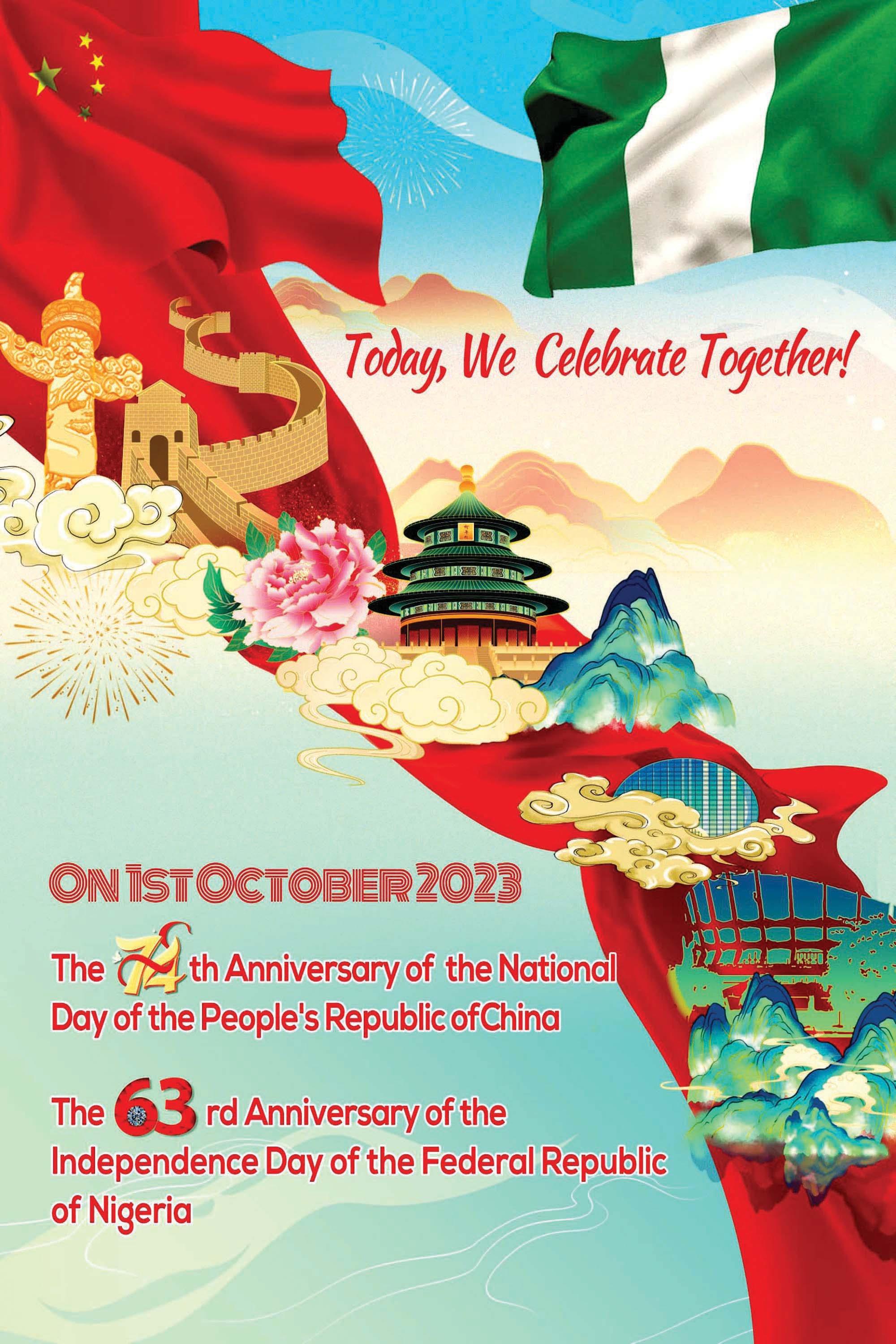
14 SUNDAY OCTOBER 1, 2023 • THISDAY
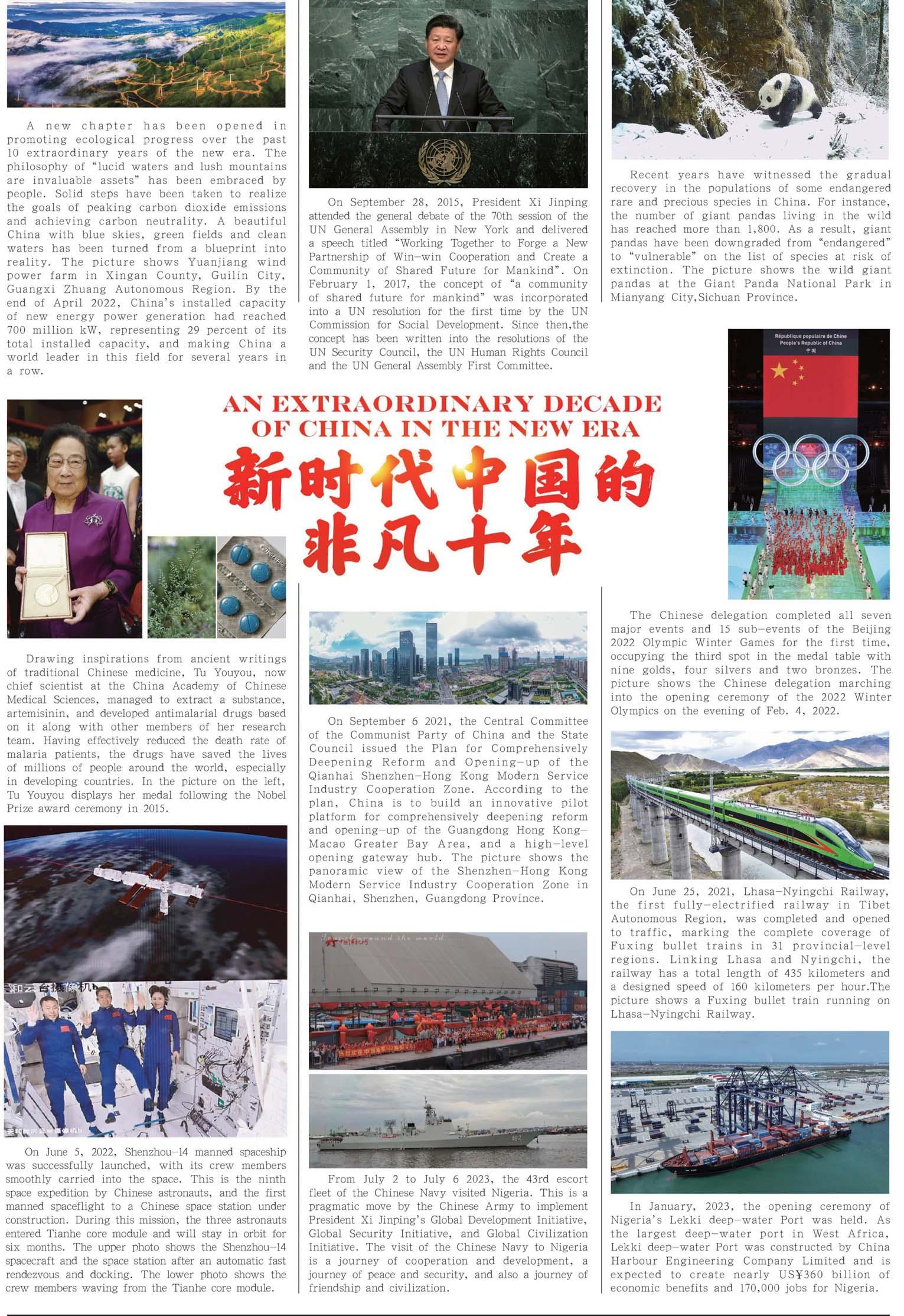
SUNDAY OCTOBER 1, 2023 • THISDAY 15

16 SUNDAY OCTOBER 1, 2023 • THISDAY
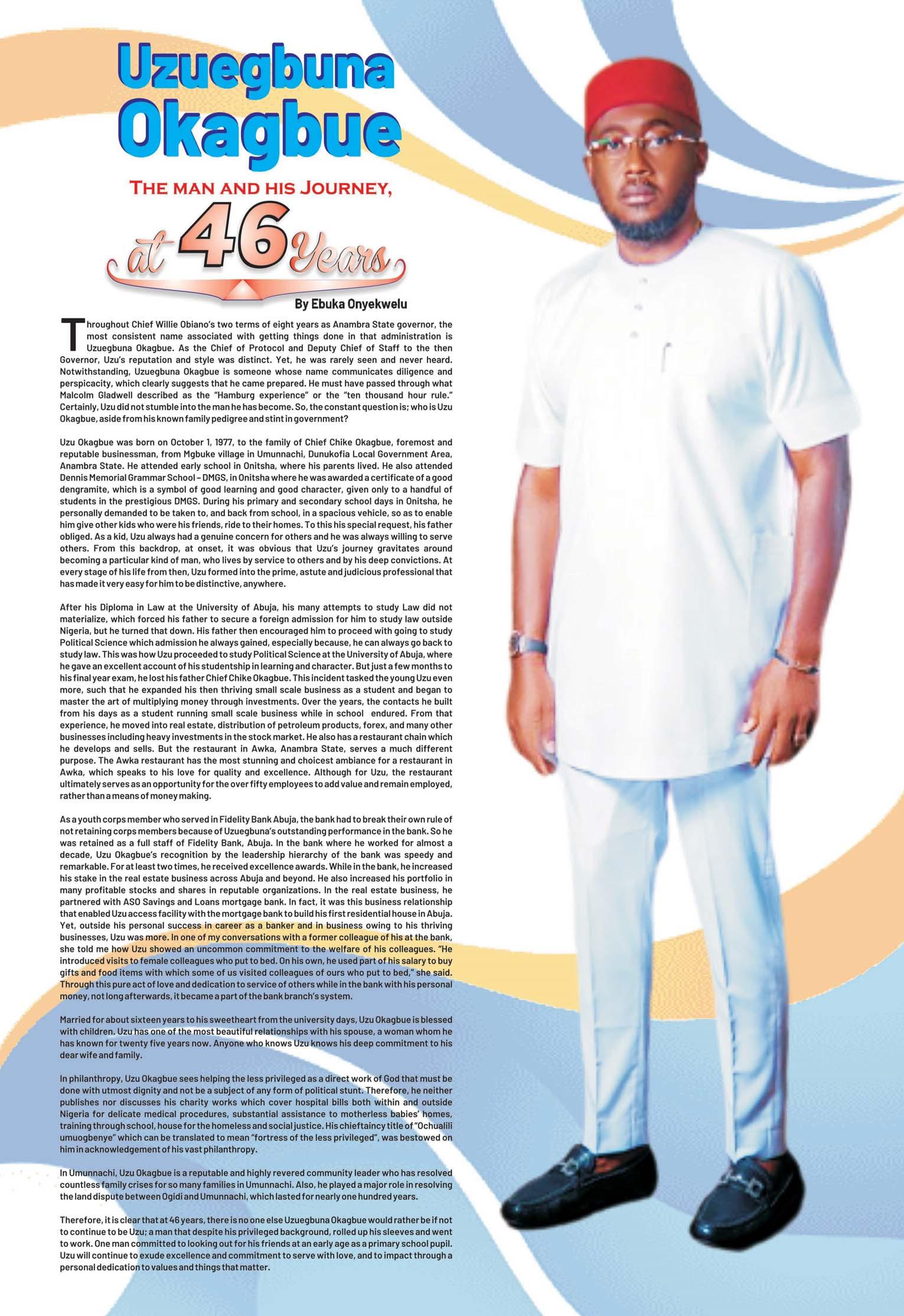
SUNDAY OCTOBER 1, 2023 • THISDAY 17

18 SUNDAY OCTOBER 1, 2023 • THISDAY

SUNDAY OCTOBER 1, 2023 • THISDAY 19
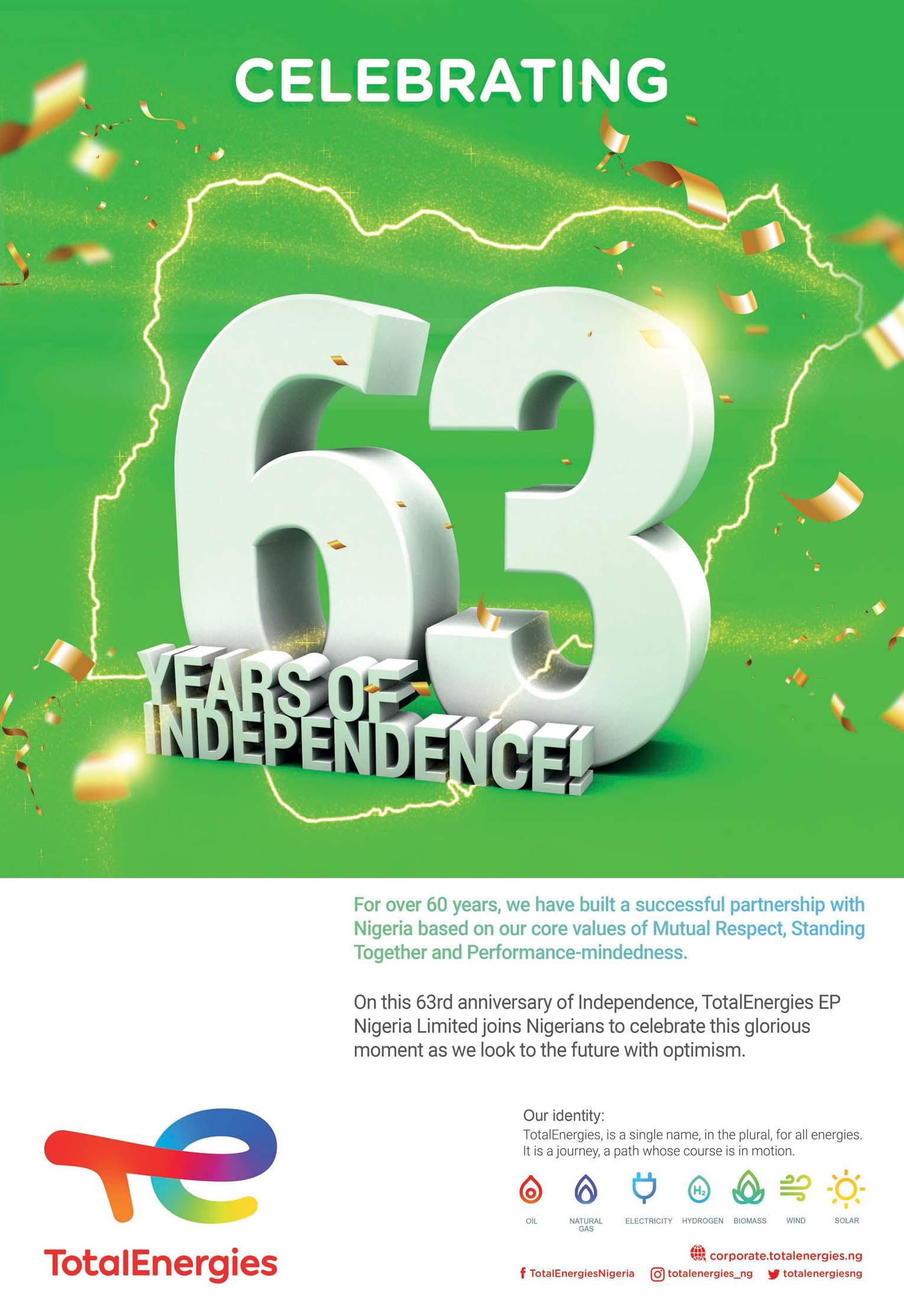
20 SUNDAY OCTOBER 1, 2023 • THISDAY
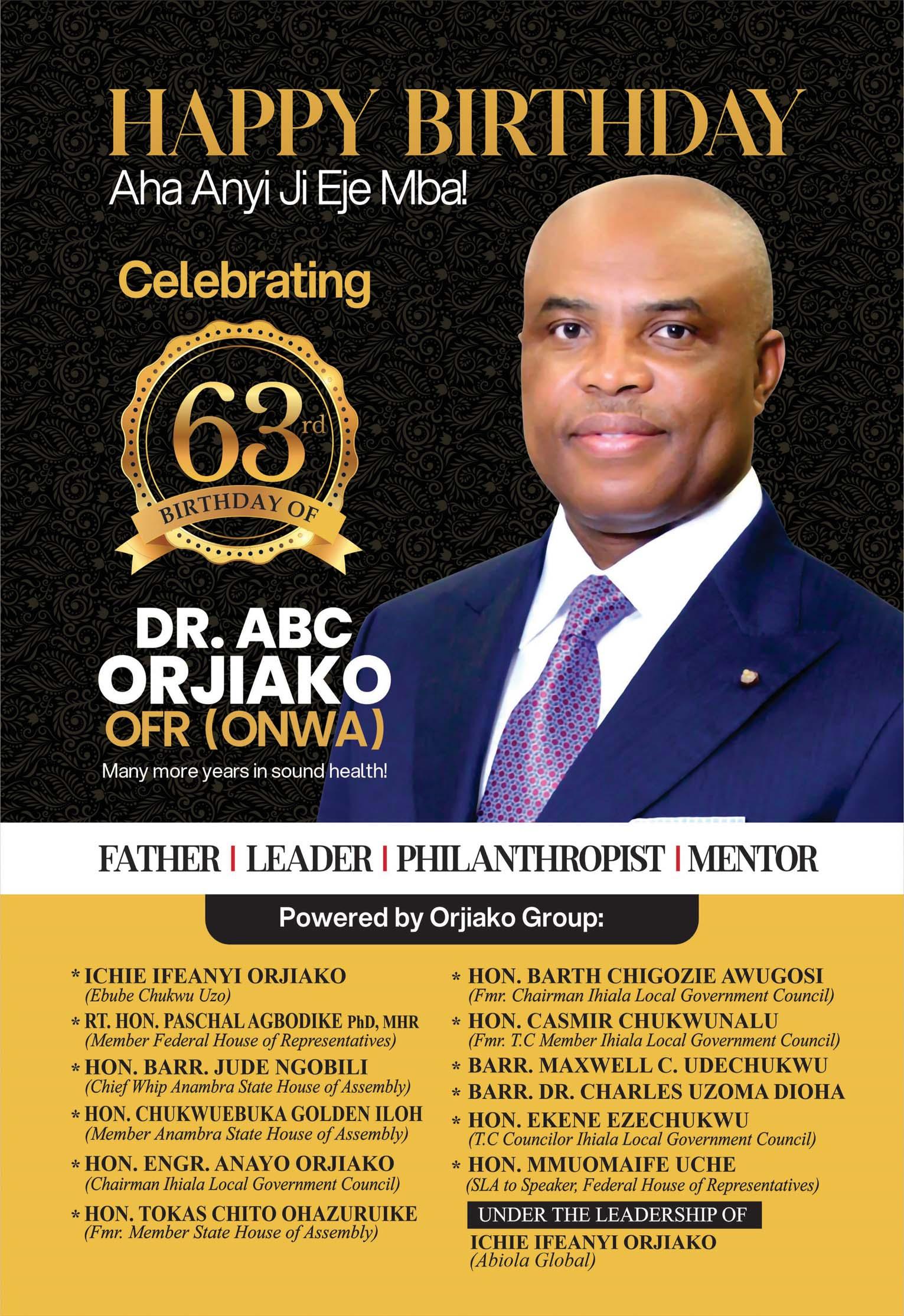
SUNDAY OCTOBER 1, 2023 • THISDAY 21
“I Cannot Come and Kill Myself: Let Me Chop Life Small” (2)
“Everything we own here on earth is only on a lease to us. It would pass on to others when we die. The best decision that the wealthy should make is to remain detached away from the glamour and ego of their wealth and create happiness for themselves, through habitually giving and giving to society’s needy” - My Billionaire Friend
Jesus said to his disciples: “Do not store up for yourselves treasures on earth, where moth and decay destroy, and thieves break in and steal. But store up treasures in heaven, where neither moth nor decay destroys, nor thieves break in and steal. For where your treasure is, there also will your heart be”
-
Matthew 6:19-23
Jesus told him, “If you want to be perfect, go and sell all your possessions and give the money to the poor, and you will have treasure in heaven. Then come, follow me.” But when the young man heard this, he went away sad, for he had many possessions. Then Jesus said to his disciples, “I tell you the truth, it is very hard for a rich person to enter the Kingdom of Heaven - Matthew 19:21-23
Mor.
More than I had anticipated, my article with the above title published in the September 3rd edition of THISDAY has continued to generate interesting feedback. The first to fire the salvo was my very good friend and brother, Mr. Remi Babalola, a former finance minister, who has developed more than a passing interest in my finance-related articles. Indeed, he was the guest speaker at the public presentation of my first personal finance book, The Millionaires’ Capsules at Muson Center, Lagos in 2007. Let me quote him directly:
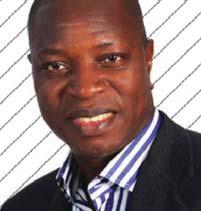
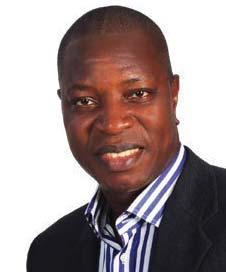
“I just finished your entire article for today, and I have a few points. 1. Anyone following your writing and, on this platform, and yet to write his will or place to be buried has not done justice to your efforts. 2. Your article today is YOLO (You Only Live Once), but I think wealth management doesn’t mean suffering otherwise you have no wealth you are managing. You should eat, dress, go on vacation, and have fun on a normal regular basis while you are managing wealth. The class, style, poise and personality types are matters of individual differences. Why is Warren Buffet living in a 1958 ordinary house and not eating out every day? This topic is very popular among wealth hunters. One of the enlightened USD billionaires in Nigeria living in Ikoyi was building a new top-end residence in Ikoyi to move from his former house where he has been living for over two decades, and I questioned his logic using Warren Buffet’s example. He didn’t find it funny because he felt YOLO. We should adopt the masters in wealth management, which is the Jews’ way of life and attitude to wealth management. But do whatever makes you happy and peaceful, not impress anyone”. We have had interesting conversations on this after that.
On my way to my unit in the church last Sunday, an elderly deacon who happens to be a fan of my column said casually once he sighted me: ”I cannot come and kill myself; you have told us to start chopping life and we shall, God willing”. A few individuals who had read the article had interpreted it as if I was suggesting that they soft pedal on financial planning and start to devour everything! That could not have been my message. For those who did not read, let’s recap the genesis of the commentaries. I had gone on a business visit to a lawyer friend of mine a couple of weeks ago to seek his expert opinion on how to implement a financial planning strategy I had picked from a billionaire friend. I was interested in creating a structure for my finances. My lawyer friend had wondered why I was interested in such complex matters. He suggested that I should concentrate on what I have control over, which is living to the fullest in the present rather than embarking on preparation for a future I had no control over. I had also written in that article on how I moved from
the lawyer friend’s office to a highbrow spa not far from his office to “spoil myself a little”. But I did some reflections on the matter after leaving the spa and I had promised to share my thoughts on the matter in this column. This part two is a fulfilment of that promise.
A long time after I had started the relationship with my billionaire friend, he had volunteered to take me on a tour of his gigantic edifice, occupying almost the whole stretch of a street. The last place he took me to was his bedroom. In that bedroom was his massive bed, covering a sizable portion of the room. He now started to share some interesting stuff with me about his wealth-building principles. Lastly, he asked me to watch as he lay down on the edge of his massive bed. He said that is how he sleeps every night, just to demonstrate and remind himself that despite the enormous wealth he has built through meticulous financial planning, he does not need more than that space. This billionaire friend has also invested a huge amount of money, running into billions of naira in philanthropic endeavours, some of which are not in the public space. I also asked him why he was doing that, and he now elaborated on the principles guiding his wealth-building endeavours as we rounded off our conversation. My billionaire friend also shared his experience about building wealth to give out.
“I cannot tell you per se when I came about this principle about life, but I can tell you that I wrote my will at only thirty-two (32) years of age when I discovered that the whole essence of life is empty and that the little wealth, I had built should go to help those who I would leave behind, my immediate family and my society in general. I thus wrote my will at the age of thirty-two (32), which clearly shows how early I came about this principle of life and living. This principle has very much helped me to be useful to many in Nigeria and outside Nigeria. I have used my little knowledge and resources to help lift many people”. The summary of his message, as he put it, is this: The Essence of Wealth is more important than wealth itself.
My interest in understanding the dimensions of wealth-building dates beyond the current article. I had explained in one of my articles how I had watched the humongous wealth of my former employer, a newspaper mogul of note, vanish not long after his controversial politics-related death. He had possibly worked out elaborate plans of how his children would inherit his publishing empire
and continue the legacy. That did not happen.
A pastor friend who recently relocated to the United Kingdom shared with me an interesting encounter he had while pursuing his new interest in real estate development. A very wealthy Jew, according to him, had left a huge estate for his three daughters with a will to back up how the property, about 45 spread across different parts of the world, was to be distributed. The real estate consultant in charge of the assets had got in touch with the daughters, and to his surprise, none of the daughters was interested in having anything to do with the property. Indeed, they gave the real estate consultant the go-ahead to dispose of the assets and give the proceeds to any charity organisation he considered okay. They didn’t care what he did with the property left behind by their father.
I also got to know last week that one key regret of a Nigerian billionaire is that his only son shunned the elaborate plan he created for him to step into his ICT business empire. He had spent a huge amount of money training his son in the best ICT schools in the world. While he was expecting his son to return to take over the business empire, his son had flung his ICT certificates and branched into an unrelated career. The father had done everything, including monetary inducement, to get the guy to change his mind, but no deal.
A judge in one of the states IN Nigeria who also read my article of last week: ‘Your Mind is the Most Important Assets,’ shared this with me after a conversation on the article: “I shed tears after reading your epic journey through life. I can relate to several things you said. I was called the bar in 1982. The vogue then was to secure a visa, which was relatively easy, then. Many of our mates did so and left, but I asked myself one question: what are you going to America to do? I spent a lot of time on the question but I had no clear answer or pathway. I decided to improve myself and hone my skill in litigation practice by doing pupillage with the legal giants of our time…. I spent 10 years on a monthly salary of 500 naira. l left thereafter to set up my practice, and my seniors referred several cases to me and even involved me in election matters. Our youths are impatient. I have a son with a master’s degree in pharmacy from Aberdeen University. He was doing well here as he is not only a lecturer but runs several pharmacy stores. Lo and beyond, he insisted on the urging of his wife, a Ph.D. holder in pharmacy. My wife and I tried everything to dissuade him, asking him to name his price. Without informing us, he left for the USA. Could you believe he is now a parker
I have also discovered that those who have managed to live on after they are gone perfected the art of replicating themselves in others while they were alive and spending a large chunk of their resources blessing the less privileged and society as a whole. Mother Theresa poured herself into others. She has continued to live on. No street or monument was named after Jesus Christ, yet he has continued to live on.
with Amazon and has cut all communications with us? It’s a tragedy.”
Researching my articles on personal finance, I read pages of biographies of several wealth builders around the world. I had also decided to visit the JD Rockefeller Centre in New York a few years ago. The Rockefeller Center is a large complex consisting of 19 commercial buildings covering 32 acres between 48th Street and 51st Street in Midtown, Manhattan, New York City. I spent one day and a half there. It is a tourist centre as many tourists flood the place to behold the assets left by the man: his tomb, towers, etc. I paid to be conducted around the centre, including riding to the 46th floor of his tower. As I was on the 46th floor, the questions started to flood my mind again. What did he do differently that made his wealth speak after he had long gone?
I came to some interesting conclusions after also consuming the entire Bible in different translations, paying attention to the wealth builders in the Bible.
Jesus’ message in the quotes at the beginning of this article clinched it for me: Here are my key conclusions:
DETACH FROM MATERIAL WEALTH. Jesus, as well as well-recognised spiritual leaders, never suggests people should not build or accumulate wealth. The central message is that we should not attach much importance to them. Anything your eyes can see, anything your hand can touch, anything your mouth can taste, indeed anything your five senses can recognise is temporary, and is subject to change.
WE ARE MERE CHANNELS OF WEALTH DISTRIBUTION
Jesus painted this line in his story of the vine. His message in John 15 is that as branches of the vine, we are to open ourselves to receive as much from the vine, take the much we need and intelligently distribute the rest: Keeping more than is necessary for ourselves leads to spiritual constipation.
POUR YOURSELF AND YOUR WEALTH INTO OTHERS WHILE YOU ARE ALIVE
I have also discovered that those who have managed to live on after they are gone perfected the art of replicating themselves in others while they were alive and spending a large chunk of their resources blessing the less privileged and society as a whole. Mother Theresa poured herself into others. She has continued to live on. No street or monument was named after Jesus Christ, yet he has continued to live on. Bill Gates and Warren Buffet are two billionaire friends who have mastered the art of building wealth to give out.
The essence of this article is captured by what was credited to Steve Job at his deathbed: “I reached the pinnacle of success in the business world. In others’ eyes, my life is the epitome of success. However, aside from work, I have little joy. In the end, wealth is only a fact of life that I am accustomed to.

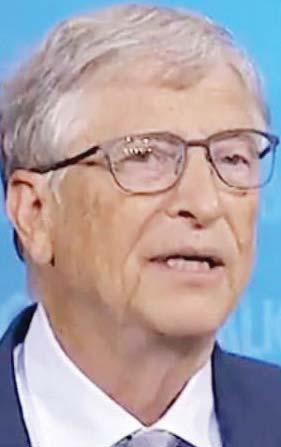
“At this moment, lying on the sick bed and recalling my whole life, I now realise that all the recognition and wealth in which I took so much pride have paled and become meaningless in the face of impending death. In darkness, I look at the green lights from life-supporting machines and hear humming mechanical sounds, and I can feel the breath of the god of death drawing closer…. Now I know when we have accumulated sufficient wealth to last our lifetime, we should pursue other matters that are unrelated to wealth…. The wealth that I have won in my life, I cannot now take with me. What I can take are only the memories precipitated by love…. Material things lost can be found, but there is one thing that can never be found when it is lost – life. When a person goes into the operating room, he will realise that there is one book he has yet to finish reading –the book of healthy life....”
The conclusion of the matter is this: Wealth will mean nothing if it is not used in serving humanity, while the wealth builders would be wise to detach. And who says we cannot chop life small while doing that?
Shalom.
 Bill GatesWarren
Bill GatesWarren
22 THISDAY, THE SUNDAY NEWSPAPER • OCTOBER 1, 2023 SOFT FINANCE INVESTMENT | ECONOMICS | FINANCE | MONEY | E-COMMERCE with AYO AROWOLO ayo.arowolo@thisdaylive.com 08086447494 (sms only) ,
BuffeSteve Jobs

SUNDAY OCTOBER 1, 2023 • THISDAY 23
LOST HOPE OF THE COMMON MAN’
WhenOgbonnayaUkejediedin LagostwodaysafterChristmasDay in 1981, Bode Rhodes-Vivour was a 30year-oldlawyermakinghiswayupthe rungsofpublicserviceintheMinistry ofJusticeinLagosState.Mr.RhodesVivourhadbeencalledtotheNigerian Barameresixyearsearlier,in1975.
In 1989, when Mr. Rhode-Vivour succeeded Nureini Abiodun Kessington as the Director of Public Prosecutions in Lagos State, the case concerning the estate of Ogbonnaya Ukeje was already in its sixth year in the High Court of Lagos. Mr. Ukeje’s daughter, Glady’s, had filed the case in 1983 to challenge her exclusion from a share in her father’s estate merely on the ground that she was female.
In January 1992, Justice Moni Fafiade, who became a judge of the Lagos High Court in 1983, the same year the case originated, delivered judgment in Gladys Ukeje’s case. The case lasted nine years in the High Court alone. Bode RhodesVivour was still a Director in the Lagos State Ministry of Justice.
Two years later, in 1994, when Bode Rhodes-Vivour was appointed a judge of the High Court of Lagos, the appeal by Gladys Ukeje’s family against the decision of the High Court of Lagos in her favour had been pending in the Court of Appeal for two years.
In 2005, five years after the first brief of argument was filed in the Supreme Court Appeal in Gladys Ukeje’s case, Justice Bode Rhodes-Vivour was elevated from the High Court of Lagos to the Court of Appeal. By the following year, in 2006, all the parties had filed their briefs of argument.

Four years later, when Justice Bode Rhodes-Vivour arrived the Supreme Court, after a five-year sojourn on the bench of the Court of Appeal, the Supreme Court appeal in Gladys Ukeje’s case had been pending for over a decade.
On 11 April 2014, 31 years after the case was filed in the High Court of Lagos, 20 years after he was first appointed a judge, and four years after his elevation to the court, Justice Bode Rhodes-Vivour delivered the judgment of the Supreme Court upholding the right of Gladys Ukeje to a share in her father’s estate.
By this time in 2014, Ahmed Lawan was already something of a phenomenon in Nigerian politics. In 1999, Lawan arrived the National Assembly as the member representing the proud people of Bade/ Jakusko constituency of Yobe State in the House of Representatives. He was a member of the All Nigerian Peoples’ Party (ANPP). In 2007, after two terms in the House, Lawan was elected to the Senate by the people of Yobe North Senatorial Zone. In 2019, 20 years after his arrival at the National Assembly and having logged the record for the most durable parliamentary career in Nigeria’s history, Ahmed Lawan became the 14th president of Nigeria’s Senate.
In this capacity, Ahmed Lawan was man in the country. If he desired to extend the duration of his improbable political longevity, Lawan had few realistic options. As the 2023 election season approached, he made his bid for a ticket to the presidency on the platform of the ruling All Progressives Congress (APC), of which he was a was announced on 8 June 2022, Lawan lost out in the contest, coming a distant fourth.
WHAT DOES SHARED NATIONAL DAY MEAN FOR NIGERIA AND CHINA?
OLALEKAN A. BABATUNDE writes that both countries have many things in common including mobility of labour
Eleven days earlier, on 28 May, the APC had organized the primaries for the Senate. In Yobe North, the seat that Lawan occupied in the Senate, the winner of the primaries was Bashir Machina, a rich businessman and politician, who had also served in the cabinet at the state level. However, as soon as the presidential primaries concluded, a concerted effort began to deny Machina the ticket in favour of Lawan.
To forestall this, Machina sued on 22 June 2022 in the Federal High Court in Damaturu, the capital of Yobe State, asking the court to affirm the outcome of the senatorial primaries that he won. Three months later, on 28 September, the High Court rendered judgment. By the beginning of December, the Court of Appeal had also issued judgment, and on World Anti-Corruption Day, 9 December, 2022, the case arrived the Supreme Court. In less than two months, on 6 February 2022, the Supreme Court issued judgment, implausibly declaring Lawan the winner of senatorial primaries that he did not participate in.
This kind of status-indexed shunt granted to political higher-ups like Ahmed Lawan by Nigerian courts is mostly manufactured or enabled by the judiciary. It is now crippling Nigeria’s courts and the irony is that the only people in the position to end it are the ones complaining.
When he inaugurated a cohort of 72 new Senior Advocates of Nigeria (SANs) on 8 December 2021, then Chief Justice of Nigeria (CJN), Tanko Muhammad, reported that 33 or nearly five per cent of the 681 cases considered by the Nigerian Supreme Court during the year were “political cases”. This was a rather a curious category to maintain or report on. Judicial doctrine ordinarily views political cases with reluctance. Nigerian law knows nothing of the sort. It knows of election petitions as are contests over the outcomes of elections, mostly governed by the Electoral Act, which prescribes strict time limits for their disposal. Most likely, this is a category of cases instituted by Nigeria’s politicians seeking to judicialize intra-party squabbles over the spoils of political plunder. Increasingly, it seems, these have become the mainstay of judicial enterprise in the country. Recently, as he swore-in nine newly appointed Justices of the Court of Appeal, current CJN, Olukayode Ariwoola, reinforced the complaint from the judges that “political cases are taking a monumental toll on our dockets.”
Gladys Ukeje and Ahmed Lawan are both Nigerians. One is female, the other is male. The former is from the south, while the latter is from the north.
A lawyer and a teacher, Odinkalu can be reached at chidi.odinkalu@tufts.edu

Today, October 1st, is the National Day of both Nigeria and China. There are significant similarities to highlight and in which both countries need to care for in their relations. While the day marks Nigeria’s proclamation of independence from the British on October 1960, the Chinese is marking their 74thNational Day as the founding of the People’s Republic of China that was proclaimed by Mao Zedong, the Chairman of the Chinese Communist Party (CCP), on October 1, 1949, in Tiananmen Square in Beijing. This predates Nigeria’s independence by 11 years.
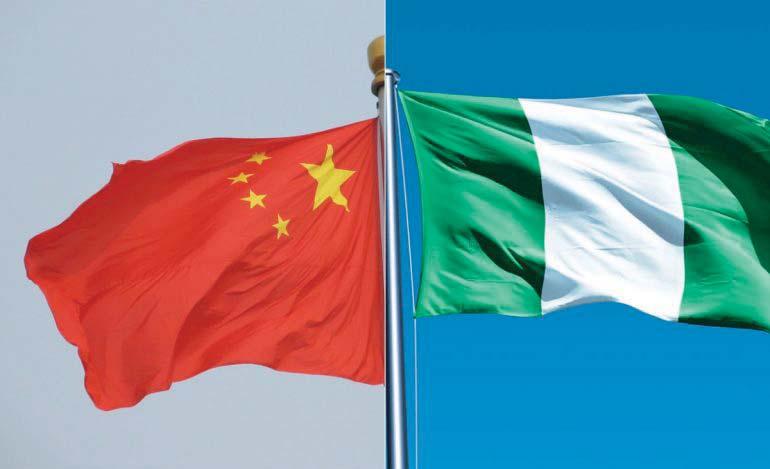
It is a work-free day in both countries, with various spectacular celebrations, deeply rooted in history and tradition. Nigeria often commemorates the day with pomp and pageantry while the first week of October is used to be holiday for businesses to enjoy rest and relaxation in China. Both also recognize and award outstanding personalities especially individuals and groups who helped promote Nigeria-China friendship. Besides the national day, Nigeria and China share many significant moments in the past that have helped to better understand each other and as a significant step towards fostering closer ties that began in 1971. Their commitment to build community of shared future and development has always been guided by their turbulent history. Because of the two countries’ shining potential, external imperialist aggression, invasion, and colonialism in the case of Nigeria, are a few of the inglorious episodes of their encounters in the quest for freedom and nation-building.
They have experienced dramatic shifts in power. Nigeria has had ambitious military juntas who interrupted democratic rules while China saw shifts in power between rival factions and the disintegration of empire through corruption and political subterfuge, and the cyclical rise of ambitious leaders to found new empires. This history has profoundly formed the basis of a trustful acceptance of relationship.
As the Chinese Foreign Minister, Mr Wang Yi said during his visit to Nigeria in January 2021, “As a major African country, Nigeria has always occupied an important position in China’s diplomacy in Africa.” Hence, both have demonstrated mutual understanding, mutual trust and mutual support to their 52-year old diplomatic ties.
As the most populous countries and largest economies in their regions, Nigeria and China have come to understand that it is important to lead the way in multilateral engagements towards making life better for their citizens and humanity in general. Both have exerted their interests and influence in their regions. Their nationals are among the most gifted, astute and dexterous workforce on earth, highly mobile and can be found in all parts of the world engaging in one task or the other. So one can assert that their shared national day dynamics interconnected with their demographics, markets, economies and national aspirations.
In areas of their bilateral and multilateral engagements, both have shared a common narrative and their foreign policy objectives
aligned. Examples are non-alignment groupings and anti-imperialist struggles. They often stand together side by side to oppose hegemonic tendencies either in the United Nations or other multilateral groupings like the FOCAC and Belt and Road Initiative (BRI) because of their common understanding of the global geopolitical threat to developing countries. Nigeria and China take fast and coordinated actions against Covid-19 to curb its spread, and the uproar that followed the alleged mistreatment of some African migrants in Guangzhou in 2020. Nigeria led Africa to mitigate the threat of division and misunderstanding.
In a retrospect of the 52-year old cooperation, Nigeria-China relationship has blossomed over the decades and both are drawing lessons from one another in every area of human endeavour. It is easy to say the relations have been mutually beneficial to both sides. Being a developing country, Nigeria is drawing a lot of opportunities from the world’s second largest economy ranging from manufactured goods, expertise, funding to aid from China and in return, providing suitable business climate as well as a huge source of mineral resources and market for Chinese industries and imports. But on the other side, the day shows the unequal development in both countries. As an industrialized nation, famous for its visionary ideas and groundbreaking infrastructure, China eliminated absolute poverty, and high unemployment while Nigeria is still on the journey to address the challenges.
That is why it is crucially important that amid the celebrations today, Nigeria and China should reflect on their cooperation. Nigeria has a greater role and responsibility in this regard. The day could be a starting point of long-term commitment to pull resources together to transform their annual historical day into a reflection of more strategic cooperation that promises to reduce poverty, hunger, illiteracy, crime, violence and corruption in Nigeria. In the current development paradigm, China should continue to share its lessons and challenges Nigeria can learn from its experience of rapid development. More than national day is at stake if the two countries would not reflect on their cooperation trajectories and uncover more of their bilateral potential and recreate trust to especially wean Nigerians off corruption, poverty, illiteracy, disease, violence and poor governance. In a time of global toxic leadership and enormous challenges, Nigerian and Chinese leaderships should listen more to each other and be guided by moral responsibility. Fortunately, President Bola Ahmed Tinubu will soon visit Beijing to strengthen the relations and attract investment.
Dr Babatunde is a Fellow at the Nigeria’s Institute for Peace and Conflict Resolution, and a Part-time Professor at the Zhejiang Normal University in China
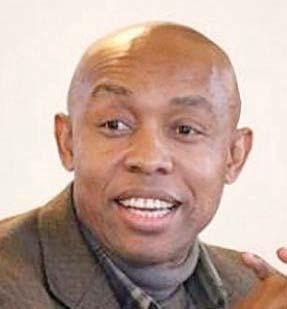
24
SUNDAY OCTOBER 1, 2023
THISDAY
‘THE
Nigeria’s judiciary sustains a twotrack judicial system as it puts the interests of politicians above those of the citizens, contends
CHIDI ANSELM ODINKALU
PETER ISHAKA
NIGERIA AT 63: RETHINKING GOVERNANCE
There is urgent need to trim the cost of governance
Despite recent measures that have pauperised majority of Nigerians, remains the name of the game of government. With the long convoys of vehicles that accompany government functionaries around town, the jumbo expenditure on consumption in various government houses and a plethora of political appointees, most of them with no clear or meaningful schedules, there are groans about the expensive nature of our democracy. Therefore, as Nigeria marks its 63rd independence anniversary today, albeit with a sense of foreboding, of the things that are keeping the country down. We make these observations against the background of the following the recent fuel price hike, and merging of the exchange rates. We see, instead, an ever-growing number of idle public by the president and governors purely for political seems to be growing starting with President Bola Ahmed Tinubu who has appointed 47 ministers into his cabinet aside from countless other aides. The same indiscipline is being replicated by governors. Just two days ago, the Kano State Governor, Abba Kabir Yusuf appointed 116 more special assistants, senior special assistants and personal assistants, 48 hours after appointing 94, bringing the list to 406 aides. Some governors have more than a thousand such aides.
with transparency. It is estimated that the costs of the renovations will be between N3 and N5 billion.” Instructively, the entire state is sharing N2 billion as palliative to cushion the effect of fuel subsidy removal!
Whatever may be the misgivings of some citizens over certain issues, Nigeria has come a long way as a nation. All our citizens must now look beyond primordial considerations and artificial differences to collectively fight poverty, ignorance and underdevelopment. There is a lot to gain from harmonious living
As home to about one out of every four black persons on earth, the abundance of human resources in the country is not in doubt. Even the enemies of Nigeria do not deny its social and economic potential, despite the generations of waste and abuse it has so far experienced. But there is a structural challenge that holds us back. The counter-veiling mechanisms that ensure some level of accountability at the centre are either non-existent or too weak in the fragmented units. The logical result is that the promise of good governance is delivered almost always in the breach. Over the years, revenues innovation and continue to limit accountability. While states and local governments seek oil-rents and jeopardise internally generated revenue, successive national governments have also not adequately used oil revenue to lift the ordinary Nigerian out of poverty. Rather, and in addition to rent-seeking, these revenues have served as slush funds and continue to enrich a few individuals. In the process, Nigerians continue to be ranked among the poorest people in the world.
This huge drain on public resources has been taken to another height in Cross River State, where the main priority of Governor Bassey Otu is to spend
MOMODU, PETER IWEGBU, ANTHONY OGEDENGBE DEPUTY DIVISIONAL DIRECTOR OJOGUN VICTOR DANBOYI SNR. ASSOCIATE DIRECTOR ERIC OJEH ASSOCIATE DIRECTOR PATRICK EIMIUHI
value and appeal to investors,” Otu said to justify his decision to expend huge public resources for his
CONTROLLERS ABIMBOLA TAIWO, UCHENNA DIBIAGWU, NDUKA MOSERI DIRECTOR, PRINTING PRODUCTION CHUKS ONWUDINJO TO SEND EMAIL: first name.surname@thisdaylive.com
Letters to the Editor

We therefore call on the federal government and the 36 states to begin to cut down on the waste that is now associated with government. We suggest a review of government spending and, even more importantly, a rethink of the cost of maintaining being wasted can be deployed to areas of pressing challenges both at the federal level and in the states. some citizens over certain issues, Nigeria has come a long way as a nation. All our citizens must now and underdevelopment. There is a lot to gain from harmonious living.
We wish Nigeria Happy 63rd Independence Anniversary.
Letters in response to specific publications in THISDAY should be brief(150-200 words) and straight to the point. Interested readers may send such letters along with their contact details to opinion@thisdaylive.com. We also welcome comments and opinions on topical local, national and international issues provided they are well-written and should also not be longer than (950- 1000 words). They should be sent to opinion@thisdaylive. com along with the email address and phone numbers of the writer
LETTERS
NIGERIA AT 63: PAIN WITHOUT END

At 63, it is not yet Uhuru for Nigeria, a wellendowed heterogeneous nation-state, which is a nation of nations. The many different kingdoms, which were amalgamated to become Nigeria, had existed for many centuries under precolonial governments. And they had orderly succession of governments, throve in trade, and excelled in arts and crafts. The plundered artefacts of the ancient Benin kingdom, which were taken to Britain, bear testament to the fact that the people of Benin were adept in the area of arts and crafts.
However, Nigeria, like other African countries, experienced colonial rule for many years, which hindered the growth of her indigenous arts and crafts and stultified the evolution of her precolonial governments. Britain, which was our colonial master, welded disparate ethnic entities together, and christened the geographical space they occupy Nigeria. Britain which ruled Nigeria for many years introduced democracy to us.
Nigeria became a politically independent country in 1960; however, 63 years after she had
become a sovereign nation-state, she has not realized her potentialities. For all her immense human and material resources, she still brings up the rear on the global ladder of national development. Although she is called the giant of Africa, she is a giant with the feet of clay.
The stark and indisputable fact is that there is a connection between national development and purposeful political leadership. A national leader who has fealty, probity, political cum economic ideologies, and leadership qualities can envision the type of country he wants; and he will work assiduously for the realization of his goal. Asian have overtaken Nigeria in diverse areas of national development because they have good political leaderships.
Nigeria, an underdeveloped country, has not got her politics right for diverse reasons. The departing British imperialists, who sowed the seed of the political culture of imposition of leaders on the populace, clandestinely helped Alhaji Tafawa Balewa to become our Prime
who was not the political better of his political contemporaries like Nnamdi Azikiwe and Obafemi Awolowo frittered the opportunity given to him to take Nigeria to the acme of economic and technological development.
Under his watch, the western region slipped into political crisis owing to the personality clash that ensued between Chief Obafemi Awolowo and Akintola. It snowballed into the January 15, 1966 coup and the July 1966 counter-coup, which led to the 30-month Nigeria-Biafra fratricidal civil war. The civil war raged between 1967 and 1970 and caused the wastage of millions of human lives and the depredation of our economy.
And the military regimes that ruled Nigeria between 1966 and 1978; and between 1983 and 1998 caused the ruination of our economy, the stagnation of our technological development, and the deepening of our national disunity. Those military rulers who ruled Nigeria at different periods of her chequered history
smothered the evolutionary trends of our variant of democracy.
Happily, now, Nigeria has been enjoying democratic rule since 1999, uninterruptedly, with one political party at the centre handing the baton of political leadership to another political party. The change of political leaderships we had in Nigeria since the inception of the fourth republic did not result in political conflicts, although the past presidential elections we had since 1999 fuelled electoral litigation in the courts.
So the orderly and peaceful succession of civilian governments in Nigeria seems to be the only gain we have had from our practice of representative government since 1999. Our democracy is still trapped in the inchoate stage because we have an egregious variant of democratic culture that is characterized by imposition of leaders on the populace.
Chiedu Uche Okoye, Uruowulu-Obosi Anambra State
Editor, Editorial Page
Email peter.ishaka@thisdaylive.com EDITORIAL
THISDAY SUNDAY OCTOBER 1, 2023 2023 SUNDAY NEWSPAPER EDITOR DAVIDSON IRIEKPEN DEPUTY EDITORS FESTUS AKANBI, EJIOFOR ALIKE MANAGING DIRECTOR ENIOLA BELLO DEPUTY MANAGING DIRECTOR ISRAEL IWEGBU CHAIRMAN EDITORIAL BOARD OLUSEGUN ADENIYI EDITOR NATION’S CAPITAL IYOBOSA UWUGIAREN THE OMBUDSMAN KAYODE KOMOLAFE THISDAY NEWSPAPERS LIMITED EDITOR-IN-CHIEF/CHAIRMAN NDUKA OBAIGBENA GROUP EXECUTIVE DIRECTORS ENIOLA BELLO, KAYODE KOMOLAFE, ISRAEL IWEGBU, EMMANUEL EFENI DIVISIONAL DIRECTORS SHAKA
49
Cardoso Swings into Action After Sterling Performance at Screening
Given the slant of most of the reviews of the sterling performance of Dr. Olayemi Cardoso at the screening by the Senate last week, there is no doubt that the new Governor of the Central Bank of Nigeria came well prepared for the job.
Observers said, right from his entry into the hallowed chamber of the National Assembly, Cardoso did not leave anyone in doubt about his maturity, comportment, mastery of the nation’s financial sector as well as his humility and his regard for constituted authorities.
For a Central Bank said to have lost focus, one will certainly not be surprised at the wisdom of President Bola Tinubu to headhunt a tested player whose temperament is capable of dousing the tension created by some missteps of the previous holder of the office.
Recently, President Tinubu announced to the world that the apex bank was to undergo a comprehensive forensic report as part of reforms of the bank. Analysts said the depth of the rot amid weighty allegations of impropriety informed the choice of the new CBN Governor. It was therefore not surprising that the Senators were ready to subject Cardoso and his four deputies to serious scrutiny on Tuesday when they appeared for screening.
Fixing Corporate Governance Issues in CBN
The high point of his pledges to Nigerians at the screening was the promise to enhance transparency, fix corporate governance, and ensure confidence in the autonomy and integrity of the bank.
“We need to promptly find a way to take care of that. It would be naive for us to expect that we’ll be making too much progress if we’re not able to handle that side of the foreign exchange market,” he said.
The new CBN governor said he would maintain price stability, revert to evidence-based monetary policies, and discontinue his predecessor’s unorthodox monetary policies to bolster the country’s naira currency.
Treating all the questions thrown at him with caution, humility, and brilliance, Cardoso, a former chairman of Citibank Nigeria assured the lawmakers that breaches of the CBN Act as recorded by his predecessors would not be the case under his administration. To the admiration of the senators, Cardoso also promised that his administration would inculcate a culture of compliance into the apexbankbyadheringstrictlytotheCBNAct2007.
“I believe that the Central Bank under our watch will have no choice but to embrace a culture of compliance,” he assured the Senate while responding to questions at his and four deputy governors’ screening.
Zero Tolerance for Abuse of Compliance
Regarding some of his predecessors breach-
ing legislation, Cardoso, who was also a former Commissioner in Lagos State assured the lawmakers that “you won’t have that during our administration,” adding that his team would not tolerate such behaviour.
“We will not wait for oversight to come and tell us what to do. We will ensure that by the time the system is passing through us, we catch it and we deal with it,” said Cardoso who promised zero tolerance for abuse of compliance.
“That is a cultural shift, a change in mindset, but we will make sure it happens,” he asserted.
At a point, Senate President Godswill Akpabio had asked Cardoso if he would be influenced and hijacked by politicians when he assumed office.
Responding, the CBN governor said, “It is important that we, who are considered for this position today, understand that this is a position of trust.
“With that comes a huge responsibility to meet up with that trust. I know that a lot of time and effort has gone into choosing the people who are standing here for nomination today.
“As far as I am concerned, under my leadership, we will not be hijacked by anybody. The idea is to ensure that we do what is right when it is right, and how it is right. We’ve seen what the effect of not doing right has been, and we do not intend for that to be repeated.”
Tounderscoretheseriousnessofhisnewassignmentandhisresolvetomakeadifference,Cardoso on his X platform on Wednesday reiterated his commitment to ensuring that the leadership of the organisation will work to regain the trust and integrity of the apex bank.
For Nigerians who appeared to have lost hope
in the economy as a result of the current distortions, Cardoso said the CBN will be repositioned to grow the size of the Nigerian economy to an ambitious value of $1 trillion in Gross Domestic Product (GDP) in the next eight years.
He also vowed to embrace a culture of compliance and internal control of commercial banks, halt the continuous fall of the Naira in the foreign exchange market, and tackle the rising inflation rate.
As a man who knows his onions, the new CBN Governor emphasised the need to restore the apex bank’s independence and credibility by refocusing on its core mandate and ensuring a culture of compliance.
No Distractions
One of the issues that bothered Nigerians about the activities of the immediate past management of the CBN was its foray into virtually all the sectors of the economy, a development blamed for most of the missteps of the past. The CBN was said to be competing with other agencies of government with the funding of other sectors.
To a brilliant financial guru, the concern and the anxiety of the lawmakers over this subject matter was cleverly used to warm himself into their hearts by pledging that the apex bank under his leadership would be focused and would not be distracted.
He said, “Much has been made of past CBN forays into development financing such that the lines between monetary policy and fiscal intervention have become blurred. In refocusing CBN to its core mandate, there is a need to pull the CBN back from direct development finance
interventions into more limited advisory roles that support economic growth.”
Another source of worry is the rising inflation which surged to 25.80 per cent last month, 1.72 per cent points higher than the 24.08 per cent recorded in the previous month. The increase reflectstheimpactoftheremovalofpetrolsubsidy and the devaluation of the official exchange rate on consumer prices.
On addressing the rising inflation, Cardoso noted that the new CBN leadership would “adopt an evidence-based monetary policy and shall not be making decisions based on a whim.”
Cardoso said there are short-, medium--, and long-term measures to address the worrisome foreign exchange rate, dimension of inflation, and deficit financing. He said there is a need to have a stable exchange rate if Nigeria must be prosperous, adding that the measures will include economic diversification and operations such as ensuring rules that are open and transparent for foreign direct investment.
“There are two very important issues that we would have to address. It is an operational issue. Right now, you have a situation about the figures. We are aware of unsettled obligations by the CBN. The immediate priority is to verify the authenticity and extent of what it holds; once we do that we need to promptly find a way to take care of that.
“It will be naive for us to expect that we will be making too much progress if we are not able to handle that side of the foreign exchange market. We cannot reasonably expect serious foreign direct investors or portfolio investors and now we are talking about short-term term in place. We cannot expect that those players who generally have an impact on our market will do so if we do not have an open and transparent system that everybody understands and can rely on, not subject to review without any notice,” he said.
The new CBN Governor and former chairman of Citibank Nigeria is a distinguished leader in the financial and development sectors with over 30 years of experience in private, public, and not-for-profit organisations. With diverse corporate governance experience, Cardoso has also sat on the boards of Nigerian subsidiaries of Texaco and Chevron and chaired the board of EFInA, a financial sector development organisation supported by the Bill and Melinda Gates Foundation. He served in government as the first Commissioner for Economic Planning and Budget for Lagos State, where he championed the financial reform process thatW led to the state’s development of independent tax revenues.
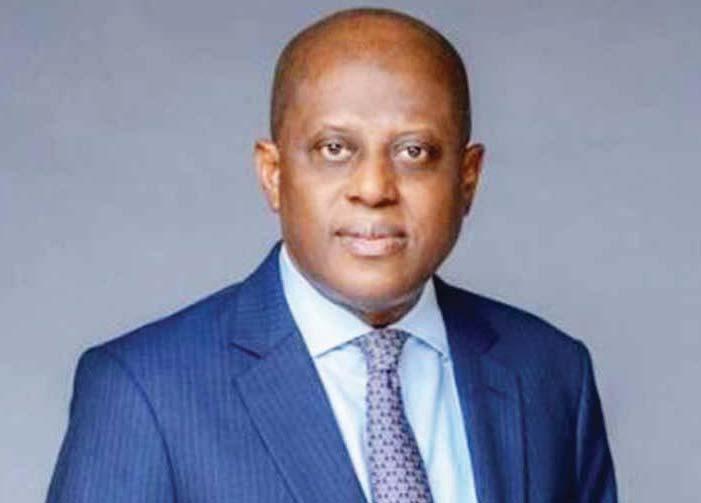
Cardoso introduced significant reforms during his tenure that improved the state’s financial autonomy and tax revenue generation. His visionary leadership paved the way for economic growth and transformation in Lagos. He also spearheaded initiatives such as the Medium-Term Expenditure Framework (MTEF), Security Trust Fund, and Public-Private Partnerships (PPP).
FG Begins Verification of National Social Register
TheMinisterofHumanitarianAffairs and Poverty Alleviation, Dr. Betta Edu, yesterday flagged off the federal government’s verification of the National Social Register in Makoko, Lagos State.
According to the minister, the exercise will ensure that the federal government’s social register is accurate and captures the people who deserve to be on the register.
Edu said she was in the community to flag off the Social Register verification for the Vulnerable People Living in the Makoko Area of the state.
She said: “We are here today in the Makoko area of Lagos state because President Bola Tinubu has asked us to come here and verify the National Social Register.
“The president desires to ensure that the social register is accurate and indeed captures the people that deserve to be on that register.
“The Federal Government of Nigeria is trying to put monies in the hands of Nigerians.
“This is to assist them in terms of their businesses, livelihood, job creation, of course, to help them afford basic things like sending their children to school and ensuring that they can access to quality health services.’’
“For us to do this, we need to verify the National
Social Register.”
According to the minister, the president is determined to ensure that those on the national social register are truly poor and live under one dollar per day.
The president has approved that we go down to the grassroots and ensure that the national social register is a true reflection of people who are poor, who live under one dollar a day, and people who live in remote areas and areas that truly need help.
“Those who should not be on the register should be removed. Those who need to be on the register should be included.
“And so, we are taking this as one of the samples.
We are doing both the community targeting and geographical targeting.
“This is our first sample and we have gone round and we have seen that certain aspects of the Makoko was covered under the national register.
“However, the last area that we came for was not reflected on the national social register and so, we will be coming back to do a targeted capturing of the people in this area,” Edu said.
She also said that the exercise would be carried out across the country to ensure that a National Social Register in Nigeria has integrity.
“We will work with the governors, we will work with the states, we will work with the local governments and we will work with the community heads.
50 THISDAY, THE SUNDAY NEWSPAPER OCTOBER 1, 2023
PERSPECTIVE
Cardoso
NEWS
Ugo Aliogo
Peter Uzoho
The Sunday Newspaper October 1, 2023
Looking into the Future with Hope Prologue
Davidson Iriekpen
Today marks Nigeria’s 63rd Independence anniversary, and once again, the federal government has opted for a low-key celebration, acknowledging the persistent economic challenges facing the country.
Celebration of independence anniversaries or national days is in honour of the resilient spirit of citizens and leaders who championed various causes in the pursuit of their nation’s freedom and liberty.
When Nigeria’s journey began on October 1, 1960, everything appeared promising as politicians showed commitment, the economy thrived, and the people were patriotic. However, over the years, political and military leaders fell significantly short of expectations. A coup in January 1966 punctured the dream and the counter coup in July of the same year jeopardised national unity. It was followed by three years of a pointless bloodbath in the form of civil war, with brothers pitted against brothers.
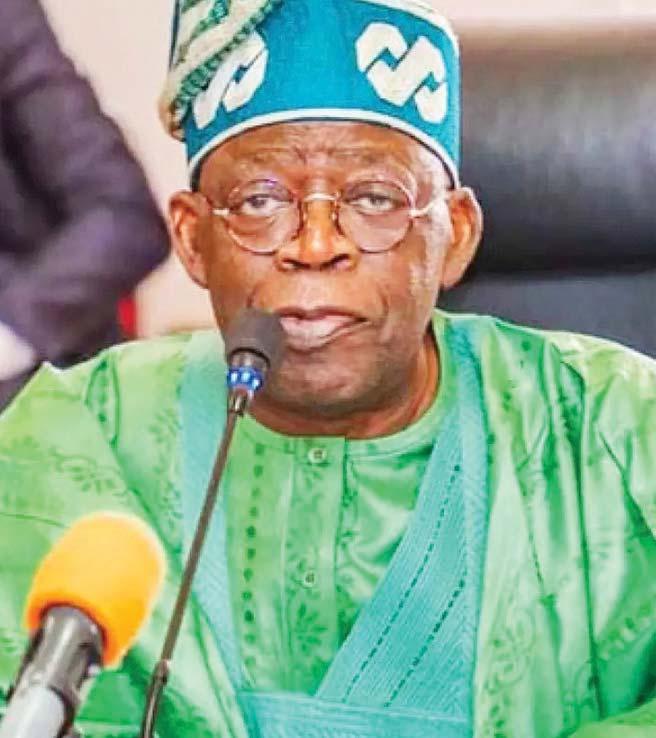
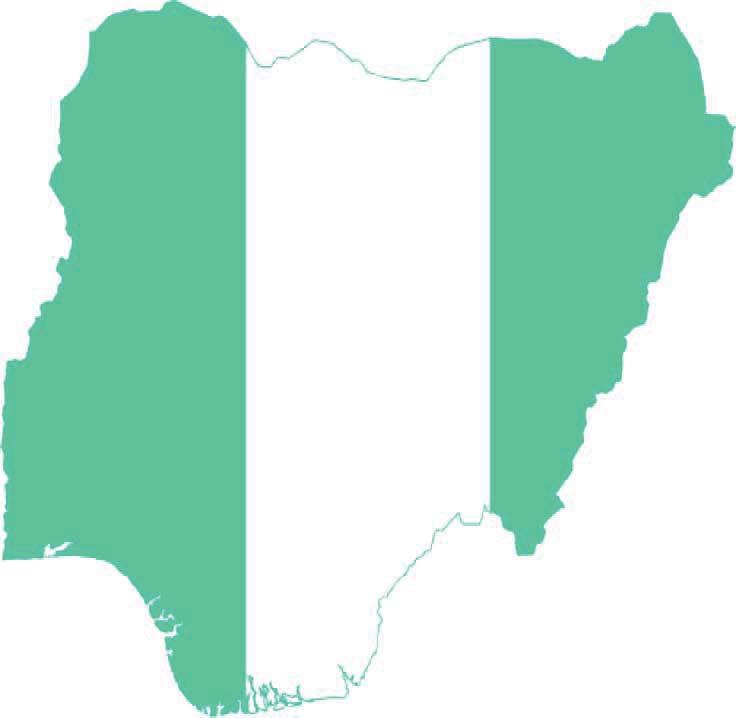

Since the end of the war, the country’s history has been chequered with a tapestry of ups and downs. Nigeria has seen 17 heads of government, including military leaders and democratically elected presidents since the end of the war. However, the once-cherished vision of breaking free from the colonial legacy appears elusive, as improvements in infrastructure, economic growth, and the overall quality of life for the average Nigerian remain a distant goal.
The Nigeria we see today often feels distant from the dreams of the nation’s nationalists who passionately championed the cause of independence.
Their vision was of a free and united nation, free from external influence.
The present-day circumstances starkly illustrate the vast gap between the aspirations of those who fought for independence and the everyday lives of Nigerians.
This situation has shown no significant improvement even after Nigeria’s return to democratic rule in 1999.
Governance challenges continue to plague Nigerians, serving as a persistent source of frustration. It often appears that those in positions of power lack genuine concern for the welfare of the masses, as many of their policies appear to primarily benefit the ruling class.
From the foregoing, there is little cause for optimism as Nigeria grapples with escalating insecurity amidst political instability. With an estimated population surpassing 220 million, the nation finds itself besieged by insurgency and a pervasive sense of insecurity. Regrettably, Nigeria has become one of the most precarious places to live and work. As a consequence
of this crisis, the World Bank has projected an increase in the poverty headcount rate, from 42.0 per cent in 2020 to 42.6 per cent in 2023, indicating that the number of impoverished individuals rose from 89.0 million in 2020 to a projected 95.1 million by the end of 2023.
Poor governance stands out as the primary factor behind the country’s severe economic challenges. Despite the significant resources that accrue from crude oil revenue and loans, Nigeria continues to grapple with a critical infrastructure deficit.
Another pressing concern is the scarcity of job opportunities as the available job openings in the country are woefully insufficient when compared to the annual influx of graduates from higher education institutions.Today, many employed individuals falsify their ages in order to retain their positions, making it increasingly difficult to welcome new talent.
High poverty levels, social unrest and high inflation have also taken a toll on many households’ welfare, as prices have increased on household essentials, especially between 2020 and 2023.
In addition, inadequate power supply has disrupted social and economic lives of the people. With the removal of petrol subsidy and the attendant exorbitant price of the product, businesses that used to find an alternative in petrol to power their generators cannot do that anymore.
With the volatility of global oil prices and the inherent risks of depending solely on this resource for revenue, which the government has acknowledged, the imperative of diversifying income sources has become increasingly apparent. Nevertheless, this diversification journey is fraught with challenges, including the pressing need to bolster tax collection, attract foreign investments, and foster growth in sectors such as agriculture, manufacturing, and technology. All of this unfolds against the backdrop of mounting national debts, posing complex dilemmas for the nation’s economic future.
Agriculture and manufacturing, which were once the pillars of Nigeria’s economy, now struggle for survival. While insecurity has become a headache, the naira, a symbol of our nationhood, lies in tatters.
All these combined have made the country to earn the title of the world’s poverty capital, with over 100 million people grappling for survival.
Interestingly, amid the backdrop of suffering, the resilient people, victims of failed leadership, are managing to muster a smile, while clinging to hope for brighter years ahead.
C
VER
Nigeria @ 63... Nigeria @ 63... Nigeria @ 63...
As It was in the Beginning
WWith the number of election-related killings in the build-up to the 2023 general election, the widespread violence that characterised the elections and Nigeria’s dependence on only crude oil as against the diversified regional and competitive economies built by Dr. Nnamdi Azikiwe, Chief Obafemi Awolowo and Sir Ahmadu Bello, many in these great nationalists would be turning in their graves as the country’s electoral and economic fortunes diminished.
Azikiwe, Awolowo and Bello built the foundation for politics and democracy anchored on principles, rule of law, as well as fair and free competition.
When Azikiwe returned to Lagos in 1937, he founded the West African Pilot to promote nationalism in Nigeria.
Also, his Zikist Group established newspapers in major cities throughout the country.
His efforts on nationalism paid off as he was elected to the Legislative Council in a Lagos municipal election on the platform of the National Democratic Party, an arm of the National Council of Nigeria and Cameroons (NCNC), which later became the National Council of Nigerian Citizens, between 1950 and 1953.
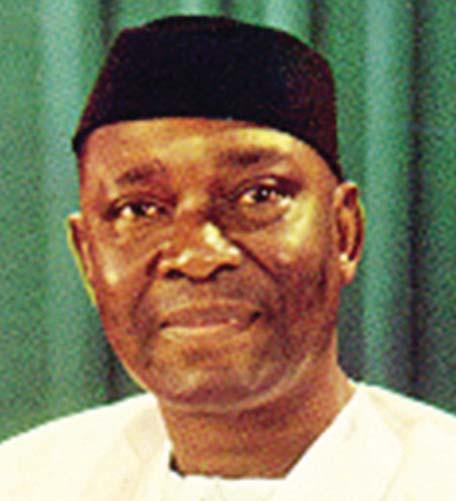
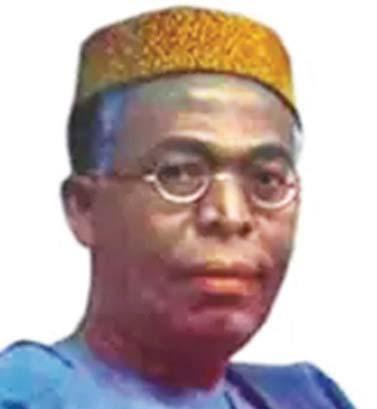
When Awolowo’s Action Group (AG) claimed that the NCNC was being dominated by Azikiwe’s ethnic group, the loyalists of Azikiwe always reminded them that the party “was founded in Yorubaland by the Yorubas” and “its first leader, Herbert Macaulay, was a Yoruba man.”
Azikiwe successfully led Nigeria’s struggle for independence.
He first led the NCNC into the important 1959 federal elections, shortly before independence.
While Azikiwe was a strong advocate of nationalism and independence, Awolowo was also an influential apostle of federalism and independence.
Awolowo’s progressive views on social welfare earned him respect nationally.
On his part, Bello, had in the 1959 elections led his party, the Northern People’s Congress (NPC) to victory.
The NPC party forged an alliance with Azikiwe’s NCNC to form Nigeria’s first indigenous federal government.

NCNC eventually won Nigeria’s independence from Britain in 1960.
Though Bello made immense contributions to Nigeria’s independence, many believe that his greatest legacy was the unification of the diverse tribes in the north.
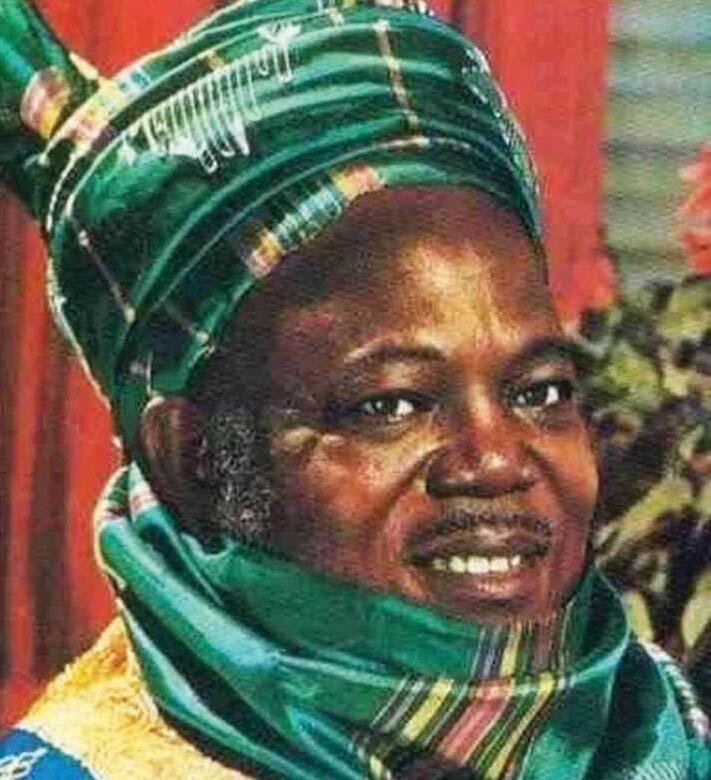
Unfortunately, successive political leaders have failed to build on the efforts of these three great nationalists, as nationalism ended with their era.
The nationalists were replaced by ethnic and religious leaders, who wage religious and tribal wars across the country to advance their political interests.
Free and fair economic competition by the three regions that made up Nigeria has been replaced with war for ethnic and religious supremacy.
Part of the implication is that 70 years after Azikiwe’s historic election victory in Lagos, many residents of the state from other parts of the country were prevented from voting in the 2023 general election.
Sixty-three years after independence, Nigerians are still being discriminated against as non-indigenes across the country.
While competent Nigerians contest and win major elections in the United States, United Kingdom and other advanced democracies, Nigerians are still being denied the opportunity to cast their votes in their fatherland on account of their states of origin and their political choices.
Since the demise of Azikiwe, Awolowo, and Bello, Nigeria’s efforts to build an enduring democracy have always ended with the attainment of civilian rule, which does not represent democracy.
With the number of lives lost in the successive general election in the country where some of the candidates manipulated the courts to validate the results of fraudulent polls, many political scholars believe that bloodless military coups in other African countries, which are widely accepted by the people, are more democratic than Nigeria’s elections.
Reacting to the deaths in the last elections, a prodemocracy think-tank, CDD had claimed that a total
of 109 election-related deaths were recorded across Nigeria in the build-up to the 2023 general election.
The organisation said its tracker recorded the deaths between January 1, and March 10, 2023, according to a statement by its CDD’s director, Idayat Hassan.
Similarly, a report by the election violence monitoring and mitigation group under the aegis of Kimpact Development Initiative, a civil society organisation, had also claimed that a total of 238 violence and 28 deaths were recorded during the 2023 general elections.
Executive Director of KDI, Bukola Idowu disclosed in a report on the 2023 elections that while a total of 98 of the total violence occurred during the February 25 presidential election, 140 were reported during the March Governorship and State House of Assembly polls.
The report titled, “The Quest for Peaceful election: The report and documentation of KDI’s 2023 general election security interventions and assessments,” was prepared with support from the National Endowment for Democracy and International Republican Institute (IRI).
As elections became increasingly violent and fraudulent, voter apathy on election day also set in, despite the increasing willingness of more Nigerians to register as potential voters.
For instance, the number of registered voters increased from 57.94 million in the 1999 general election to 60.82 million in 2003, 61.57 million in 2007, 73.53 million in 2011, 67.42 million in 2015, 84 million in 2019 and 93.46 million in 2023.
Of the 93,469,008 registered voters in the 2023 general election, 87,209,007 – 93.3 per cent– collected their Permanent Voter Cards (PVCs), making them the only ones eligible to vote in the elections.
However, only 24,025,940 registered voters came out and voted in the February 25, 2023 presidential election out of the 87,209,007 voters that were eligible to vote.
As elections became increasingly fraudulent and hotly disputed, the number of election-related cases in courts also rose, putting pressure on judges.
An apparently worried President of the Court of Appeal, Justice Monica Dongben-Mensem, had recently expressed worries over the negative impact of election cases both on the judiciary and the nation’s economy.
Dongban-Mensem, who disclosed that a total of 1,209 petitions were filed against the conduct of 2023 general election, regretted that the time spent by judges on hearing electoral disputes would have been used to settle other issues of economic and developmental values.
The appellate court president appealed to politicians to cultivate the spirit of good sportsmanship, stressing that all elections need not end in the courts.
With the country’s efforts to build enduring democracy failing, the country’s economic fortunes are also declining with many state governments unable to pay salaries and meet other basic needs of the people.
Unlike most of the Nigerian leaders of today, who are on a stealing spree, Azikiwe, Awolowo and Bello knew that public service was meant to serve the people.
Awolowo established the Western Nigerian Government Broadcasting Corporation with cocoa revenue. This successfully birthed Africa’s first indigenous television station.
Awolowo also built the Obafemi Awolowo University (OAU) with proceeds from the sale of cocoa.
Azikiwe, as premier of the Eastern Region, built the University of Nigeria, Nsukka, in 1955, with proceeds from oil palm.
On his part, Bello relied on groundnut to build the north, which everyone was proud of, not today’s north which is being held down by selfish political leaders, who have weaponised religion and ethnicity to advance their selfish political interests at the detriment of the masses.
Unfortunately, successive Nigerian leaders abandoned Azikiwe’s oil palm, Awolowo’s cocoa and Bello’s groundnut to rely solely on sale of crude oil.
The overdependence on oil revenue, frittering away of the proceeds from oil and the mismanagement of the country’s resources have collapsed the economy with unemployment rate soaring, while Nigeria hosts the world’s poorest people.
COVER THISDAY, THE SUNDAY NEWSPAPER OCTOBER 1, 2023 52
Awolowo
Azikiwe
Bello
Ejiofor Alike
Nigeria @ 63... Nigeria @ 63... Nigeria @ 63...
A Nation in Search of Itself
Though for different reasons and from different perspectives, most Nigerians are united in accepting these tripartite issues as apt in defining the soul and essence of contemporary Nigeria. The first is that 63 years after independence, we are not yet a nation. Our journey to nationhood has been tortuous, painful, and often bloody. We quickly default to ethnic fault lines at the slightest disagreement. And many of us look at Nigeria from the narrow prism of ethno-religiosity. The second is the problem of the paradox of plenty. We have abundant human and material resources, yet more than 60% of Nigerians are multidimensionally poor. The third is that although we are the biggest democracy in Africa, we are yet to fathom a brand of democracy that is fit for purpose, bespoke, and capable of propelling Nigeria into a stable, economically buoyant, and multidimensionally developed black country.
I acknowledge that Nigeria is a work in progress, but other “peer” nations are the same. But they have moved in leaps and bounds in recent times. Our snail-like move to greatness and prosperity is albeit depressing. Nigeria is like a stunted child who refuses to eat proper food and grow healthy. The tremendous Nigerian “potential” mesmerised the world, but this potential has existed since independence 63 years ago. It is what it is – only potentials that never get actualised.
Furthermore, these issues have been complicated by the nascent challenges of modernity and a youth bulge that threatens the very foundation of our society. The impact of modernity has been profound and multifaceted in our communities. This complex social, economic, political, and cultural change associated with industrialisation, urbanisation, technological advancement, and globalisation typifies modernity. Besides, Western cultural norms and values have often influenced traditional customs and practices. There is a continual negotiation between traditional and modern cultural elements. And the adoption of modern technologies, particularly in communication and information technology, has reshaped Nigerian society. Ironically, the youth bulge in Nigeria, which in theory should provide the energy and talent to propel Nigeria to greater heights, is now our albatross. Youth unemployment and restiveness have fuelled insecurity and criminality to incredible levels.
So, the idea of Nigeria as “a nation in search of itself” reflects Nigeria’s complex and multifaceted nature. It encapsulates the ongoing process of nation-building, identity formation, and addressing complex challenges in a diverse and dynamic country. Nigeria’s journey to define its national identity and overcome historical and contemporary challenges is difficult and ongoing, reflecting many post-colonial nations’ broader struggles. Let us examine three key aspects of Nigeria’s battles for identity and relevance in the 21st century. These include nationalism, nation-building, and ethnic identity; second, power, governance, and democracy; and third, maladies to greatness – poverty, corruption, and poor institutions.
On nationalism, nation-building, and ethnic identity, the genesis of our problems as a country was the failure of the founding fathers to fight for independence as a united national elite. They instead engaged the British as an ethnic factional elite. The consequence was divisive politics and the calamity of war. From 1970, the military tried nationbuilding through structural changes, especially state creation, to replace powerful regions. They reconfigured the nation without a sense of nationalism among the citizens. The post-independence nation-building experiment that emphasised constructing a Western model country that subordinated all primordial loyalties to a central supranational state failed.
Ethnicity and linguistics are more resilient forms of identity than it was imagined. Unlike in the industrialised world, class and other forms of modern social and political relations played a minimal role as the fundamental forms of identity. The emphasis has since shifted to managing ethnic, linguistic, and cultural diversities as essential nationbuilding tools. Unfortunately, recent developments show that the lousy foundation laid by our elite has remained the same. The average Nigerian owes loyalty to primordial sentiments and economic survival interests.
On power, governance, and democracy, Nigeria’s political landscape has evolved over the years. The emphasis has more to do with the format and structures of power and democracy than on developing a culture of democratic principles, ideals, and civility. Whether it’s a parliamentary or presidential system, we have been more concerned with form than content. Our periodic change in government under democracy, via often fractious elections, is the only semblance of democracy, and this has produced regimes that have presided over a less-than-democratic society. Democratic principles and ideals are lacking, such as the rule of law, human rights, accountability, openness, tolerance, and due process. Military incursion may have slowed down our democratic journey, but each time we move one step forward, we also move two steps backward. The immediate challenges are two prongs. How do we hold credible elections acceptable to most Nigerians? How do we grow a model of democracy that is fit for purpose, away from Western-style democracy that has not worked for us?
At the intersection of democracy and development are challenges that appear insurmountable but are attributable to a lack of creativity by our political leadership. Our journey of economic growth paints a disastrous picture. From agrarian beginnings, the military presided over an oil economy. However, the country failed to use oil wealth to create an alternative economy like most Arab and some Southeast Asian countries. In Southeast Asia, particularly South Korea under Park Chung Hee, military dictatorship created economic prosperity and discipline, fuelling an appropriate democratic culture and a strong economy.
On maladies to Nigeria’s greatness, there is rot across the board - poverty, corruption, weak institutions, poor management of our diversity, insecurity, poor quality of living, unemployment, and the “Japa syndrome”. Poor and

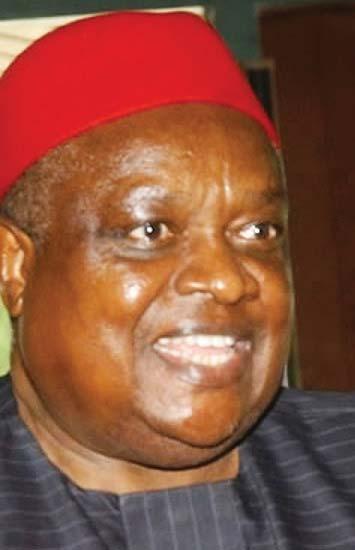
shortsighted leadership and lack of commitment on the side of citizens have thrown up new challenges and exacerbated existing difficulties. Nigerians are increasingly despondent and on the edge. The immediate challenge is how do we resolve unresolved issues in nation-building, diversity management, inclusiveness, model of democracy,and youth bulge so we can walk away from the life support machines and compete with our peers- nations?
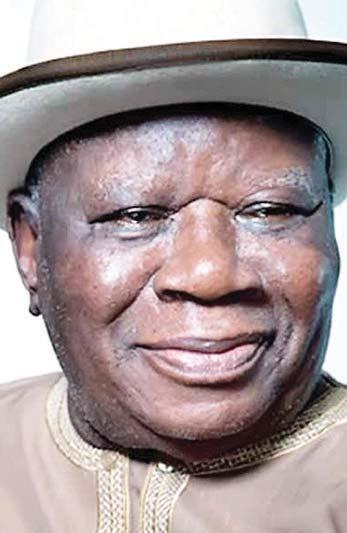
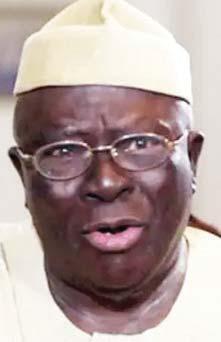

Solving Nigeria’s problems is a complex and long-term endeavour that requires cooperation, political will, and sustained efforts at various levels of society. The government, civil society, and citizens must work together to address these challenges and create a more prosperous and equitable future for Nigeria. Interestingly, almost every Nigerian knows the solutions to our problems, yet it seems impossible to tackle our problems. We have yet to have a leader with the political will to turn Nigeria around and make it a great nation. This present administration is new, and we hope it will build the courage to take bold steps in dealing with our many problems.
Some of the solutions the government must strive to provide include investing in infrastructure development, especially energy production, to stimulate economic growth. Diversify the economy by promoting sectors other than oil, such as agriculture, manufacturing, and technology. Support small and medium-sized enterprises (SMEs) to create jobs and boost economic resilience. Pursue better education outcomes. Improve healthcare infrastructure and access, especially in rural areas. Address security challenges through operations and comprehensive strategies that address underlying social, economic, and political factors. Prioritise infrastructure projects that promote economic development and job creation. Attract foreign and domestic investments in infrastructure development. Develop agricultural value chains to achieve self-sufficiency . Create youth employment programs and opportunities through skills training, apprenticeships, and vocational education. Promote entrepreneurship and provide access to funding and resources for startups. Promote interethnic and interreligious dialogue and understanding. Encourage inclusive policies that address historical grievances and promote social cohesion. Strengthen anti-corruption institutions and enforce strict anti-corruption laws.
These solutions may not be new, but we must keep highlighting them until we get the messiah in the ilk of Paul Kagame of Rwanda, Lee Kuan Yew of Singapore, and Deng Xiaoping of China, who will summon the political will and strength of purpose and vision to transform Nigeria.
COVER 53 THISDAY, THE SUNDAY NEWSPAPER OCTOBER 1, 2023
Aduku
Iwuanyanwu
Adebanjo Clark
Dr.Petersideisapublicsectorturnaroundexpert, formermemberofNationalAssemblyandcolumnist.
Dakuku Peterside
Nigeria @ 63... Nigeria @ 63... Nigeria @ 63...
Years of Lost Economic Opportunities
Nigeria’s history, especially since independence in 1960, has been characterised by years of missed opportunities and the attendant shock on the economy.
Analysts said Nigerians are currently paying the price of the failure of successive administrations to take advantage of the immense opportunities that presented themselves at the dawn of Nigeria’s independence from Britain in 1960.
Oil discovery has become Nigeria’s developmental Achilles’ heel. This is because more than six decades after independence and despite the huge human and natural resources available in the country, Nigeria remains one of the poorest countries in the world. The country has evolved into one of the least economically diversified countries because of her pathological dependence on oil export earnings.
Oil dependence is said to have led to the underdevelopment of manufacturing capacity for industrial exports, and export of processed agricultural goods. The oil sector has not significantly improved the well-being of Nigerians. Non-oil sectors lead to vastly more employment opportunities than the oil sector and their economic activities contributed approximately 93 per cent of GDP in 2020.
Unfortunately, despite the contributions of agricultural produce like cocoa, groundnut, and palm oil to Nigeria’s economy and their potential to do better through higher production, value chain development, local consumption, and export, this subsector of agriculture has remained neglected and underutilised.
Economic analysts are still befuddled by the undesirable transition from a country with overwhelming economic potential on the back of agricultural produce, rich mineral resources, productive youth population, and culture of discipline at independence, to a mono-economy and the progressive erosion of the nation’s economic potential.
“Looking back to the 1960s, Nigeria was the second largest producer of cocoa and highest source of FX before investments in the oil sector. Consistently, cocoa became the second highest source of FX for the country,” Adeola Adegoke, president of the Cocoa Farmers Associa tion of Nigeria (CFAN), said.
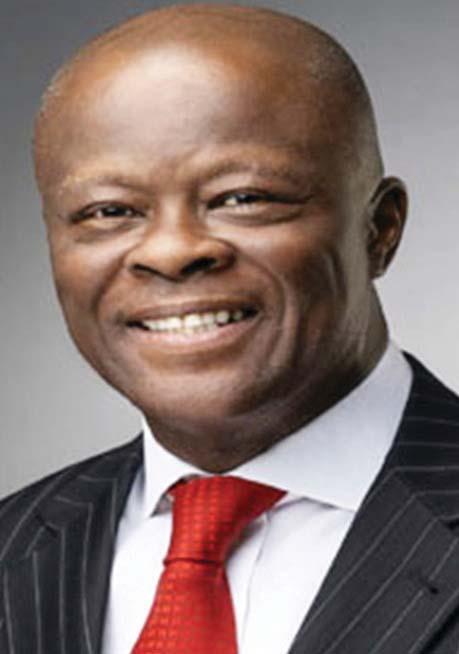
Over 50 per cent of all exports in the 1970s and over 60 per cent in 1980 were made up of cocoa. But as time went on, its share steadily decreased, falling from 49 per cent in 1989 to 22 per cent in 1998. In 2010, cocoa production accounted for only 0.3 per cent of agricultural GDP.
Groundnut, another agricultural produce, sustained the economy through revenue from exports to both foreign and local markets during the agricultural boom. The groundnut pyramids were the pillar of the northern economy and they were also a spectacle as they towered high to a point higher than most buildings in Kano City.
In the 1980s, groundnut production in Nigeria nosedived and what was left of the famous groundnut pyramids in Kano were only stories.
Unfortunately, palm oil, another revenue earner at independence was not spared of the fate that befell cocoa and groundnut trade as the obsession with crude oil dampened enthusiasm for palm oil production, especially after independence. The same fate befell other agricultural produce, especially in the 1980s when rural-urban migration shook the foundation of Nigeria’s agriculture.
Most of the development initiatives introduced by successive administrations could not redeem the situation as most of them were described as half measures. Such policies include former President Shehu Shagari’s Green Revolution and Olusegun Obasanjo’s Operation Feed the Nation. Former President Muhammadu Buhari’s notable agricultural policies include the Agriculture Promotion Policy (APP), Nigeria–Africa Trade and Investment Promotion Programme (NATIPP), Presidential Economic Diversification Initiative (PEDI), Zero Reject Initiative, Economic and Export Promotion Incentives, National Agricultural Technology and Innovation Policy (NATIP) and the Food Security
Council, among others.
Former President Goodluck Jonathan introduced Incentive-Based Risk Sharing Systems for Agricultural Lending (NIRSAL) through the Central Bank of Nigeria (CBN).
Nigeria’s once-thriving palm oil industry is often cited as one of the most miserably failed economic opportunities in the country. As palm oil found wider use in food processing and industry, global demand for the commodity surged. By 1982, worldwide palm oil exports had grown to a staggering
2,400,000 million tonnes per annum.
For most of this period, Nigeria held centre stage as one of the largest producers and exporters of palm oil, accounting for more than 40 per cent of global output in the 1950s. At the time of the country’s independence from British colonial rule in 1960, palm oil contributed 82 per cent of national export revenue.
However, the oil boom of the mid-seventies and the subsequent decline of farming proved catastrophic to the sector. By the end of the 20th century, the Nigerian palm oil harvest had dwindled to just seven per cent of global production. More embarrassingly, the once-largest exporter had turned into a net importer of palm oil, sourcing 180,000 MT of the commodity from international markets to meet local demand.
The Nigerian economy for decades has been largely dependent on oil as its main source of revenue, despite several policies, measures and efforts that were put in place to rectify the situation by diversifying into other sources of income.
Despite contributing more than 80 per cent of the country’s revenue as well as foreign exchange earnings, the oil sector’s contribution to Gross Domestic Product is minuscule. According to the GDP report, the oil sector contributed 6.21 per cent to the total real GDP in Q1 2023, down from the figure recorded in the corresponding period of 2022 and up from the preceding quarter, where it contributed 6.63 per cent and 4.34 per cent, respectively.
Apart from its distraction from other sources of revenue, crude oil product ion is also a source of security and environmental problems in the country with huge amounts of money earmarked for pipeline monitoring and compensation for environmental degradation caused by oil mining in the Niger Delta region.
The easy revenue provided by oil has also encouraged some sub-national governments to pay much attention to other sources of revenue in their states and that is why apart from Lagos and Ogun states, no other states can survive without the monthly revenue allocation to all tiers of government. This is said to be a contributory factor to the scourge of unemployment and infrastructural decay in the country.
Among other measures put in place to stabilise the economy, the Structural Adjustment Programme (SAP) introduced by former President Ibrahim Babangida liberalised trade and encouraged privatisation and exports. But it also ushered in unbridled importation of cheap and sub-standard products. Local manufacturers could not compete partly because of the high cost of production and the influx of cheap goods. Also, there was no protection for infant industries.
The result of policy flip-flops was a fall in the growth rate of the manufacturing input. The Nigerian industrial sector is also littered with the carcasses of collapsed industrial estates in places like Lagos, Ibadan, Kano, Port Harcourt, among others.
For instance, many of the major industrial areas have been converted to other uses or completely abandoned.
Confirming the sustained closure of operations, the Manufacturers Association of Nigeria (MAN) said in 2009 that 839 firms shut down that year. As disclosed on the floor of the Senate last Tuesday, 370 firms have closed down in the past year. Today, manufacturers complain of issues like multiple taxation, the falling rate of the rate of naira and the attendant scarcity of foreign exchange, insecurity, energy crisis, inflation, and policy inconsistencies among others.


Perhaps, one of the greatest problems affecting virtually all sectors of the economy from Independence to date is the inadequacy of power supply which is blamed for the slowing down of the economy and collapse of many businesses.
On June 9, 2023, Nigeria adopted the Electricity Act 2023, which repealed the Electricity and Power Sector Reform Act of 2005. This effort has however failed to inspire hope in the economy as the lack of capacity of the current arrangement is worsened by the regular collapse of the power grid, a situation that has continued to compel homes and businesses to rely on generators.
54 THISDAY, THE SUNDAY NEWSPAPER OCTOBER 1, 2023 COVER
Cardoso
Edu
Festus Akanbi
Blighted by Insecurity
Ahamefula
Ogbu
The traumatic security situation as Nigeria marks her 63rd Independence anniversary is so glaring. When the statistics on killings and displacement of victims from their ancestral homes is summed up, the reality will only be too grim.
Once a peaceful haven, Nigeria in the last 10 years has been facing deplorable insecurity. So bad is the situation that every global index now ranks it high. Just last week, it was ranked sixth in the world for organised crime, according to the 2023 Global Organised Crime Index.
The report stated that Nigeria continues to face a series of security challenges, corruption and other criminal activities.
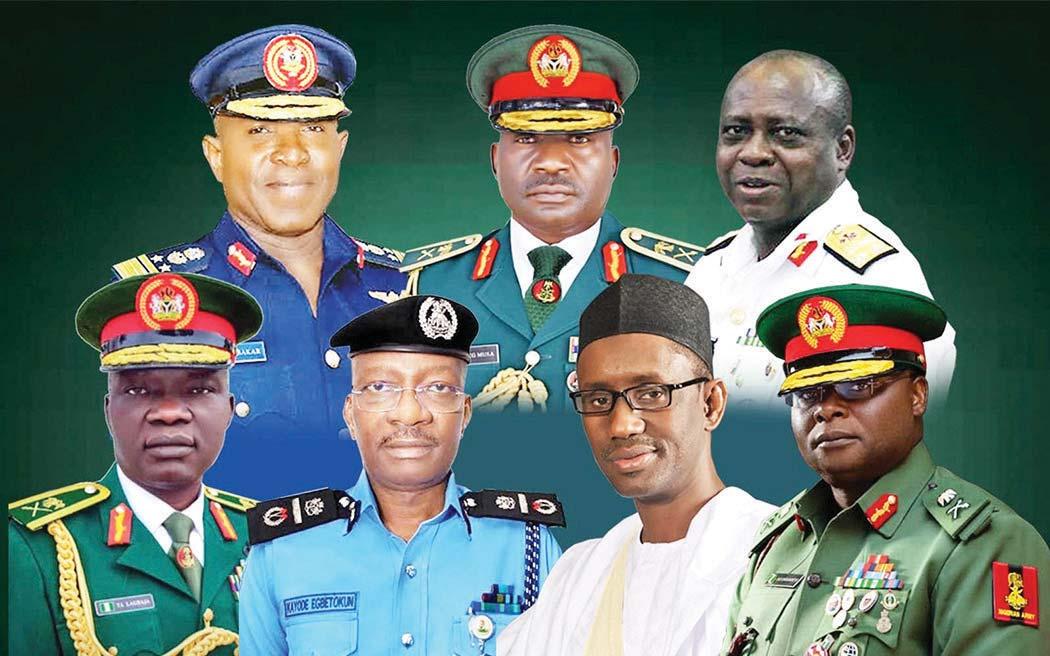
According to the survey done by the Global Initiative Against Transnational Organised Crime, which was released on Wednesday, the status of organised criminality in Nigeria increased by 0.13 points, making it the sixth in the world and second highest in Africa behind the Democratic Republic of Congo (7.35) and ahead of South Africa (7.18).
Although serious efforts are being put in place by the current administration to tackle the situation, analysts believe that it is going to be gradual.
States such as Benue, once proudly described as the food basket of the nation, now harvests more dead bodies than crops as herdsmen picked up their gauntlet since 2015 to the extent that the number of the dead make it appear as if they are not human lives.
In Kaduna State, especially in its southern part, people are killed or kidnapped at will. Zamfara State has also been ravaged by bandits who collect hundreds of millions of naira in ransom from communities before the residents can freely move in their fatherland.
Sokoto, Adamawa, Taraba and Kebbi are not spared of the orgies of violence as people who dare to earn decent livelihoods pay taxes and levies, not to the Nigerian government but to criminals who move freely with sophisticated arms.
In Niger State, with vast arable lands, bandits said to be foreigners even challenge the firepower of the armed forces, shooting down helicopters and fighter jets as if Nigeria is in a full-scale war with organised armies.
The once peaceful Plateau State has also been in the news, not for its weather conditions that imbue it with natural ability to grow crops to feed the nation but for the numerous sacking of villages and towns even with the Special Forces stationed in the various parts of the state.
In the North-east, places like parts of Borno State, despite the commendable efforts of the people-oriented governor, Professor Babagana Zulum, normal living conditions have continued to be
interrupted violently by the Sambisa Forest warlords while residents of Bauchi and Yobe states appear to have had relative relief. The North-west state of Katsina has particularly had it rough as border communities with Zamfara State and the adjoining forests have become a haven of banditry.
Though Kano is a bit calmer, the state is traditionally a hotbed of political upheavals. Kogi State, a North-central state, which is a gateway to the Federal Capital Territory (FCT) has become the hidden hotbed of insurgency and other forms of criminalities, resulting in serious jailbreaks.

Nasarawa State has become a victim of military operations to dislodge insurgents in the neighbouring states, which led to the influx of bandits into the state.
The South-east states are also suffering from the divisive and discriminatory actions of former President Muhammadu Buhari whose strong-arm tactics appeared to have morphed the flag-waving Biafra agitators into arms-carrying youths, which has fuelled frightening levels of insecurity in the zone.
The hope that the agitators would see light and give peace a chance has remained a dream. A region, which had touted itself as the most peaceful, has become a dry keg of gunpowder with a roaring flame on it. The daily news from the South-east is of killings and arson carried out deliberately by the agitators or security agencies who have been targets of attacks and who unleash reprisals on the innocent residents of any community they suffer casualties.
The once peaceful states are no longer safe as Russia-type private armies are hired by the federal government, while security forces are crying out over inadequate funding. Businesses are fleeing the region while youths and security agents are being killed in their numbers.
Military aircraft now bomb the suspected locations of the agitators who have built criminal enclaves in the name of fighting for freedom. In all those states of the region personalities have been killed and properties destroyed while youths inhabit forests from where they launch attacks on their targets.
Although Rivers State has always been a hotbed of resource control agitators who claim that they break pipelines to steal crude oil due to government’s repeated promises that its plan to deliver democracy dividends is in the pipeline, the quest for control of the political power in the state has also
fuelled cultism.
The latest violent and embarrassing incident in the state was the decapitation of a senior police officer, said to be an uncommon crime buster whose genitals were severed and paraded on a platter by people who chanted and hailed themselves as members of Icelander cult group. Bayelsa State, which has its own armed ‘generals’ is not left out of the violence equation. The Nembe killings and clashes with herdsmen said to have been invading some communities, added to illegal oil bunkering, have raised different forms of violent agitations. In Akwa Ibom State, cultism and fights for control of areas of influence are increasingly yielding results in the form of increased number of unexplained killings while in Cross River State the issue of Bakassi and separatist agitations have also fuelled insecurity. In Delta State, apart from constant herdsmen attacks which claimed a number of traditional rulers, there is also a spillover of violent activities of Biafran separatist agitators from Anambra State.
In the South-west, the formation of their regional security outfit, Amotekun, seems to have improved the level of security in the region; the invaders have not given up.
Ondo State has particularly had it rough from invaders who detonated a bomb in a church and killed many worshippers. Incidents of kidnappings are also rife there. Osun State said to be the host to some natural resources, is having similar problems as Zamfara State where it is alleged that interests struggling for control of minerals create a crisis to distract and control.
Ogun State is also having similar issues of kidnapping and banditry, in addition to other forms of criminalities. Oyo State, with its vast forests and landmass, and Lagos State, are not spared.
The toga of untouchable which Abuja wore for long has also been challenged as security breaches have put a lie to. The hitherto secure estates in Abuja have become victims of kidnappers, who at their leisure, stroll in there and take their booties.
In all these, there seems to be a lacuna in appropriate responses because though black spots on the highways and towns are known, the problems of insecurity still persist in such places thereby creating the impression that there is lack of motivation among the security agencies.There also appears to be politicisation of security. It is common to hear the heads of security agencies openly praising the president and saying with his marching orders, they are going to do things differently as if their appointments were not for them to be effective and discharge their duties without waiting for marching orders from certain quarters.
COVER 55 THISDAY, THE SUNDAY NEWSPAPER OCTOBER 1, 2023
Nigeria @ 63... Nigeria @ 63... Nigeria @ 63...
Nigeria @ 63... Nigeria @ 63... Nigeria @ 63...
No Alternative to Democracy
With a current vast population of over 200 million and huge mineral resources, the hope of many Nigerians and other world leaders is that by now Nigeria would have been in a strategic position to lead Africa and the black race in global economic and political politics. But 63 years after the country gained its independence from the British colonialists, nothing seems to have significantly improved.
Prior to 1960, one of the nationalists who fought for the country’s independence, Chief Obafemi Awolowo, once said that ‘’Nigeria is not a nation; it is a mere geographical expression’’ – apparently making reference to the noticeable country’s weakness and largely lack of unity. But the then Prime Minister of Nigeria, Alhaji Tafawa Balewa, in his Independence Day speech happily told the world that Nigeria was dedicated to leveraging its independence to become an accountable country -then and in the future.
“This is a wonderful day, and it is all the more wonderful because we have awaited it with increasing impatience, compelled to watch one country after another overtaking us on the road when we had so nearly reached our goal.
“But now we have acquired our rightful status, and I feel sure that history will show that the building of our nation proceeded at the wisest pace: It has been thorough, and Nigeria now stands well- built upon firm foundations,” Balewa reportedly told a cheering crowd in Lagos on October 1, 1960.
Despte Balewa’s claim, poor governance, abject poverty, pitiable electricity infrastructure, needless deaths from bad roads and ill-equipped hospitals, as well as incessant and fear-provoking security challenges have continued to prevent the country from realising her full potential.
Across its zones, states, local government areas, villages and homes, citizens have grown fatigued and depressed because of how gravely the country is doing in key socioeconomic and political standards. A country of a multiethnic and culturally diverse federation of 36 autonomous states and the Federal Capital Territory, the security landscape for decades has been shaped by the war against Boko Haram and other terrorist groups in the North-east - in addition to incessant cases of banditry and kidnappings in the North-west, and parts of the southwest. The embattled people of the South-east have continued to witness unrest resulting from separatists’ agitations.
Giving an economic overview of Nigeria in its recent report, the World Bank said that the high oil prices since 2021 have not boosted the country’s economy as had been the case in the past. Rather, the global institution argued that macroeconomic stability had been weakened, amidst declining oil production, a costly petrol subsidy - which until it was removed recently, was consuming a large share of gross oil revenues; exchange rate distortions and racketeering, monetisation of the fiscal deficit, and high inflation.
Obviously complicated by the poor planning of the removal of fuel subsidy, the deteriorating economic environment has left millions of Nigerians in poverty. With Nigeria’s population growth continuing to outperform poverty reduction efforts, it has been projected that the number of Nigerians living below the national poverty line will rise by 25 million before 2025. While some analysts have argued that Nigeria had made some progress in socio-economic terms in recent years, its Human Capital Development ranked only 150 of 157 countries in the World Bank’s Human Capital Index. The country has continued to face immense development challenges - including the need to reduce the dependence on oil for exports and revenues; diversify its foreign exchange sources, close the infrastructure gap; build robust and active institutions, as well as address good governance issues.
For decades, many of the successive governments have refused or failed to realise that the crucial role of any responsible and responsive government, is to protect citizens from disorder, internal and external aggression, and to create and maintain laws, systems and structures that preserve people’s dignity and provide socio-economic stability.
The deadly activities of non-state actors, which have claimed thousands of innocent souls, are pointing to the fact that Nigeria is a failing state – Nigeria is already ranked the world’s 15th most fragile in the 2023 Fragile States
Index. And the increasing reliance on private security contractors with offensive backgrounds to safeguard Nigerians and nationals, is a strong indicator that Nigeria is actually failing. These deep value challenges, may have supported the not-too-convincing argument by some depressed Nigerians, including former President Olusegun Obasanjo, who have continued to reveal their uneasiness about the current rout of democracy in the country.
Obasanjo, recently advocated for the relinquishment of a system that has only “nurtured unemployment and poverty’’ and failed to deliver “peace, security, stability, prosperity, wealth-creation, employment, and the wholesomeness of the society.”
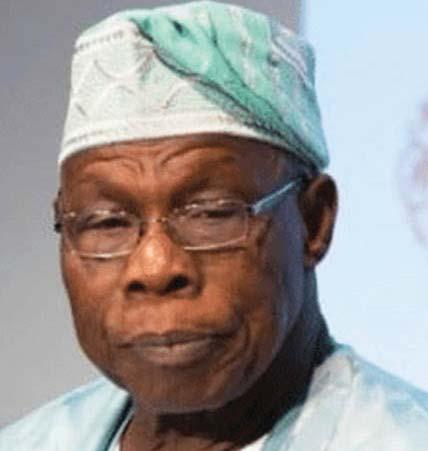
In a way, the fretfulness and disenchantment with the nation’s democracy’s trajectory and its palpable letdown to deliver the dividends of democracy - for enhancement in the lives of ordinary people in the past few decades is not unwarranted.
Nigeria’s general election, including that of 2023, may have been seen as disastrous; the Judiciary may have failed to deliver justices, and the legislative arm of government may have failed woefully in its constitutional responsibility for decades, but it is an excuse for some Nigerians to continue to express solidarity with military coups in some African countries, as we have witnessed recently – with some slow-thinking person even arguing that “the next destination for the coup plotters is Nigeria.’’
The argument is that the democratic governance in Nigeria may have failed to reflect the true features of democracy, but military intrusion in the affairs of the country is not an option. The long period of military rule in Nigeria, many political experts have argued, has had a huge negative impact on the political advancement of Nigeria. The military regimes in the past have been accused and rightly so, of destroying Nigeria’s institutions through some of the policies they promulgated and pursued, beginning in the retired General Yakubu Gowon’s era. Some of the policies, along with all the coups and counter coups, surely helped weaken, and in some cases, wrecked the sense of nation-building and made life and living wret ched and excruciating.

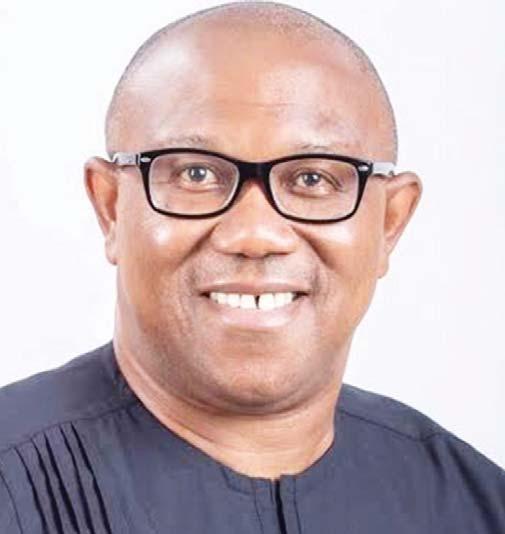
Though the military junta was disengaged from power since 1999, the effects of their long reign have not left the country; indeed, the socio-economic effects of military rule were devastating. The traditional agricultural base of the nation economy was abandoned – that is when the country started depending on exports of oil for its survival, which later led to an unstable economy. The military regimes – for over three decades were characterised by gross incompetence, unrestrained, wasteful and mismanagement. It is on record that as a result of the poor military economic policy of the 1980s, 45% of Nigeria’s foreign-exchange earnings were going into debt servicing and there was very little growth. This led to a huge rise in poverty, crime, child abuse, disease, institutional decay and urban dislocation. And many attributed the instability and dissatisfaction caused by these policies to the major cause of the consistent pattern of coups.
The military regimes also affected the executive, the legislature, the judiciary and the civil society. The military values and norms imbibed by Nigerians for years currently manifest in the practice of democracy today. This expounded the use of force rather than dialogue in the suppression of dissent in Odi, and Zaki-biam during former President Obasanjo-led government in 1999, the disobedience of the court orders with impunity; closure of media houses and the arrest of journalists, we have witnessed since 1999.

As many right-thinking experts have consistently argued, the statutory responsibility of the military is to protect the territorial integrity of the nation against external attack. It is an institution that is without question committed to the management of violence and prosecution of war against external invasion and attacks. It is a specialized institution.
Therefore, the answer to ‘’less democracy is more democracy’’, and the worry by Nigerians about its future, is a reminder of the existence of a deep and dogged yearning for good governance: Fair, free and transparent elections, accountability, and the rule of law.
Nigerians must continue to stoke the fire on the need for the nation to get it right for there is no alternative to democracy.
56 THISDAY, THE SUNDAY NEWSPAPER OCTOBER 1, 2023 COVER
Obasanjo
Obi
Atiku
Iyobosa Uwugiaren writes that despite the current deep socio-political and economic challenges, there is no alternative to democracy
Nigeria @ 63... Nigeria @ 63... Nigeria @ 63...
The Ideal Parliament
The legislature is regarded as the First Estate of the Realm, because it is responsible for determining the order of events in a nation, by making laws to regulate human conduct, to establish and define the roles of institutions and to create offices and state their functions. It is through legislation that the executive and judicial arms of government are created; thus, every other section of society derives their existence from the law as made by the legislature. However, the primacy of the legislature goes beyond just making laws, as it is empowered to conduct public hearings and also engage in oversight functions over other organs of government.
It is thus expected that through its additional powers of control of public funds, approval and oversight functions, the legislature will work to curb the excesses of the executive arm of government, especially in situations where retired politicians have hijacked the democratic process, having in their prime tasted power and are not willing to hand over to others. These factors have shot the legislature into national focus, especially the leadership. Presently, the National Assembly in Nigeria is seen as a place of retirement for ex-governors and other top government functionaries, which limits the capacity of the lawmakers, especially the Senate.
The National Assembly is a bicameral legislature consisting of 109 members of the Senate and 360 members of the House of Representatives, modelled after the federal Congress of the United States and meant to guarantee equal representation. The doctrine of separation of powers dictates that the three arms of government should operate independently. If we follow the chronological order of the Constitution, the legislature is established under section 4, the executive under section 5 and the judiciary under section 6, in that order. Their functions are defined separately but in practice, they work complimentarily. For instance, the executive has to inaugurate the legislature, the judiciary has to swear in the executive whilst the legislature has to approve the cabinet and indeed the budget of the executive and the judiciary. Amongst the three arms of government, the executive is more visible, being the organ responsible for formulating and executing policies. The powers granted to the executive by the Constitution are so enormous that only an active and functional legislature can help tame the propensity of the executive towards dictatorship. Beyond the functions enumerated in section 4 (1) and (2), the Constitution also empowers the legislature with other important responsibilities for checks and balances. By virtue of section 143 of the Constitution, the National Assembly can initiate the process of removal of the President or the Vice-President under certain circumstances, in the same way that the House of Assembly of the State is empowered to remove the governor under section 188.
The legislature can also help check the excesses of the executive in many areas, for instance by withholding approval for certain appointments in order to achieve equity, equal representation and gender parity. This was well demonstrated recently by the House of Assembly of Lagos State, when it withheld approval for certain names proposed by the governor for appointment as commissioners, even though the reasons given beg many questions, it was still an opportunity to assert the independence and autonomy of the legislature. Furthermore, under section 88, the legislature is empowered to conduct inquiries and to conduct public hearings on the activities and policies of the government either by itself or upon complaints from the public, for the purpose of preventing corruption or waste.
The legislature also has control over public funds and it can deploy such power to keep the executive under control. Thus, where the legislature is vibrant and active to keep the executive on its toes, there is less impunity and lawlessness and the people will enjoy good governance as part of the dividends of democracy. We saw a good example of this between Nancy Pelosi and Donald Trump when the American Congress constantly and diligently scrutinised all the programmes and policies of the Trump administration, for a better America.
On the other hand, where the legislature is docile,
inactive and is conquered by the executive, there will surely be poor governance and a tendency for the executive to slide into dictatorship, leading at times to oppressive and anti-people policies. In essence, democracy will flourish, good governance will be guaranteed and the people will rejoice when there is a vibrant and active parliament. The reverse of course is always the case when the legislature is timid and always seeking compromise on all issues.
The 10th National Assembly has not been tested yet and given the circumstances of its emergence, we do not expect too much. It is commendable however that the current parliament was able to assert itself in relation to the ambitious plan of ECOWAS to launch a war against Guinea. It is to their eter nal credit that the legislators rose in unison to amplify the voice of the people at that time. As an autonomous institution, the National Assembly should be autonomous in words and in deed, not crowing before the executive arm of government for palliatives.

The 9th National Assembly turned out to be the most robotic parliament in the recent history of Nigeria, preferring rather to treasure pol itical party affiliation over and above the national interest. In that dispensation, the executive arm of government was always certain of maximum support and approval of all proposals and requests, no matter how unpopular, injurious or backward. In the jurisdiction for which our legislative arm has been patterned, there is the robust system of separation of powers and the doctrine of checks and balances, as between Pelosi and Trump. The three arms of government are expected to operate independently and complimentarily, not dependent upon or patronising, in the manner that the 9th Assembly went about its duties. No doubt it is good to have a responsible legislature for the purpose of harmonization and development but when it gets to the level where the executive is always right, then such level of dubious cooperation should worry all lovers of true democracy. A legislature that cannot supervise and check the excesses of the executive is not worth its name at all. Truth is, such an assembly of persons cannot claim to represent anyone, when the chips are down. They represent only themselves, only their interests and their stomachs.
In relation to its primary power of legislation, the legislature must be very dynamic and responsive. For instance, it must be clear to the National Assembly that the Electoral Act 2022 needs urgent amendment, especially in the controversial areas of multiple nomination of candidates, the status of public officers
who desire to contest for elections, the locus standi of citizens contesting the qualification of candidates, electronic transmission of election results and indeed funding of political parties. By now, the National Assembly should have a dedicated legal team that will be responsible for collation of major decisions of the Supreme Court wherein certain provisions of the Electoral Act have been interpreted and ruled upon.
These judicial decisions should form the basis of the review of the Electoral Act for amendment. There are elections that will take place before the next general election in 2027. There must be clarity on the role of technology in the conduct of elections so that matters are not left entirely to the discretion of the electoral umpire. In this regard, it is my view that we must substantially reduce human intervention in the conduct of elections.
Furthermore, the legislature can help achieve good governance if it includes a provision in the Constitution and the Electoral Act giving opportunity to independent candidates to contest elections. There are competent people in Nigeria who run away from the political space because of the problems associated with the management of political parties, the issue of godfathers, the conduct of primaries and cost of sustaining party leaders in order to secure their endorsement.
As elected representatives of the people, the parliament is expected to assert the will of the people by invoking the relevant provisions of the Constitution to protect the interests of the people they represent. The constitutional role of law making should not be sacrificed on the putrefied altar of constituency projects. So much has been invested in the National Assembly in order to guarantee optimum performance and so the leadership of such a crucial organ should not be a matter of political patronage or reward for perceived electoral support.
Nigerian cannot afford the misfortune of parading elected representatives who are whipped along the lines of executive preferences, all the time. There has to be a balance of power and of forces, for our nation to ever dream of attaining the expected growth that our leaders have touted so often.
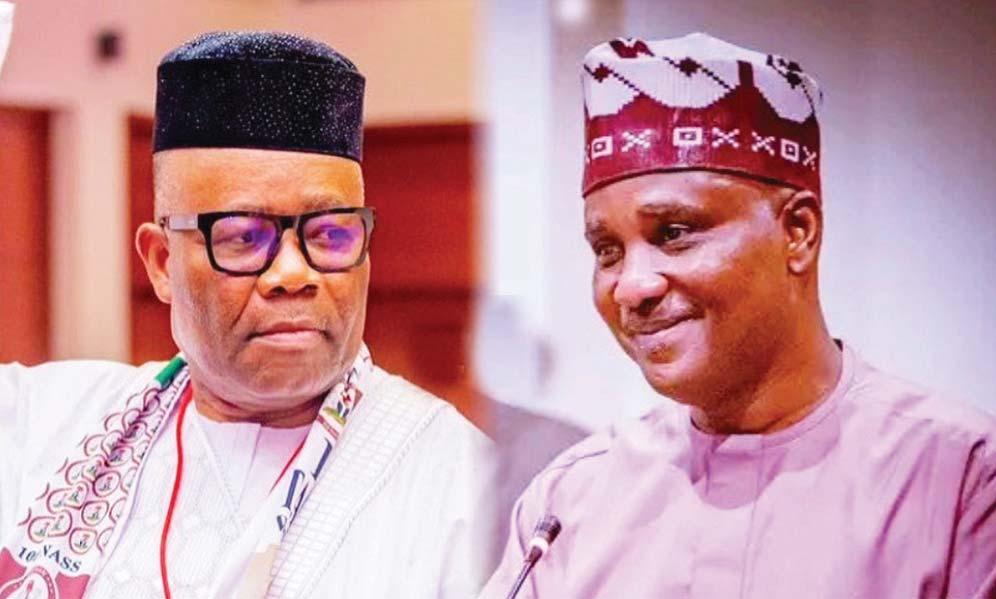
COVER 57 THISDAY, THE SUNDAY NEWSPAPER OCTOBER 1, 2023
Akpabio Abbas
Ebun-Olu Adegboruwa
Nigeria @ 63... Nigeria @ 63... Nigeria @ 63...
A Captured Temple of Justice
Chidi Anselm Odinkalu
In July 2023, the Chief Justice of Nigeria (CJN) presided over a meeting of the National Judicial Council (NJC) to appoint his son as a judge of the Federal High Court.
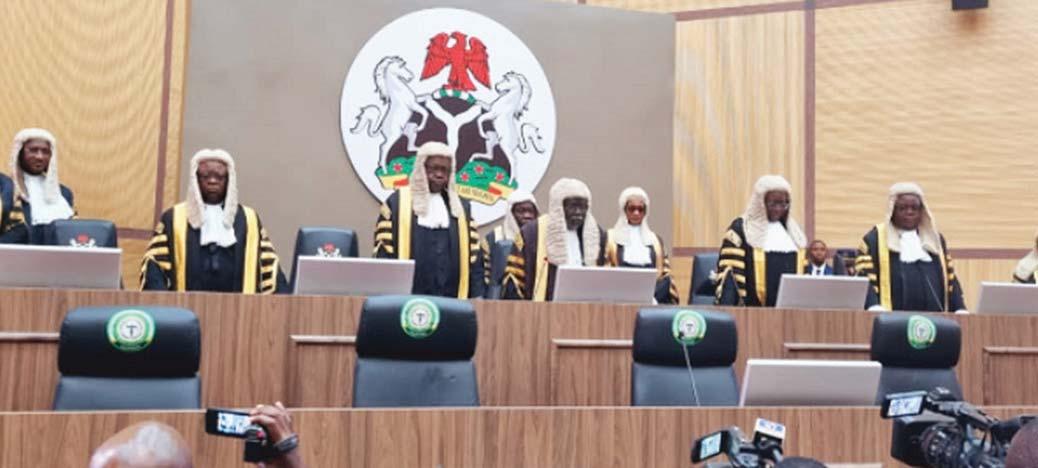
A month earlier, the NJC convened to endorse the promotion of the President of the Court of Appeal’s son-in-law. This individual had previously been appointed as a judge of the National Industrial Court in 2017.
In January 2021, the Governor of Plateau State swore in the wife of this same son-in-law, herself the daughter of the same President of the Court of Appeal, as a judge of the High Court of Plateau State.
The following year, the wife of the President of the National Industrial Court of Nigeria was similarly appointed a judge of the High Court of the Federal Capital Territory. Her brother, like her husband, was also a member of the NJC.
Meanwhile, at the meeting where it approved the son of the CJN for a judgeship, the NJC also approved the appointment of a nephew of the Chief Judge of Ogun State, to the Federal High Court.
What is good for the judges, apparently is also good for the politicians. So, as the country headed into the 2019 elections, the then ruling party handed the ticket to represent Bauchi North in the Senate to the husband of the President of the Court of Appeal, who plays the primary role in election dispute resolution. On his exit from the Senate four years later, the Senator confessed that instead of using the bedroom to enjoy geriatric connubium, he had converted it into a venue where he habitually “encroached” on his wife’s judicial independence for the benefit of his political co-travellers.
Meanwhile, at the retirement of that President of the Court of Appeal, her husband became surplus to requirements and the party re-allocated the ticket in 2023 for his seat to the Senate instead to one of the sons of the then CJN.
Not to be outdone, another major political party handed a ticket to the House of Representatives to another son of the same CJN.
In 2022, the Governor of Bayelsa State appointed his wife as a judge of the state High Court.
These examples merely scratch the surface of a larger pattern where high judicial positions in Nigeria are consistently occupied by a web of political and judicial insiders, often connected through family ties, personal favours, or close relationships. Even after 63 years of Nigeria’s independence, this group continues to erode judicial independence.
A Law professor and Senior Advocate of Nigeria (SAN), Itse Sagay, who also chaired the Presidential Advisory Committee against Corruption (PACAC) in the administration of former president, Muhammadu Buhari, was on firm
grounds when he declaimed over three years ago that “sons and daughters of retired and serving judges and justices are being nominated for appointment into sensitive judicial positions at the expense of more qualified candidates without privileged support and backing.”
One response to this trend is the refrain that propinquity or relationship to a judicial or political insider should not bar qualified persons from judicial office. Yomi Aliyu, SAN, even goes further to claim that “the judiciary had become a family affair throughout the world, especially common law nations.” He could not produce any evidence to back up this unimaginative invention, which is not surprising because there is none.

Surely, if judicial temperament and skill were to be hereditary or sexually transmitted as Mr. Aliyu suggests, this tendency in Nigeria should have had some antiquity. But, among Nigeria’s first eight indigenous CJNs until after Mohammed Uwais, only the first, Adetokunbo Ademola, could count a child of his (Philip Adenekan Ademola) as a judge. By contrast, many of their recent successors since then used their office at the head of the NJC to prefer their children to a high judicial office without care or concern for conflicts of interest. Indeed, a former CJN preferred two of his children to the high court bench and another two to positions in the registry of different courts in the country.
The idea that these scions of the well-placed are more qualified for judicial office than others does not bear scrutiny. To begin with, the only constitutional requirement for judicial appointment in Nigeria is a minimum number of years of enrolment as a lawyer in Nigeria. There are no prescribed skill, character, or integrity thresholds.
The judicial managers of the appointment process skew it deliberately to ensure predetermined outcomes. This would not be the case if their children, spouses and mistresses (with whom they choose to fill many judicial vacancies) were that competitive.
In 2020, for instance, the NJC advertised 15 vacancies for the FCT High Court but nominated 34 persons for appointment, with all of the nonadvertised nominations going to the children of judicial insiders. It seemed clear that they chose deliberately to be parsimonious with disclosure of all the vacancies in order to be able to share those in an exclusive bazaar for judicial insiders.
This is not the only problem. Femi Falana, SAN complained last year that “two years ago, a candidate who scored zero in the NJC interview was made a judge.” The qualification of that candidate was their relationship to a judicial insider. This is not an exception. A nephew of another senior judicial figure from southern Nigeria who similarly failed the written test was also jumped above other more qualified candidates in a recent round of judicial appointments.
The alacrity with which parents and paramours in high judicial or political office in Nigeria suddenly discover these days that the hidden genius of their scions or sleep mates deserve elevation to the highest levels of judicial office tasks every calculus of probability beyond the realm of plausibility. The only explanation for this pattern is that the judicial office is hawked as a transactional token, filial favour, or genital propinquity. In Nigeria, enabled by politicians in whose favour these offices are procured as an inoculation against electoral misadventure, this pattern of abuse of judicial office prospers without credible challenge.
Most importantly, this practice of insider dealing in judicial appointments violates the United Nations Basic Principles on the Independence of the Judiciary as well as the Judicial Code of Conduct established by the NJC itself. As a rule, under the Basic Principles, “any method of judicial selection shall safeguard against judicial appointments for improper motives.” That is what happens when the best qualification of a nominee for judicial office is who they are related to or whom they sleep with.
Moreover, Rule 8.3 of the Judicial Code of Conduct contains this explicit prohibition: “A judge who takes advantage of the judicial office for personal gain or gain by his or her relative or relation abuses power.” It is impossible to not see that a CJN who sits as Chair of the NJC to prefer his child to judicial office violates this stipulation.
Yet this has become the rule, not the exception. The result is that Nigeria’s judiciary now suffers a terminal credibility deficit that endangers civilised dispute resolution to the point of making vigilantism highly profitable. The Council of Foreign Relations validates this causality between “public mistrust of the police and the judicial system” on the one hand and what it calls Nigeria’s “epidemic of lawlessness” on the other.
There is no magic bullet out of this mess. But it is essential to return credibility to judicial appointments. That must begin with un-bundling the multiplicity of roles in the office of the CJN and making judicial appointments more transparent and less dependent on his or her whim.
Odinkaluisalawyerandateacher.
COVER 58 THISDAY, THE SUNDAY NEWSPAPER OCTOBER 1, 2023
Creative Industry: A Journey to Resilience and Potential

 Vanessa Obioha
Vanessa Obioha
The once-frenzied mood that accompanied Nigeria’s independence celebrations has waned in recent times. Where there were fanfare and street parades, with Nigerians proudly waving their green and white flags, now only a few clusters of such celebrations remain. The reasons for this change in mood are not hard to fathom. Nigeria’s leadership and economic challenges have left little room for a celebratory spirit, given the dwindling fortunes of the Naira and the soaring cost of living.
However, amidst these challenges, one sector continues to illuminate the hearts of Nigerians on notable days - the creative industry. Divided into media and entertainment, beauty and lifestyle, visual arts, as well as tourism and hospitality, by the National Bureau of Statistics (NBS), it has been a beacon of hope and success. Recently, its significance was underscored by President Bola Tinubu, who established the Ministry of Arts, Culture, and Creative Economy to oversee this burgeoning sector.

The Nigerian creative industry has come a long way since Nigeria gained independence. While it encompasses various fields, it is the entertainment sector, especially film and music, that has propelled it to remarkable heights.
Nigeria’s history in the sound and sight medium dates back to pre-colonial days with Geoffrey Barkas’s 1926 feature film‘Palaver’ being the first feature film to have Nigerian actors. The 1930s and 1940s witnessed a boom in the establishment of cinema houses across the country by foreigners. That same era saw the beginning of Nigerian cinema, thanks to the Yoruba travel theatre groups which featured Nigerian actors prominently.
This cinematic boom persisted after independence, with more Nigerian filmmakers coming into the spotlight in the 1960s, though concerns arose about the influx of foreign films. However, the Indigenization Decree issued by the then head of state Yakubu Gowon in 1972 allowed the transfer of ownership of about a total of 300 film theatres in the country from their foreign owners to Nigerians.
With the establishment of the first television station in Nigeria, the Western Nigerian Government Broadcasting Corporation (WNTV) which began broadcasting on October 31, 1959, the ‘70s was a good time for Nigerian cinema until the 1980s when a significant decline was recorded. This was largely due to the decline in revenue from the sale of crude oil, which was the country’s main foreign exchange earner, which sent the country into an economic depression. Therefore celluloid films which was the medium at the time could hardly subsist on individual funds as access to funding became difficult. However, the disappearing
cinema houses gave rise to the home video boom which began in the late 1980s and surged astronomically in the 1990s. A notable film that marked this era was Kenneth Nnebue’s 1992 film ‘Living in Bondage.’
The 2000s witnessed Nollywood’s ascent to becoming the golden child of African cinema, despite facing quality and piracy issues. Nigerian films were relished and narrated by millions across the continent. It was during this period that Nollywood achieved the enviable status of the third largest producing film industry in the world.
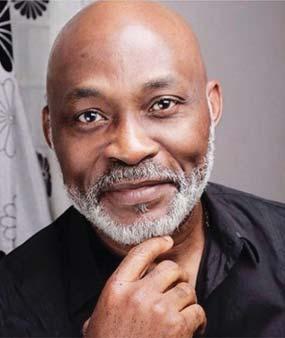

However, this dominance was a mixed bag of hopes and disappointments. While the stories told were gripping and entertaining, the production quality was poor and piracy hindered most movie producers from making profits. Even the industry, despite being the third largest producing industry, was valued poorly due to cheap production. Most of these obstacles were mainly caused by economic challenges such as lack of funding and poor access to distribution channels. Nevertheless, the industry became a big employer of labour. As of 2007, with a total number of 6,841 registered video parlours and an estimated 500,000 unregistered ones, the estimated revenue generated by sales and rentals of movies in Lagos alone was estimated to be N804 million (US$5 million) per week, which adds up to an estimated N33.5 billion (US$209 million) revenue for the state per annum. The total sales revenue generated by the film industry in Nigeria was estimated at N522 billion (US$3 billion) per annum, with broadcast content valued at N250 billion (US$1.6 billion) during this period.
Given the rise of the industry, investors started trickling in. From banks like Ecobank which sponsored Project Nollywood to media and entertainment company MultiChoice Nigeria which not only trained filmmakers through its New Directions initiative but also provided a platform, Africa Magic, which turned 20 years old this year, for storytellers to tell their narratives and be heard in millions of households across the continent.
The 2010s ushered in a new era of cinema production, leading to record-breaking revenues. By the end of 2013, the film industry reportedly hit a record-breaking revenue of 1.72 trillion (US$11 billion). As of 2014, the industry was worth 853.9 billion (US$5.1 billion) making it the third most valuable film industry in the world, behind the United States and India. It contributed about 1.4% to Nigeria’s economy; this was attributed to the increase in the number of quality films produced and more formal distribution methods.
Seeing the resilience of the people, the government
began paying attention to the industry, starting with the President Goodluck Jonathan administration which provided grants and loan facilities to the industry.
Today, as technology takes storytelling to greater heights, Nollywood is not left behind. The top streaming platforms in the world all have their eyes set on Nollywood. Think of Netflix, Amazon Prime Video, and even Showmax owned by MultiChoice, all parade original Nigerian productions which are viewed globally. While the cinema culture has become somewhat elitist, Nigerian cinemas, however, are playing host to premieres of most Hollywood films and with facilities like Ogidi Studios taking part in the production of one of Hollywood’s great films, ‘Black Panther: Wakanda Forever.’

Moreso, Nigerian films are gaining acclaim in international festivals such as CJ ‘Fiery’ Obasi’s ‘Mami Wata’ which won the Special Jury Award for Cinematography at the 2023 Sundance Film Festival. The story is not different in the music industry where artists like Wizkid, Davido, Burna Boy, Tiwa Savage, Yemi Alade, Tems, Rema, and Ayra Starr are breaking boundaries with Nigerian sounds, be it afrobeats or afro-fusion.


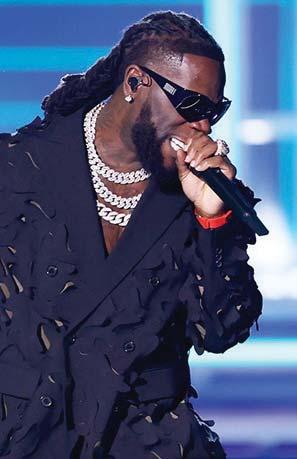
Before the current explosion in the music industry, musicians like the afrobeat legend Fela Anikulapo-Kuti, and veteran juju musician King Sunny Ade had captured the attention of the world such that foreign record labels set up shop in Nigeria. These artists are selling out international venues, bringing home international awards such as the coveted Grammy awards and even causing a dynamic change with most international awards creating an afrobeats category to recognise their amazing talents.
The fashion industry has made great strides, particularly with platforms like Lexy Mojo-Eyes and his global campaign for Nigerian fashion as well as the Arise Fashion Week which pools the cream of the fashion world globally to its stage with iconic pieces that showcase the beauty of African culture. Undoubtedly, the creative industry is a goldmine. With the right investments and infrastructure, it’s poised to generate even more significant revenue. Research data from Jobberman indicates that it already generates $4.2 billion, and with continued support, it could balloon to $15 billion by 2025.
Nigeria’s creative industry is a testament to resilience and untapped potential. As the Founder and Group Chief Executive Officer of Temple Company, the owners of Ogidi Studios, Idris Olorunnimbe aptly put it,“Nigeria is a goldmine of such local talents, waiting for the right platforms, investments, and partnerships to morph into global icons.”
The future of Nigerian creativity is bright, and the world is watching.
COVER 59 THISDAY, THE SUNDAY NEWSPAPER OCTOBER 1, 2023
Nigeria @ 63... Nigeria @ 63... Nigeria @ 63...
Burner Boy
Davido
Nnaji Wizkid
Mofe-Damijo Dominic
NIGERIA’S HEROES AND HEROINES OF DEMOCRACY


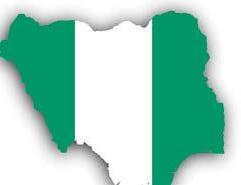
They remain unforgettable. They inscribed their names in gold in the history of Nigeria. Resolute and committed, in unison they embarked on political journeys that eventually liberated Nigeria from her political colony 63 years ago. Educated and politically savvy, they became the bedrock and powerhouse of Nigerian politics. Even though they and many others have all passed away, their names have continued to resonate on 1st October every year for their monumental contributions. To mark this year’s Independence, Funke Olaode in this piece, profiles some of the heroes and heroines, whose efforts have continued to vibrate six decades after.

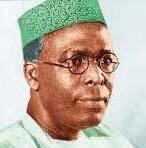
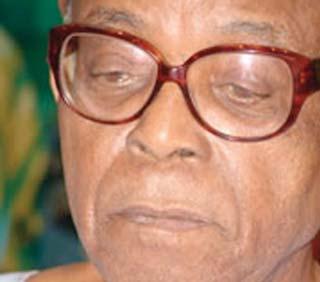
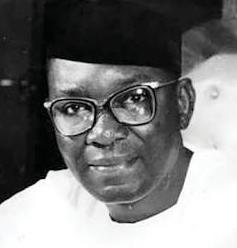
ASSISTANT EDITOR OLUFUNKE OLAODE/victoria.olaode@thisdaylive.com. 1.10.2023 A WEEKLY PULL-OUT
Macaulay Azikiwe
Awolowo
Bello
Enahoro Balewa
Nigeria’s Heroes and Heroines of Democracy
Herbert Macaulay
Regarded as the father of Nigerian nationalism, Herbert Macaulay was one of the key figures who laid the foundation of modern Nigeria.
During the 1920s when Nigeria started to witness the political agitation for self-rule, Macaulay was among the first generation of Nigerian Nationalists who protested against some policies introduced by the British colonial rule, including water rates, land issues, and management of railway finances.
In 1923, he founded the Nigerian National Democratic Party (NNDP), Nigeria’s first political party whose members were the first to sit in the legislative council and which held sway in Nigeria’s political theatre until the late 1930s when it joined forces with the Nigerian Youth Movement to form the National Council of Nigeria and the Cameroons (NCNC), a nationalist organization designed to advocate for Nigeria’s independence.
Nnamdi Azikiwe
Known as ‘Zik of Africa,’ Nnamdi Azikiwe, who was the first President of Nigeria from 1963 to 1966 was considered a driving force behind the nation’s independence. He even earned the nickname “Father of Nigerian Nationalism,” for the active role he played. Born Nnamdi Benjamin Azikiwe to Igbo parents from Anambra State in Eastern Nigeria, the renowned politician, publisher and Pan Africanist attended Storer College, Columbia University, the University of Pennsylvania and Howard University, all in the United States of America. He returned to Africa in 1934, where he began work as a journalist in the Gold Coast. In British West Africa, he advocated Nigerian and African nationalism as a journalist and a political leader. The founder of West African Pilot Newspaper born on November 16, 1904 died May 11, 1996.
Chief Obafemi Awolowo
Chief Obafemi Awolowo who was known as the ‘Sage’ was a lawyer and politician. In 1927, he enrolled at the University of London as an External Student and graduated with a degree of Bachelor of Commerce. He went to the United Kingdom in 1944 to study law at the University of London and was called to the Bar by the Honourable Society of the Inner Temple on 19 November 1946.
In 1949 Awolowo founded the Nigerian Tribune, a private Nigerian newspaper, which he used to spread nationalist consciousness among Nigerians. He played a key role in Nigeria’s independence movement in the First and Second Republics and the Nigerian Civil WarAwolowo formed Action Group (AG), where he led demands for a federal constitution, which was introduced in the 1954 Lyttleton Constitution, following primarily the model proposed by the Western Region delegation he led.
Ahmadu Bello
Sir Ahmadu Bello was one of the earliest politicians to have emerged from the North. Powerful and commanding respect among the Northern elite, he built Northern Nigeria and served as its First and only Premier from 1954 until his assassination in 1966 during the first military coup. The late politician was also a leader of the Northern Peoples Congress, (NPC), the ruling party at the time, consisting of the Hausa-Fulani elite.
Bello was instrumental to the creation of Northern Nigeria Development Corporation (NNDC), Bank of the North, and Northern Nigeria Investments Ltd (NNIL). Bello also spearheaded plans to modernise traditional Koranic education in Northern Nigeria. But his greatest legacy till this day was the modernisation and unification of the diverse people of Northern Nigeria. To preserve his memories, the renowned Ahmadu Bello University, Zaria, Kaduna State, is a monument named after him and his portrait adorns the N200 banknote.
Tafawa Balewa

Tafawa Balewa was the First Prime Minister of Nigeria upon independence in 1960. In 1957, his Northern Peoples Congress (NPC) won the plurality of votes in the Federal House of Representatives and Balewa became the Chief Minister and designated Prime Minister. As part of his plans to unify the country towards the move for independence in 1960, he formed a coalition government
between the NPC and the National Council of Nigeria and the Cameroons (NCNC), led by Nnamdi Azikiwe.
In furtherance of Chief Anthony Enahoro’s original motion, a further motion was proposed to the parliament by Balewa in 1959, and it was passed. As a consequence of the sustained pressure, the colonial governor announced the decision of the British government to grant independence in 1960. Nigeria was granted independence on October 1, 1960.
Anthony Enahoro
Anthony Enahoro became the editor of Nnamdi Azikiwe’s newspaper, Southern Nigerian Defender, Ibadan, in 1944 at the age of 21, thus becoming Nigeria’s youngest editor ever. He later became the editor of Zik’s Comet, Kano, 1945–49, associate editor of West African Pilot, Lagos, and Editor-inChief of Morning Star from 1950 to 1953. He was actively involved in the movement for Nigeria’s independence.
In 1953, Enahoro became the first to move the motion for Nigeria’s independence which was eventually granted in 1960, after several political setbacks and defeats in the parliament. Enahoro has been regarded by academics and many Nigerians, as the “Father of Nigeria State.”
His initial motion for Nigeria’s
Independence suffered a setback in the parliament, with the northern members of the parliament staging a walkout as a consequence of the motion. Notwithstanding the defeat in the parliament, a popular movement was started on account of this motion and the pressure was now mounted against colonialism and there were agitations for independence of Nigeria, or at least, selfgovernance.
Remi Fani-Kayode
Chief Remi Fani-Kayode was a leading lawyer, nationalist, politician and statesman who played a major role in Nigeria’s legal history and politics from the late 1940s until 1995. He was elected deputy premier of the Western Region in 1963.

In July 1958, he successfully moved the motion for Nigeria’s independence in the House of Representatives in Lagos. He argued that independence should take place on April 2, 1960.
Joseph Sarwuan Tarka
Senator Joseph Sarwuan Tarka was a Nigerian politician from Benue State whose contributions to Nigeria’s independence cannot be over-emphasised. He was former Minister for Transport and later Communications under General Yakubu
Gowon. Tarka was a nominated member to the Nigerian Constitutional Conference of 1957 and was also the representative of the Middle Belt zone to the Henry Willinks Commission of 1958. In 1958, he was appointed as a shadow Minister of Commerce. Tarka was an advocate of state creation to give political and economical power to minority groups.
Michael Imoudu
The renowned Labour Union Leader popularly known as Pa Imoudu who hailed from Edo State was thronged into national consciousness through his agitation for the welfare of workers.
From 1947 to 1958, Imoudu was leader of various trade unions. He was president of All Nigeria Trade Union Federation who facilitated the unification of various labour unions in the country. The federation enjoyed initial success, incorporating 45 out of the 57 registered unions at the time. In 1986, Imoudu was honoured with the establishment of Michael Imoudu National Institute for Labour Studies (MINILS), which is one of its kind in West Africa.
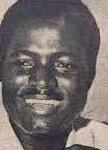
Funmilayo Ransome-Kuti
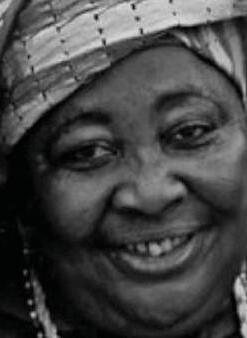
Another individual who popularly stood against the British colonial rule, demanding for the rights of citizens in the pre-independence era was Funmilayo Ransome-Kuti. As a revolutionist, she was known to have used her influence to mobilise women and organise resistance against colonialism at the time, earning her the moniker “Lioness of Lisabi”.
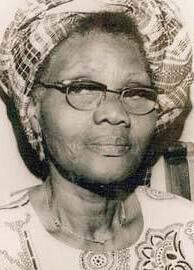
One of such moments was when the colonial officers refused to give permits for demonstrations in parts of Nigeria. This did not deter Ransome-Kuti who at the time had been outspoken about some of the policies of the colonial masters, such as taxation and shutting out women in the decision-making process.
She mobilised market women for events such as picnics and festivals, and, in 1953, organised a conference in Abeokuta to discuss women’s welfare. The gathering gave birth to a women’s group known as the Federation of Nigerian Women’s Societies (FNWS), which set out to fight for women’s rights against all odds. Mrs. Ransome-Kuti equally had renowned offspring such as Prof. Olikoye Ransome Kuti, Prof. Beko Ransome Kuti, Afro Beat Super Star, Fela Anikulapo Kuti who were all activists.
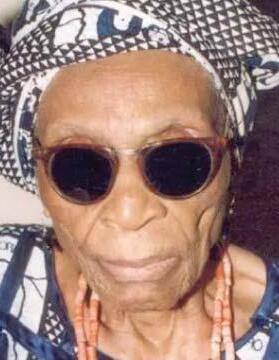
Margret Ekpo
In the pre-independence Nigeria and beyond, Margaret Ekpo stood out as as a political icon who lived her life fighting for women’s rights and the recognition of the place of women in politics. Aside from being a women’s rights activist, Ekpo was also a social mobiliser and grassroots politician who was never intimidated by the men who dominated the politician scene at the time.
In the 1940s, she was known to attend political and activists’ meetings to discuss the colonial master’s maladministration in place of John Ekpo, her husband, who, like other Nigerian medical doctors, detested how they were being treated, but could not attend such gatherings because of his work as a civil servant.
In fighting for the right of women and their unjust treatment by the colonial masters, Ekpo registered with the National Council of Nigeria and the Cameroons (NCNC) and, in the years that followed, joined forces with the likes of Ransome-Kuti in mobilising women to become more involved in politics. In 1953, she was nominated by the NCNC to the regional house of chiefs and in the following year, established a pressure group known as the Aba Township Women’s Association.
Hajia Gambo Sawaba
She was from Northern Nigeria whose fame rose as a women’s rights activist, politician and philanthropist. Enveloped with a spirit of activism, she was mentored by Funmilayo Ransome-Kuti and travelled to meet her in Abeokuta years later. She was widely regarded as the pioneer of fighting for the liberation of northern women. During her political journey, Hajia Sambo served as the deputy chairman of Great Nigeria People’s Party and elected leader of the national women’s wing of Northern Element Progressive Union (NEPU). Gambo had the support of the traditional rulers (the Emirs and British Colonial Authority). She was a campaigner against under-aged marriages, forced labour and an advocated for western education in the north. Gambo made a name for herself when at a political lecture during her career in the North, she climbed up and spoke out in a room full of men.
COVER 61 THISDAY, THE SUNDAY NEWSPAPER OCTOBER 1, 2023
Tarka
Fani-Kayode
ImoduRansome-Kuti
Ekpo Sawaba
HighLife
For Tony Elumelu, Training the Youth is the Best Legacy
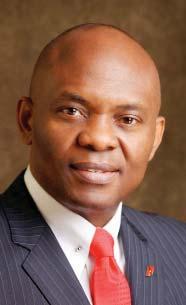
Even for a business supreme master like Tony Elumelu, raising the next generation to surpass the current is no easy task. However, seeing as no task is too daunting to discourage attempts, Elumelu continues to do his best, leaving onlookers to decide that this must be his legacy in this world.
Those days are here again for Elumelu to provide the ladder-steps for others to ascend to greatness. Like other times, Elumelu is not alone with his foremost training establishment, the Tony Elumelu Foundation (TEF). Yes, he has obtained the help of two mega organizations, all with the aim of training Africa’s young generation and empowering them with the necessary skills to stand out in the years to come.
The mega organizations that solidified their ties with Elumelu in the form of contributing resources to train African youths are none other than UNICEF’s Generation Unlimited (GenU) and IKEA Foundation. With the partnership formed between these organizations and Elumelu’s TEF, the Green Entrepreneurship Programme has come into being with the principal aim of helping Africans deal with climate change matters.
Based on the information so far available to the public, the Green Entrepreneurship Programme will serve a cardinal purpose in assisting Africans better manage the changes to the natural environment. These changes include climate change, biodiversity loss, and resource scarcity. With such a noble aim in view, African youths stand the chance of landing eminent job opportunities which will let them consolidate the foundations of entrepreneurship that Elemulu has been laying for many years now.
Without question, Elumelu’s contributions cannot be explained away in a few pages. Bearing in mind the many initiatives he has designed to spur the spirit of innovation and entrepreneurship among African youths, it would be nothing short of impossible that the next generation of Africans would be lacking.
Yes, with Elumelu, it is almost guaranteed that the future will be green, happy, and sustainable. All of this is within expectations because it is based on the training of young minds, the legacy of Elumelu.
Sustainable economic development is the goal of every nation on the earth today. But such a goal is driven and achieved by capable minds. In Nigeria, all eyes are on
with KAYODE ALFRED 08116759807, E-mail: kayflex2@yahoo.com
...Amazing lifestyles of Nigeria’s rich and famous

All Eyes on Yemi Cardoso
Dr. Olayemi Cardoso, the newly confirmed Governor of the Central Bank of Nigeria (CBN). Given the matters at hand, Cardoso has much to handle.
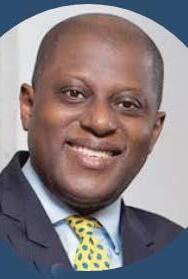
Naira matters are never straightforward, but Cardoso has to do his utmost best to meet the expectations of Nigerians everywhere. This is the general sentiment from the public regarding the Senate’s confirmation of Cardoso’s nomination as CBN governor. However, this sentiment indicates some concern regarding Cardoso’s capabilities within the framework of Nigeria’s economic predicament.
It seems that the main impediment to the public having a positive image of Cardoso’s capabilities is the fact that there are perceived issues with CBN’s integrity. Owing to the circumstances that saw the former governor, Godwin Emefiele, out of office, Nigerians are not keen on trusting the institution to uphold integrity and transparency.
Thus, Cardoso has to think up ways to engage the public, reassuring them of his
determination to serve the nation without ulterior motives. Once he accomplishes this, he can resolve the problem of inflation and the unreasonable up-and-down movements of product and service prices all over the nation.
There is also the issue of debt management to consider. The average Nigerian thinks that the nation is wallowing in debits and unable to go from red to blue in its balance sheets. But others know that the country is blessed, overflowing with potential, and only needs the nudge of a competent mind.
To be sure, Cardoso has sufficient training to stir the waves. With a reliable academic profile and a fat career portfolio depicting his time at Citibank, Ehingbeti Summit, and Harvard Kennedy School, to name a few, many Nigerians are hopeful that something positive will come out of his leadership at the apex banking institution.
Ultimately, all eyes are on Cardoso. If he manages to tie up some of the loose ends by December, the nation will celebrate him ceaselessly.
Oghogho Osula: Imprints of an Amazon at 54
Describing a woman as an amazon indicates that she is the leading protagonist in the bracket of brave and strong women. But Lady Oghogho Osula, the beautiful wife of luxury king, Julian Osula, is just such a person. Given her achievements at the young age of 54, it is no surprise that she is greatly adored by all who know her.
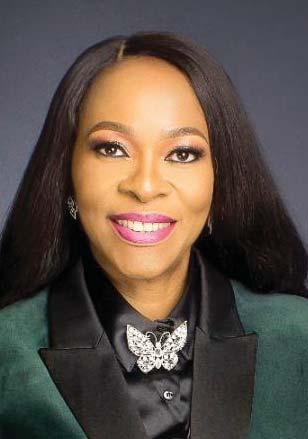
No great person arrives on the social scene as an iconic figure. Lady Oghogho is no exception. The fame she has today was established over a towering pillar of blood, sweat, and tears. However, given her present status, it is clear that her exertions produced sought-after outcomes, the kind that others can only dream of in their dreams.
Others may not know, but those who admire Lady Oghogho know that her career is a long and sturdy train of corporate exploits. The one that introduced her to Nigerians is that of Citibank back in the late ‘90s where she served as the bank’s Executive Banking Officer.
Back then, at Citibank, Lady Oghogho worked under the supervision of Yemi Cardoso, the new Governor of
the Central Bank of Nigeria (CBN). Bearing in mind the stringent standards of Cardoso and his celebrated work ethic, it is revealing that Lady Oghogho thrived as his subordinate.
But why not? After all, Lady Oghogho has always stood at the pinnacle of her work. Even tracing her academic trail, one is led into a large hall with distinctions from one end of the wall to another. The most recent of these distinctions was presented by Lagos Business School, and it recognized Lady Oghogho as the Best Graduating Student (2017/2018), the same recognition she got in 1989 upon completing her B.Sc. degree in Business Administration.
At 54, Lady Oghogho comes heavily recommended. An engaged and committed finance professional, her goal and motivation is excellence in all ramifications. At this point, she has already achieved much but still intends to maintain her winning streak. Considering her history, she can go on leading the pack as amazon extraordinaire.
For Sholape Seriki, the Pain is Over
Life can be an endless stream of heart-stirring moments one instant and transform into billows of sadness and grief in the next. This is something that Princess Sholape Demola-Seriki, the wife of the late Chief Ademola Seriki, understands. But the pain is nearing its end for her, and the sun has begun to shine.
Princess Sholape is in a positive mood at this time. For those who pay close attention to her movements, it has been a while since the elegant lady opened up her heart to feel the stirring of the flowers and harbour the blessings of happiness. But this is one of the advantages of birthdays, each one reminding us of a future uncharted and a past unreachable.
Indeed, it is the first birthday celebration for Princess Sholape since the demise of her husband. Formerly heartbroken at his passage, the elegant lady could not summon up the courage to peer at the same world she used to see through her husband’s eyes. However, time heals
some wounds and reduces the pain for others.
By every indication, Princess Sholape’s case is the latter. After all, it has been almost a whole year since the prominent politician, businessman, teacher, and public administrator left this side of life for the other. Agitating the emotions of Nigerians everywhere, the former Ambassador of Nigeria to Spain left a gap that could not be filled by any other person in the life of his wife, Princess Sholape.
But the Demola-Seriki family is fortunate that Princess Sholape is no ordinary woman. Although it cannot be said that she is entirely free of the shadows of her late husband’s absence, it is clear that she has braced herself to experience life anew. In her own words, it was a choice between making substance of the situation or breaking.
For Princess Sholape, birthdays are a reminder that there is still colour to this life.
62 THISDAY, THE SUNDAY NEWSPAPER OCTOBER 1, 2023
Osula
Cardoso
Seriki
Elumelu
BOLA TINUBU: ARE YOU FIT AND PROPER?
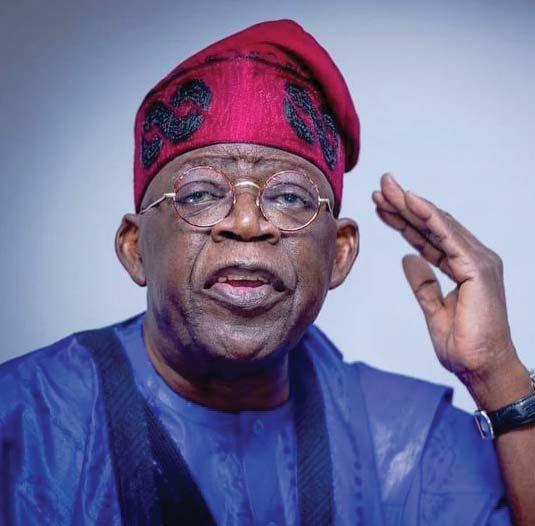
For me, this is the missing point. Nobody seems to be asking this question as the ongoing drama playing out in a Chicago court ensues. Those days when we just came to Lagos, looking for jobs in banks, they will all be shouting integrity, character. I am very surprised that today, these same people like Wale Edun, who would not employ you in their investment banks if there was a glitch in your character, are today the champions in this spectacle.
Where is the term “fit and proper” in our political lexicon? It appears that it has been thrown into the dustbin as we continue to battle with a huge moral deficit that seems to have taken us down the route of infamy. All these things we have been hearing from reports in that Chicago court is making me want to cry – do not release my reports because it will cause me irreparable damage, please
release but do not reveal my gender- all these reports we have been seeing are saddening. Really saddening, where is the fit and proper that we used to ask for in choosing leaders? Where is the integrity quotient in all of these? Don’t we know that with such a “browned” personal integrity quotient, impeccable leadership is near impossible? What we fail to realise is that a “compromised leader” will find it almost very impossible to lead; he would be ostracised by the committee of leaders and really not pulled in, thereby making strategic inroads in search for sup port and partnerships will be extremely difficult. Shebi Biden is reported to have refused to see us, shebi it is the tiny NASDAQ that we are ringing when the far more strategic NYSE is sitting there with DJ Cuppy ringing that bell.
Nigeria ronu ooooo!!!
SEGUN AWOLOWO’S UNBLEMISHED HERITAGE
Mr. Segun Awolowo during the week celebrated his 60th birthday. It was a warm cosy close family affair but I got invited. I entered the beautiful home with a huge caricature of the man and met his ever beautiful mother, Hajia Abba Folawiyo and Mrs. Bola Shagaya. While I was there, Senator Ita-Giwa, fresh from her fight with my brother, Donald Duke, came in. She looked as elegant as usual and immediately started engaging me on the matter. Since it was Segun’s birthday, I parlayed the talk and moved towards the celebrant.
The work that he has done with the Export Promotion Council and with the ECOWAS Trade group continues to point him out as a leader to watch.


Congrats and happy birthday my Lord.
NLC ON THE MARCH AGAIN
These ones have started again. They have declared October 3 as the day they will shut down the country. Shebi when they kuku finish what is left of the economy, everybody will go and rest. I have shouted severally that this colonial tactic no longer works and this is why all the warning strikes and threats continue to be met with impunity.
You see, the NLC and their partners really do not understand the issues. The government is staring at a bankrupt stand and can no longer meet up with the obligations needed to keep fuel prices at sane levels. The so-called palliatives are nothing but a joke. So, what is N8,000 per person or three cups of garri and rice when inflation is galloping leading to job losses and increase in poverty levels.
What palliatives is the NLC expecting the government to implement that will be all encompassing and remedy the situation, even though the government too is behaving like
drunken sailors. Abi, how do you explain the size of the government, the cost of governance and the ill-advised statements like the National Assembly being quoted as saying that they had no expenses to cut since they were not the ones who caused the problem in the first place. The NLC instead of “shutting” down the nation, should look at other strategic initiatives with which they could make the government to see better reasons with them. But by doing so, they must come to terms with a leadership lacking in moral leadership and as such would pander to the narrow interest of those propping them up. Interests that may not be in tandem with the general interest of the people. This is really a tough one.
OLAYEMI CARDOSO: SOLUDO MUST GO
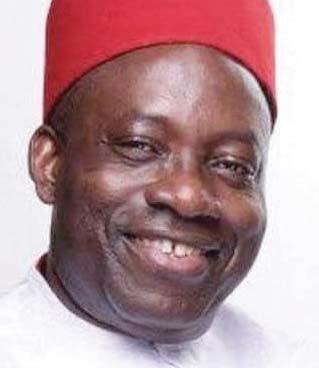
You know, when you read the old masters, you just shake your head. I just finished reading Debo Sobowale’s article where he was trying to advise the just confirmed CBN Governor, Mr. Olayemi Cardoso. In the article, he reminded him that he had “yabbed” five CBN Governors and that Mr. Cardoso would be the second CBN Governor from the Isale Eko quarters where they all come from, with Ola Vincent being the first. He reminded him of how he kicked against the dual exchange rate that was instituted during the Abacha regime which got him arrested and detained. But the one that got me laughing was how he treated my brother Charles Soludo. He started by saying that Nigeria was blessed with three very controversial CBN Governors “lera lera” –that is what Yoruba people call back to back. He said that a lot of scholars don’t like talking about Soludo’s term beyond the consolidation. That immediately he achieved that by pruning down the banks to a manageable level, the whole thing fell off claiming that it was the
“speed” of implementation that led to that. He now regaled us with a very funny story. He told us of Soludo announcing a policy that would have seen the highest denomination of the Naira to be N100 and according to him, billionaires will now be millionaires and so forth. He said, the then President Yar’Adua just got a call from someone in Kano and that was it for Soludo. Me, I did not see the head or tail of how these stories would help Mr. Cardoso in his new task, I however just felt that I should give you guys the gist here in case you missed it. But for me, looking towards Mr. Cardoso for a solution to this crisis, is where we all are making the mistake. The ministers in charge of petroleum, defence and solid minerals and agriculture are better placed to solve this problem than Mr. Cardoso who does not earn dollars but just appropriates it.
WHY AJURI NGELALE NEEDS TO STEP UP
What we are seeing right now is more than initial job jitters but a major car crash. This young man doesn’t seem to have the maturity or clarity to handle the very sensitive job that has been thrust on his young shoulders. The gaffes have attained international proportions and the apologies and clarifications are becoming just too much. From the Emirate gaffe to the NASDAQ gaffe, the man just needs to stop embarrassing the government. It is no wonder that the Nigerian Institute of Public Relations is pulling his hair. They claim that he is not a trained PR practitioner and that it is even criminal to be practising the profession without necessary qualifications and education.

The NIPR position is very glaring for all to see. Can I advise that the young man should enrol in one quick part-time course or evening
school or even go to the National Open University and do a quick one so that his performance would improve because this one that we are seeing so na “bolekaja” spokesmanship o.
WIKE AND GBAJABIAMILA IN THE KITCHEN
Let’s laugh a little bit. If you have not seen the video of the Minister of the FCT, the gregarious and very colourful Nyesom Wike in his kitchen cooking with the greatest Chief of Staff to the President peering over his shoulder with long throat, then you should quickly send me data so I send to you before they delete it.
I don’t know how this one happened. Not sure if Gbaja stumbled in the kitchen and met Wike on duty or that he was invited to come and watch Lord Wike practise cooking before he enters the Big Brother house. Whatever the case was, we saw Gbaja stretching his neck and most likely salivating as chef Wike went about with his cooking. It was definitely not afang that Wike was cooking since I didn’t see the okazi leaves nor the periwinkles needed to make that globally accepted dish but whatever it was, Gbaja looked like he couldn’t wait to taste the dish. Wike on his part was looking very serious on the job. It’s like madam had made sure he learnt that thing since all of those late night political meetings would have really dragged her to the point of frustration, making her decide to teach oga how to cook. So now Oga has become a culinary expert almost to the level of Chef Hilda Baci. When I finally meet Gbaja, I will ask him how the experience was. Meanwhile, let me quickly remind them that while they were spending precious time in the kitchen, dollar has reached N1,000 o.
THISDAY, THE SUNDAY NEWSPAPER OCTOBER 1, 2023 63
LOUD WHISPERS with JOSEPH EDGAR (09095325791)
Soludo
Ngelale Ajaero Awolowo
The Return of Gilbert Chagoury
Gilbert Chagoury, a business magnate of Lebanese descent, was an all-powerful figure in the Nigerian business climate. His phenomenal influence started during the late General Sani Abacha era but it peaked during the President Goodluck Jonathan-led government.
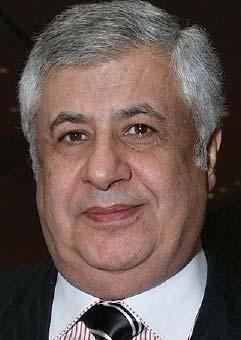
During that time, Chagoury, alongside his brother, Ronald, was effervescent. They were not only stupendously and monstrously wealthy, but also titans who command a staggering fortune. The influence of the Chagourys transcends a single sector. They have their hands in so many pies, such as oil and gas, construction, manufacturing, and agriculture, among several others.
The group’s net worth, according to Forbes, is about $4.2 billion. The Chagoury brothers own the prestigious Eko Hotel & Suites, Hitech Construction Company and ITB Construction Limited. They are also behind the over $6 billion Eko Atlantic project, which is an entirely reclaimed coastal city built also in the upmarket Victoria Island area of Lagos and is reserved exclusively for high net-worth individuals and corporate entities, including some embassies. Its grand cheerleaders boast that on completion, the new Eko Atlantic would match that of New York’s Manhattan Island.
They were not only close to the Abacha and Jonathan families but also chummy with many other socialites, celebrities and power brokers. The two brothers also built a reputation as giants of global philanthropy, and are among Africa’s
Siju Iluyomade Celebrates Mum at 90
It will be a glorious moment as Dr Siju Iluyomade, the convener of Arise Women draws the high and mighty in Nigeria and beyond to celebrate the 90th birthday of her mother on Monday, October 2, 2023.
The British-trained nonagenarian, Mrs Henrietta Adejumo, who has been a source of inspiration to many since her active days, will be celebrated memorably at the epoch-making event, with family, friends, clergymen, top business and government functionaries in attendance at the banquet hall of the prestigious Eko Hotel & Suite, Victoria Island, Lagos.
The reception will be preceded by a church service at the Cathedral Church of Christ, Marina.
The hardworking Mrs Adejumo is noted for her gesture in providing healthcare centres and exceptional healthcare services in factories during her active days.
This indelible trait of hers is exemplary of her daughter, Iluyomade, whose all-round efforts in contributing to the development of Nigeria, through several humanitarian schemes, are also noteworthy.
Mrs. Adejumo’s love for creating accessible healthcare for the less privileged was passionate. Her efforts also ensured good parenthood, especially for women by taking her campaign to the marketplace to educate more people, thereby preventing maternal death, stillbirth and loss of newborns.
Ejindu
“Those we love don’t go away. Unseen, unheard, but always near; still loved, still missed and very dear.”
Family and friends of the late former minister, Funke Adedoyin have proven the truism of this popular quote by an unknown author. Many of her family members, friends and those who had crossed paths with Ms Adedoyin literally cried out their hearts five years ago when she died.
Amidst the plaintive ambience, tributes poured in torrents from those who came to pay their last respects to the former federal lawmaker. Though they have all been forced to resign to fate, they still hold dear her good memories. Last week, the former minister was remembered by her family members, friends and political associates.
As gathered by Society Watch, the late socialite, businesswoman and politician


richest men with generous donations to charitable projects around the world. Their philanthropic endeavours earned them respect and recognition.
That was the situation until power changed hands in Nigeria in 2015. They mellowed for some time and recoiled into their cocoon before Gilbert finally left Nigeria.
It was alleged back then that the main reason Gilbert fled from Nigeria was because they supported the former President, Jonathan. They were allegedly said to have splashed a huge sum of money in support of the then incumbent President Jonathan against his rival, Buhari, but the turnout of the result of that election shook Gilbert, who couldn’t predict what would become of them with the new sheriff in town.
They opted to stay away to avoid having problems with the new administration. Gilbert was said to have made the US his initial new abode while his immediate younger brother, Ronald held forte in Nigeria, overseeing all the multi-billion dollar investments and projects scattered across Nigeria.
The billionaire was then shuttling to London, Beirut and Dubai to attend to business concerns personally until recently when he finally settled for Paris as his new base.
Although they returned briefly to the spotlight in April 2020 when they significantly boosted Nigeria’s fight against the spread of the deadly coronavirus pandemic with the donation of N1 billion to the Lagos State government, they were never involved in any known business.
The Cross River State-born architect, Fifi Ejindu has once again proven that she belongs to the class of fine brains that are well respected in the nation’s business climate.
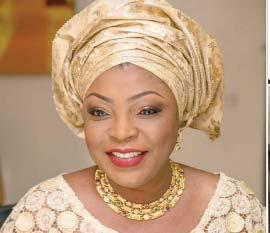
Society Watch gathered that the beautiful woman again has won yet another award. It was revealed that she won an award as an Iconic Female Entrepreneur of the Year, 2023. The award was
again was celebrated with tributes in many newspaper adverts by her loved ones.
In one of the paid adverts, she was glowingly celebrated and eulogised in an emotionally laden poem.
They wrote: “In cherished memory, your light still gleams, our dear Olufunky, in our hearts, in our dreams. With kindness and love, you graced our days, leaving an imprint that forever stays. Your laughter, your wisdom, a guiding star, in the tapestry of our lives, you are never far. Though you’ve departed from this earthly space, your spirit lives on in each embrace. Through laughter and tears, you were always there, Olufunke of compassion, beyond compare.
“In our hearts, your legacy remains, forever remembered, amidst life’s joys and pains. In the garden of memories, you’ll forever bloom, Olufunke so dear, in our
However, shortly after Bola Tinubu won the February 25 presidential election, he allegedly had a meeting with Gilbert in Paris. It sounded like a rumour then, but the truth is beginning to come into the open with the current news in circulation.
It is alleged that Gilbert has been chosen to undertake a colossal project - the LagosCalabar Coastal Highway. He has been tasked with transforming this vision into reality through his subsidiary, Hitech Road Construction Company.
organised by the founder of Democracy Heroes Award Africa 2023.
It was further revealed that the award ceremony would be held on Wednesday, October 18, 2023, at the Congress Hall of the prestigious Transcorp Hilton Hotel, Abuja, where the gold star would be bestowed on her.
hearts, there’s no gloom. With gratitude and love, we’ll always impart the indelible mark of your beautiful heart.”
It is a known fact that the businessman is fast becoming the recurring decimal in the fintech sector. Many in the industry across the shores of Africa have given thumbs up to his company, while also acknowledging his ingenuity.
In the last seven years, Agboola’s Flutterwave has recorded significant milestones in its journey to the top within the African tech ecosystem and secured investments from renowned venture capital firms and forged strategic partnerships with industry giants.
As one of the leading tech entrepreneurs in Africa, Agboola has built one of the continent’s most prominent tech brands.
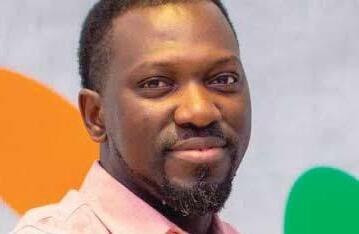
He has also led the firm to provide customers and businesses in Africa and other developing markets with unlimited possibilities leveraging technology’s rapid adoption. The fintech firm’s remarkable growth trajectory has not gone unnoticed, as it is now considering an initial public offering on the NASDAQ Exchange.
Interestingly, despite his great
accomplishments, one can say that Agboola is an evolving story waiting to be told. Since he started as a businessman, he has continued to ply his trade in such a way that makes many of his competitors green with envy. The young man was one of the select investors who accompanied President Bola Tinubu to India for the just concluded G20 Summit.
Just like a man destined for greatness, he has started reaping an instant fruit from the trip, as he successfully sealed a deal to expand his company’s reach to India. He announced a significant collaboration with IndusInd Bank Limited, one of India’s leading financial services providers catering to about 35 million customers. The partnership is a giant leap for Agboola and Flutterwave, this would further broaden his global footprint and streamline cross-border remittances and solidify his feet as a world recognised businessman.
THISDAY, THE SUNDAY NEWSPAPER OCTOBER 1, 2023 64 SOCIETY WATCH Adebayo Adeoye bayoolunla@gmail.com; 08054680651 Fifi Ejindu’s
New Gold Star
Late Funke Adedoyin Memory Lives On… Flutterwave Boss, Olugbenga Agboola’s Giant Leaps Late Adedoyin
Agboola
Chagoury
Iluyomade
Olugbenga Agboola, since he co-founded the company with his partner, Iyinoluwa Aboyeji in 2016, has become a dominant force in the African tech ecosystem, earning a reputation as one of the continent’s most influential and wealthy tech entrepreneurs. His visionary leadership as CEO has transformed the tech unicorn with a staggering $3 billion valuation into a powerhouse in the African fintech space.
ARTS & REVIEW ARTS & REVIEW
A Quartet’s Graphic Tales of a Nation in Throes of Despair
Acollection of petrol jerrycans adorns the gallery walls, as does a section directly facing the entrance. These prepare the viewer for what to expect at this protest art exhibition, titled JE-KA-MI.
The exhibition’s title derives from the Yoruba expression for “Let us breathe,” an allusion to a viral comment made by President Bola Ahmed Tinubu saying “Let the poor breathe.”
Echoing the groans of many Nigerians

Adebule, Tumininun Gbebire, Peter Okotor, of Nigeria’s economic challenges in a way that resonates with average income earnaim of amplifying the voices of Nigerians on the clamour for favourable economic conditions.
For these artists, the rising fuel prices and the weakening of the local currency against the dollar are only the entry points to the as procuring expensive fuel, paying for electricity bills, and other daily essentials. For Tumininu Gbebire, the situation in Nigeria requires urgent attention. Using the jerry cans as a collage, she articulates her thoughts using newsprint pasted on each fuel can. “I personally like to tell stories with my art as a painter,” she says. “I thought it would be very interesting to tell stories through a collage. The newspapers are them together to create a message while creating jokes out of it.”
On how the hike in fuel prices directly she often works at night when the natural light is gone. Due to frequent power outages, she is forced to buy fuel at N20,000,
which used to cost her only N5,000 before the increase. Aside from that, art materials have become more expensive, making her wonder how young artists from low-income households would cope in the absence of government funding for the arts.
The exhibition, according to Mathew Oyedele, a co-curator and additional artist, is intended to spark important discussions about how to
than plunging into deeper levels of poverty. He explains how the sound installation at the concert emphasises the message of national concern using subtly humorous components. The show’s satirical tone is created via a mash-up of popular sounds taken from the president’s popular speeches. On September 17, when the exhibition opened, a corn vendor set up
shop outside the gallery, parodying the president’s mention of maize in one of his widely shared campaign speeches. The entire body of art, according to Oyedele, is “provocative.”
“In this piece called ‘Family Photo,’ we are using the jerrycans as the representatives of the family because, if you look at it, in almost every home in Nigeria, there is a jerrycan for fuel. We are bringing all elements together to be like a family. The
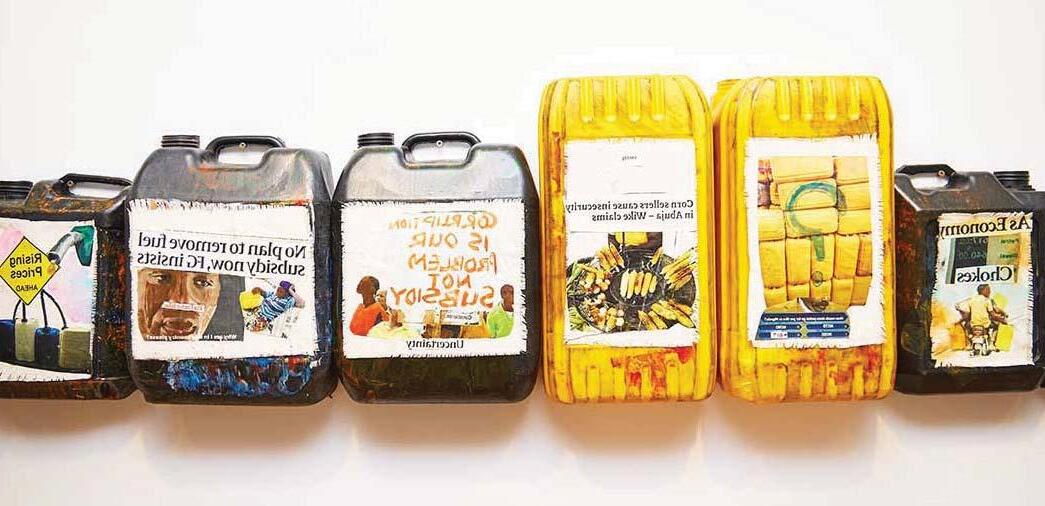
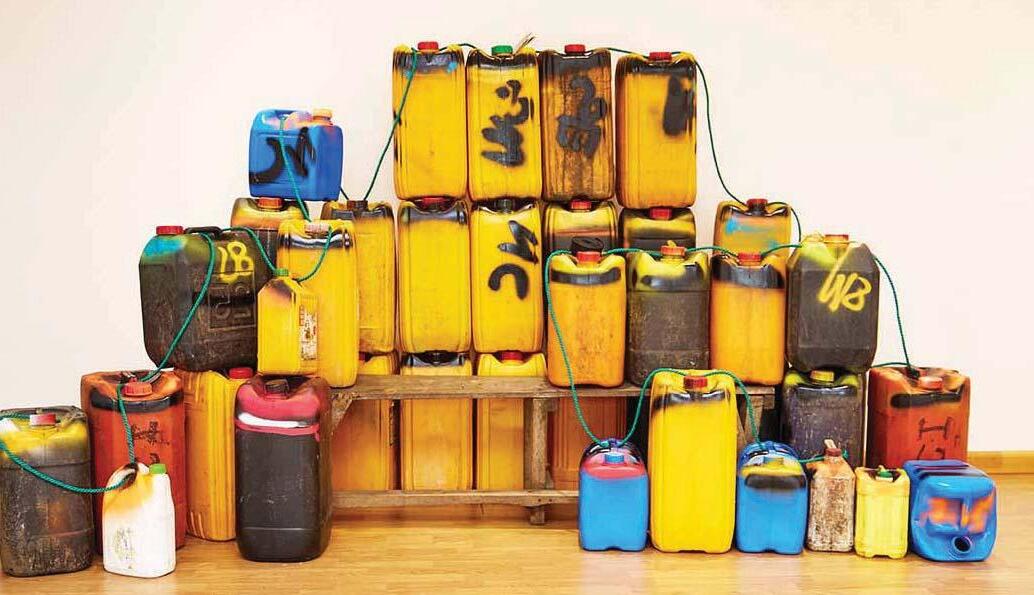
time that the fuel subsidy was removed, the price of everything else went up, from tomatoes to transportation. The income you are receiving seems not to be enough for
The exhibition, which runs until October 8, also preserves cultural memory with the installation titled “Up NEPA.” By assembling some old electric metres, unpaid bills, copies of electricity bills rolled into dangling plastic bottles, and a list of
neighbours who are indebted to the power company, the artists carefully document a vivid account of living in Nigeria before the advent of pre-paid metres and the historic transition to the digital electricity billing system. Using everyday articles, the artists present a coherent story of hardship and survival woven through the parody of a fuel station. With a gallery manager dressed in a branded white shirt that replicates a fuel attendant’s type, the show paints a true picture of daily reality.
As for the founder of Galari, Tobi Adegbile, the show is the product of several brainstorming sessions with other artists of varying specialties with the same passion for socio-political change. Drawing attention to the justice scale and the fuel dispenser pump, dollar-to-naira rate and the impact on the quality of life of every Nigerian.
price hike. The idea of the justice scale is to show how the dollar is the determining factor in our economy. In just three years, we went from N260 to N900 to a dollar. Those were the ideas that inspired the justice scale.”
Those postcard-sized images may not have allowed the audience to be engulfed in emotion too deeply, but they speed through this photographic series, the artists recount episodes of the daily struggles of Nigerians as they commute to their places of work and residence. Indeed, the strength of the collective lies in its ability to poke fun at the oddity of being a Nigerian by inviting visitors to the gallery to pose with the installation of used fuel kegs and spray paints arranged in a pyramid of sorts, daring each one to put on a brave smile like ‘Sizwe Bansi.’
THISDAY, THE SUNDAY NEWSPAPER JUNE 24 2012
A PUBLICATION 1. 10. 2023
EDITOR OKECHUKWU UWAEZUOKE/ okechukwu.uwaezuoke@thisdaylive.com
Four artists rail against the alarming rate of inflation and the burden of survival in Nigeria in an exhibition in a Lagos-based gallery. Yinka Olatunbosun reports
An installation of jerrycans facing the entrance way to the exhibition hall
A display of fuel cans with newspaper collages on one of the exhibition hall's wall
Nigeria’s Foreign Policy @ 63 and Tinubuplomacy: From Self-Assertion to Non-Assertion
Today marks Nigeria’s 63 years of sovereign existence and post-independence anniversary. Three scores in the life of any human being, especially in Nigeria where the official retirement age is either attainment of 35 years of service or sixty years of age is important. While the Holy Bible talks about three scores plus ten for retirement from active life that is free from health challenges, it is three scores plus three for Nigeria today. The first sixty years have not been quite healthy.
The 63rd anniversary of Nigeria’s independence is particularly significant for one major reason: unlike previous independence celebrations, the 63rd anniversary is unnecessarily fraught with too many controversies and challenges. There are the threats of indefinite strike by the labour unions, removal of oil subsidy and its aftermath, crisis of election legitimacy, chairmanship of the ECOWAS and military intervention in Niger Republic, President Bola Ahmed Tinubu (PBAT) and Nigeria’s relationship with France, and perhaps most disturbingly, the inclement environment of living in Nigeria, etc. Cost of fuelling vehicles, high inflation, oil thieves, armed banditry, Boko Haram and Al Qaeda terrorism are also pointers to political instability which invited-foreign investors cannot but consider in coming to Nigeria to invest.
Without any whiff of doubt, life in 1960 was quite better than life in Nigeria as at today. In terms of foreign policy, Nigeria was very assertive and internationally well respected as at then. In fact, even before independence, Prime Minister Abubakar Tafawa Balewa, made very clear what Nigeria’s policy attitude towards France would be after the scheduled independence of Nigeria. Foreign policy direction was well articulated on August 20, 1960 and further re-emphasised on October 7, 1960 when Nigeria was admitted as the 99th Member of the United Nations. Today, the self-assertiveness has been thrown into the garbage of history. The status of being a giant and leader of Africa is under increasing threats. In fact, allegations of Nigeria under PBAT being a puppet of the great powers, especially of France, is the current controversy.
Manifestations of Self-Assertion
The manifestations of self-assertion in foreign policy are variegated in character. First was Nigeria’s diplomatic protest against French atomic tests in the Reggane area of the Sahara desert. The protest led to rupture of diplomatic ties on January 5, 1961. Diplomatic ties would not be restored until 1966. Even though France blocked Nigeria’s application to become an Associate Member of the then European Economic Community, Nigeria took much pride in her self-perception as African and Black leader. This was self-assertion.
Secondly, in 1963, Nigeria not only formulated exceptions to the UN principle of non-intervention as contained in Article 2(7) of the UN Charter, but also adopted the policy of ‘No Compromise with Apartheid.’ Nigeria made it clear that she could not stand by as an observer to watch very friendly and brotherly country like Togo to be mistreated in a coup originated by France and where the President, Sylvanus Olympio, would be brutally assassinated without reactive intervention. This was self-assertion.
Thirdly, when Nigeria’s civil war broke out in 1967, the Gowonian government sought to buy weapons from the United Kingdom and the United States but the request was turned down. Gowon simply turned to the Soviet Union. The Soviet Union not only quickly responded and supplied the needed weapons, but also gave active support to Nigeria during the entire struggle of Nigeria against disintegration. This situation quickly prompted the United Kingdom and the United States to review their policy attitude and to accept to sell weapons to Nigeria. The major dynamic of revisiting their policy might not be unconnected to the position of France who was generally acting on behalf of the West and particularly the NATO countries in Africa. Besides, France was then also supporting the carving out of a Biafran Republic from the Federation of Nigeria. There was also the factor of the Cold War power rivalry. Perhaps more significantly on this point is the fact that, at the end of the civil war on January 12, 1970, France offered to assist Nigeria, but the Gowonian government
rejected the offer and explained that there was no victor and no vanquished. In fact, the relationship between Nigeria and France that was predicated on dichotomy (political disagreement but economic cooperation) during the war simply continued. This, again, was manifestation of self-assertion.
Fourthly, the fact that General Olusegun Obasanjo nationalised the assets of the British Petroleum in 1979 and by so doing, denying it about 9% of its global crude oil supplies is self-assertion.
The British Petroleum (BP) became was first renamed Beyond Petroleum (BP) in the United Kingdom. In the same vein, the assets of the Barclays Bank DCO (Dominion, Colonial, and Overseas), which was incorporated in 1969 in Nigeria, were also nationalised in 1977 and renamed Barclays Bank of Nigeria. These nationalisations, done within the framework of the 1972 and 1977 Nigerian Enterprises Promotion Decrees, were manifestations of self-assertion as a regional influential.
Additionally, General Obasanjo nationalised their assets because of Britain’s recognition and clandestine sale of Nigeria’s crude oil to the Government of Rhodesia and for transacting businesses with France, South Africa, Portugal and Libya. Fifthly, and more importantly, General Obasanjo insisted on the withdrawal of the French military from Chad. The Government of Nigeria prevented a Henry Kissingerian plane from landing in Nigeria on the basis that there was no prior clearance approval. This could not have been the crescendo of self-preservation and
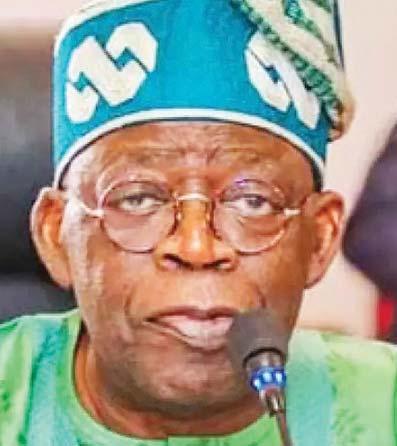
Nigeria, being a neighbour of Niger by territorial contiguity and France also being Nigeria’s neighbour by geopolitical propinquity, there is no way any destabilisation operations in Niger Republic will not adversely affect the northernmost parts of Nigeria, especially in terms of insecurity: internally displacement of people; influx of more terrorists to Nigeria; higher costs of living, etc. Beyond the bilateral considerations, the plurilateral and multilateral dimensions are more challenging. The advanced countries only want Africa to be permanently maintained as a source of raw materials for the development of Europe, contrarily to Nigeria’s policy stand adopted by Dr Okoi Arikpo under the Gowonian regime. In this regard, how does Tinubuplomacy respond to the foreign exploitation of Africa’s strategic raw materials beyond Nigeria @ 63? It has been made clear that the developed countries will not let Africa off the hook of raw materials exploitation without a big fight. Additionally, the structure of Western education and its institutions are said to have been designed to ensure stunted growth and development in Africa. A speaker during discussions on the global economic system against Africa, explained it thus: ‘let’s get clear about that, … [T]his means all the economic structures, all the global institutions and economics we teach everyone is (sic) all designed to keep Africa exactly where it is and whether it is Europe or United States or now China, it’s always the same. We need Africa to be impoverished because we need those raw materials and we need them that cheap.’ Okay, that’s the message.’
self-assertiveness under the Murtala Mohammed and Olusegun Obasanjo regime.
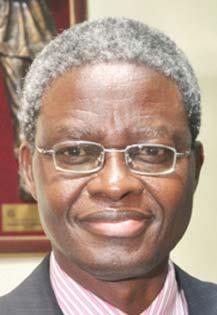
As there were many cases of self-assertion until the fourth Republic began in 1999, so have there been several manifestations of Nigeria’s decline from incline. First, there were contemplations under President Obasanjo to possible change from Africa to globalism as centrepiece of Nigeria’s foreign policy. This attempt was not favourably supported. Second, the policy of non-acceptance of foreign exploitation of Africa’s strategic resources, a major pillar of foreign policy under the General Yakubu Gowon regime has become meaningless under PBAT as ECOWAS Chairman. President Tinubu is collaborating with France in the restoration of the ousted President Mohammed Bazoum of Niger Republic. The Nigèriens want the French out of their country in order to stop the reckless exploitation of their mineral resources. By hobnobbing with France in whatever format, Nigeria is also consciously undermining her policy of protecting African strategic resources. This is most unfortunate.
Nigeria’s foreign policy has woefully failed to take advantage of the country’s soft power, especially in polishing international opinions about Nigeria. Nigeria’s international image used to be taken very seriously. Today, Nigeria is more known as a fantastically corrupt county, as a country of Boko Haramism. Whereas, in the entertainment industry, Nigeria is one of the leaders of leaders. Fourthly, Nigeria’s altruistic policies which prompted Nigeria to be adjudged as a big brother and giant are not implemented on the basis of reciprocity. Nigeria’s goodness is reciprocated with disregard and disdain. This is most unfortunate.
Fifthly, Nigeria’s Father Christmas diplomacy has always been altruistic to the detriment of Nigerian people’s interests. Foreign policy has failed to meaningfully respond to the various xenophobic attacks on Nigerians. It has not been able to even prevent such attacks in spite of the so-called establishment of bilateral commissions and strategic partnerships. Sixthly, several countries have refused to sign the nuclear non-proliferation treaty until they have perfected their nuclear agenda. France and China are on record to have refused to sign the agreement. Even countries that initially signed the accord later withdrew from it. North Korea is a case in point. Nigeria and others are only encouraged to develop nuclear capability for peaceful purposes only, but the truth is that sthe development of nuclear capability for war purposes is not different from the processes of development of nuclear capability for peaceful purposes. Many are the countries that have acquired nuclear capability with the complicity of the Nuclear Weapons States. Nigeria does not have any focus in this regard.
In most cases, the government of Nigeria before PBAT took over power only think after actions. Hardly before action, and yet, several research agencies of Government abound! It is difficult to imagine the enormous intellectual resources in the country, especially empirical resources that the Association of Retired Career Ambassadors of Nigeria (ARCAN) can provide. The ARCAN is not seriously reckoned with. Many are the departments of international relations in tertiary institutions from which well-researched positions can be sought. Professor Akinwande Bolaji Akinyemi’s idea of Concert of Medium Powers (CMP) was myopically set aside. But good enough, the BRICS took off from CMP’s philosophy of removing the factor of foreign policy dependency. Today, Nigerians are complaining about Nigeria’s non-membership of the BRICS or of G-20m because South Africa is a member of both. Nigeria has really moved from the position of incline and assertiveness to that of decline and non-assertiveness. The potential and manifest resources still exist in the country. It is the extent to which Tinubuplomacy will be designed to address the situation of foreign policy decline that is now left to be addressed on the occasion of Nigeria’s independence at 63.
Tinubuplomacy and Quo Vadis
The Ministry of Foreign Affairs (MFA), also referred to as Tafawa Balewa House, has provided a quadrilateral pillar on which Tinubuplomacy is being predicated. The MFA calls it the ‘4-D Foreign Policy Strategy.’ As explained by the MFA, the strategy ‘is to reinforce Nigeria’s position as a leader in Africa; enhance its influence globally; maximise opportunities through strategic autonomy; drive major multilateral reforms; and foster improved national security, trade and investments.’
The 4-D foreign diplomacy strategy is comprised of Democracy, Demography, Diaspora, and Development. As presented, the ultimate strategic objective is to achieve sustainable development. Democracy, Demography and Diaspora are nothing more than tactical instruments of attaining the objective of sustainable development. These are elements of tactical strategy and should not be confused with programmatic strategy.
Put differently, programmatic strategy is about strategic calculations. In this regard, democracy should be proactive and expected ‘to end conflict in sub-Saharan Africa, where democratically elected governments have been toppled by military putschists and the threat of a domino effect that it could topple even more looms. In other words, the promotion of democracy can assist in making coups d’état unattractive. However, based on the empirical cases of coups in Mali, Burkina Faso, Niger Republic and Gabon, coups d’état are also instruments of democracy, self-liberation from foreign exploitation, self-reliancism and assertion of national sovereignty.
Read full article online - www.thisdaylive.com
INTERNATIONAL 66 THISDAY, THE SUNDAY NEWSPAPER OCTOBER 1, 2023 Telephone : 0807-688-2846 e-mail: bolyttag@yahoo.com Bola A. Akinterinwa VIE INTERNATIONALE with
Tinubu
“ “

SUNDAY OCTOBER 1, 2023 • THISDAY 67
The Owerri Consensus
On a number of occasions, I have felt the irresistible pull of homeland. Maybe it is the subliminal summons of my ancestors or the pull of my birth chord long buried beneath that immortal kola nut tree at the backyard of what used to be my mother’s hut. When in Nigeria and I feel that homeward call, it is time to head east and reconnect with the unconscious urging of ancestry. The departure of loved ones has made that homeward visitation fewer in recent years.
I am a Nigerian by nationality. My deep green passport says it all to outsiders. Once out there, I take the humiliations that passport attracts with dignified forbearance. (“Please step aside; this way, please!”). But I am originally Igbo. Since I am seven years older than independent Nigeria, I am Igbo before I became a Nigerian. My order of belongings follows that logic.
As I keep telling younger fellow Nigerians and my children, I belong to a lucky minority of Nigerians who have borne the citizenship of many countries while living in one. I have been a British colonial subject, citizen of independent Federation of Nigeria, citizen of Federal Republic of Nigeria (1963 onwards), citizen of Republic of Biafra (1967-70) and back to citizen of Federal Republic of Nigeria. I and my generation have been ferretted back and forth by the dizzying frenzy of Nigerian history up to this point of habitual regrets and nostalgic reflections in old age.
This past week, homeland called. I answered unconditionally along with an impressive array of home based and diaspora Igbos from as far afield as Australia, United States, United Kingdom, South Africa, United Arab Emirates and even unlikely places like the Pacific Island of Fiji. We gathered in Owerri for a Summit of the peoples of the South East of Nigeria. I do not like the description of South East. It is a geo location, a direction on the Nigerian national compass. Maybe a dog tag to identify a known Nigerian sub- set.
Since everyone from the Nigerian South East happens to be Igbo, I prefer to say that the Owerri Summit was a homecoming of Igbo sons and daughters for an urgent purpose. Our ancient wisdom holds that it is the unusual that forces nocturnal animals to scamper in a hurry by day time. And when the unusual happens and tragic stampede engulfs the village square, people of the same kindred flee together to their own homestead to review the situation and plot collective survival. And so to Owerri we all went in response to a matter of group survival in the increasing inferno of the Nigerian town square.
All five governors of the zone were present. All traditional rulers from the states as well led by the Obi of Onitsha, Alfred Achebe. I was meeting him for the first time in life and blood. By a strange coincidence, we sat next to each other on the flight from Lagos to Owerri. I met a perfect gentleman, devoid of the pomposity of artificial royalty and conferred importance. There were opinion leaders as well as women leaders, youth representatives, town unions, market associations, the clergy and a surfeit of the Nigerian political and security apparatus. Chair Person of the Summit team was my friend and sister, Senator Chris Anyanwu, ever surefooted, confident and crisp in mind and body. Literally, Nigerian history and politics ‘chased’ us home. I prefer to see the Owerri Summit on Security, Economy and Politics in the South East as a forced response of desperate exiles to come home and reassess their collective survival in the Nigerian market place. Arguably, there probably would have been no reason to organize this elaborate event if indeed all was well with the people of the South East in the Nigerian homestead.
Recent Nigerian history has centralized the South East in Nigeria’s social and political consciousness and discourse. The plight of the Igbos is not just on the agenda. It is now the agenda. The emphasis has ranged from the question of the possibility of an Igbo president to matters of clear and urgent security and economic survival of the entire region. Since the end of the civil war over half a century ago, never has the very survival of a vital geo political section of the Nigerian federation come under such severe existential threat as the South East now. The
reasons are well known.
A homegrown nostalgic micro insurgency has bred a sense of unease. Out of a desperate quest to cling on to something identifying and historically identifiable. The youth of the region bought into the myth of Biafra as a symbol of an illustrious past. Out of a national security panic, the Nigerian state has categorized the IPOB pro-Biafran secessionist pressure group as a terrorist organization. In turn, the group has been driven to the extreme of tinkering with violent challenges to the Nigerian state. Sundry militia groups tied to the larger secessionist impulse have sprang up. Sporadic militancy and a scourge of violent criminality has been unleashed in the entire region. A cocktail of criminal gangs and violent cartels ranging from the infamous ‘unknown gunmen’ to armed political thugs, suspected rogue agents of the state and free lance armed gangs and contract killers seem to be in open competition for supremacy in the zone.
Along the line, the Nigerian security establishment has responded predictably in kind, citing national security concerns as a basis for an intensification of the reign of terror. For some years, it used to be the Nigerian Army. In a rash of annual security showmanship exercises, the Army literally exhausted the names of animals in the national fauna to code-name its security operations in the region. “Operation Python Dance”, “Operation Crocodile Smile”, “Operation Eye” etc.
Then the system graduated into a combined security task force comprising of the Army, Navy, Air Force, Police and Department of State Security. It became a free for all as these official bodies were joined by gangs of free lance criminals. Since some of the security forces preferred to operate in mufti, it was hard to distinguish between brash criminals and those licensed by the state to impose law and order through state coercion. It has become hard to apportion responsibility for the industrial scale killings and mayhem haunting the region.
Asa directconsequence,domestic and foreign investment has been frightened off the region by the specter of violence and instability. The insurgency itself has virtually supplanted the elected governments of states in the region by handing out orders to the populace for the now famous weekly ‘sit at home’ misadventure. In the process, the economy of the very region has been in recess and decline for the better part of the last eight years. Estimates of economic losses to date hover around a few trillion Naira and still counting.
In all of this, fixation with national security in the abstract has tended to blind federal officialdom to the historical causes of the loom-
ing anarchy in the South East. A mechanical concern with security as the absence of violent disruptions has included the political causes of the trouble.
The realities are a combination of historic injustice, political and economic marginalization and half a century of psychological exclusion of the people of the South East from the Nigerian enterprise. For the avoidance of doubt, let us rehash the realities.
There was a civil war in this space. More than two million of these people were killed by the guns of war or deliberate weaponization of starvation and disease. This small geographical space was devastated and rendered waste. Lives were either lost, badly devastated or put on compulsory hold or reset. An unscripted exclusionist policy kept the regional elite out of the strategic heights of the national political and technocratic power house. The anger of exclusion and alienation over this half a century has bred a sense of ‘otherness’ among this people. A fierce sense of separate identity within Nigeria has now replaced rhetorical Nigerianness here. This is further effective backdrop to why we are here today.
In suddenly turning into a national killing field, the South East has become a virtual wasteland.
It is a homeland of nostalgic ancestry but now deserted by its own sons and daughters. Those living away from the homeland either within Nigeria or in the international diaspora are afraid to embark on the ritual of periodic return home for fear of being kidnapped and traumatized or murdered for no reason in particular.
The Owerri Summit was a quest for solutions. It was not just limited to the prevailing insecurity. It was about charting a new economic and political road map. The politics was somewhat understandably subdued. Politics is not in season. The security and economics are now paramount.
In my view, the real novelty was the emphasis on security. The prevailing security situation in the nation and the South East in particular is a function of the disrepair in the sovereign status of the Nigerian federation. The most elementary requirement of the nation state is the protection of the lives and property of the citizenry. A situation in which sections of the polity now have to strategize and fend for themselves on matters of security of lives and property indicates a fatal rupture in the architecture of the state. The Owerri summit was to that extent a loud verdict on the state of health of the Nigerian leviathan.
The speeches were made and loud ovations rent the air as speaker after speaker underlined the need for greater economic self determination and integration among the states of the
region. The presence and concurrence of the state governors signaled a quantum departure from previous understandings.

The underlying understanding was that the root of the decay of security and economy of the South East is the political sidetracking of the Igbos for the better part of the last half a century after the war. The marginalization of the Igbos is not just about infrastructure neglect or denial of prominent political appointments to fulfill cosmetic constitutional requirements. We need to state it clearly that a sense of real belonging in a nation is not reducible to highways, bridges and railway lines. There is a deeper and more consequential meaning of belonging in a national community. It is a psychological state of assumed inclusion, a sense of co-ownership of the national patrimony and space. It describes the psychological entitlement to own and be owned by one’s nation.
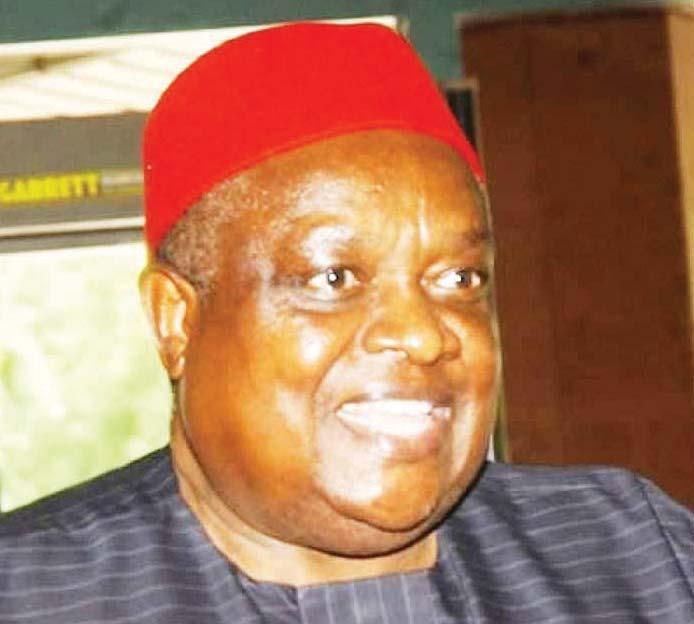
National history has a moral arc. It bends perennially in the direction of justice no matter how long it takes. The Nigerian situation is peculiar in many ways especially in the mechanisms that have kept the nation afloat to date in spite of its inherent injustices. Nigeria is unique in being a nation conceived in compromise, nurtured in geo -ethnic competition and sustained by hegemonic blackmail and systemic injustices.
The new identity politics of the Igbos of the South East is therefore an a rejection of the immorality of the Nigerian state.
No nation is an immaculate conception. Nations come into being and progress sometimes by willfully or inadvertently hurting sections of their populace. Communal clashes, ethnic conflicts, civil wars, slavery, genocide, pogroms, insurgency, foolish mass killings and reprisals thereof are part of national history. When the hour of sadness passes, a nation so afflicted incurs moral debts to those sections of their community that have been hurt. That is the general origin of the politics of moral consequence.
It was understood in Owerri that the agitation for Biafra is the direct consequence of Nigeria’s politics of bad behavior in the last over fifty years. The solution is first to treat the region like other parts of the federation. Militant struggle for justice in the Niger Delta was resolved through the Amnesty programme which has become a permanent structure with a direct charge on the national budget.
In recent times, we have watched as thousands of repentant Boko Haram and other fundamentalist trouble makers in the Northern hemisphere of the country are resettled with cash payments, entrepreneurial assistance and even more decent clothing.
The question remains: why has no one from within the federal government or from the region advocated for amnesty for IPOB militants? And yet we are in area where some of the youth followers of IPOB are merely looking for start -up capital to activate their latent entrepreneurial capacity. Why not set up a South East Business Development Fund as an Amnesty and investment fund to assist repentant IPOB militants with entrepreneurial capital?
Throughout the discussion leg of the Summit, the question of the plight of Mr. Nnamdi Kanu ignited raw sentiments. People agreed that the man has made his point but that the loss of control over his followers has led to monumental loss of lives and great economic losses. The sentiment was that the man should be freed in the interest of peace. He should be treated more like a political prisoner than either a war prisoner or law and order detainee.
The most strategic asset of the South East in Nigeria is of course the vast and expansive entrepreneurial presence of the Igbos all over the country. Therefore, more than most other ethnic nationalities in the country, the Igbos have an inbuilt stake in the unity, peace and harmony of Nigeria both as a patrimony and as a market. This truism is inherent in the ancestral wisdom that no trader likes commotion or a fire outbreak in a market place.
The effective management of the Nigerian diversity is in the interest of the Igbos because of their nature and livelihood. The constitutional guarantee that all Nigerians as citizens are free to reside and own property in every part of the federation is perhaps to the utmost advantage of the Igbo people.
Read
68 THISDAY, THE SUNDAY NEWSPAPER OCTOBER 1, 2023 ENGAGEMENTS with Chidi Amuta e-mail: chidi.amuta@gmail.com
Iwuanyanwu
full article online - www.thisdaylive.com
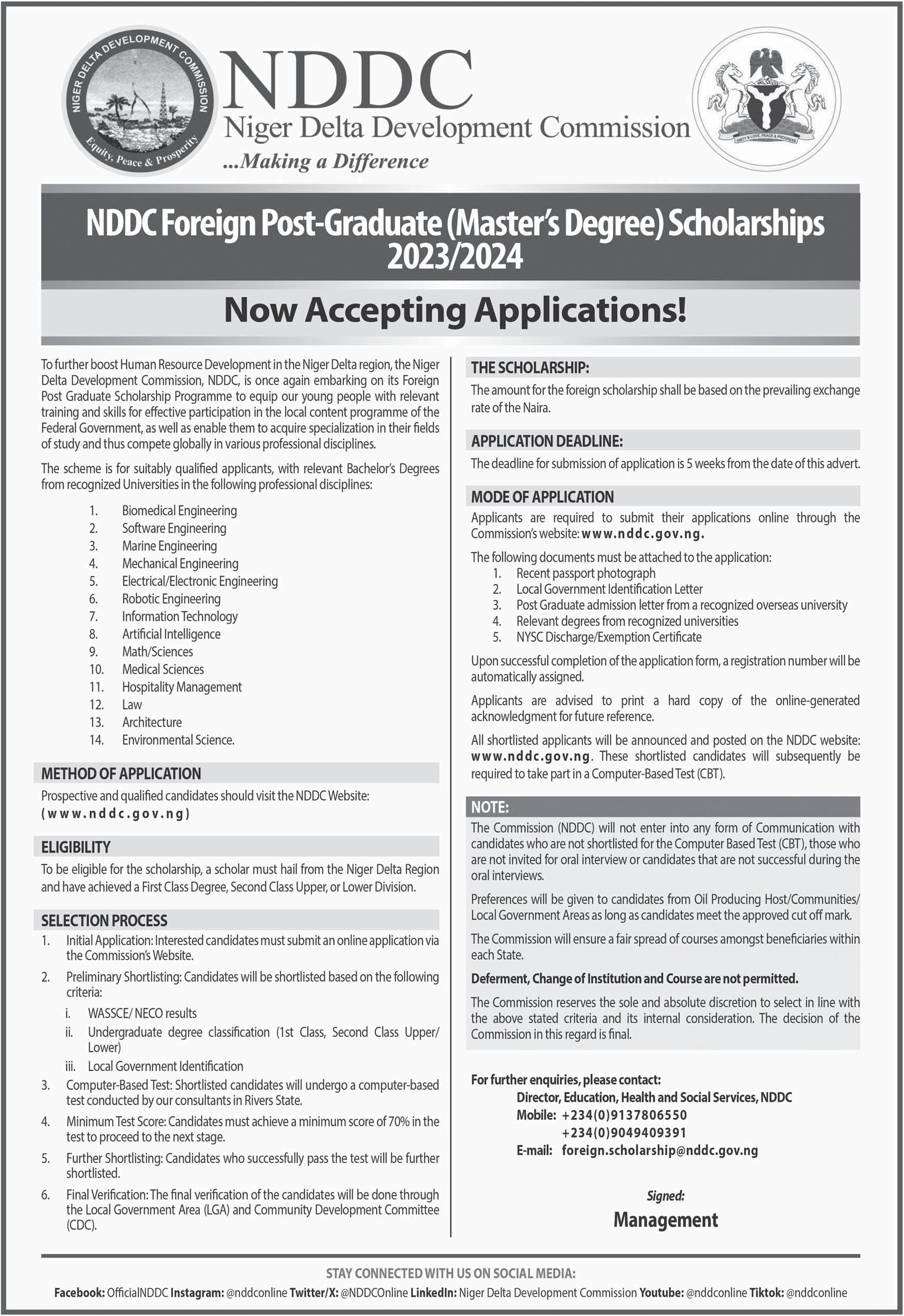
SUNDAY OCTOBER 1, 2023 • THISDAY 69
STAKEHOLDERS’ MEETING…
African Anti-narcotics Agencies Seek Specialised Courts for Drug Offences, Money Laundering
Michael Olugbode in Abuja
Heads of drug law enforcement agencies in Africa have called for the setting up of specialised courts to try drug-related cases and other organised crimes across the continent.
This was part of recommen-
dations adopted at the end of the weeklong 31st Meeting of Heads of National Drug Law Enforcement Agencies, Africa (HONLAF) in Abuja at the weekend.
According to the agencies, governments should consider the establishment of national
Alleged Sex Scandal: UNICAL VC Receives Investigation Panel Report
The Vice Chancellor of the University of Calabar (UNICAL), Prof. Florence Obi, has formally received the report of the investigation panel set up to probe allegations of improprieties levelled against the suspended Dean of Law, Prof. Cyril Ndifon.
The embattled Ndifon was also accused of alleged sexual misconduct by some of his students.
Receiving the report in a brief presentation ceremony in her office, the Vice Chancellor commended the Panel members for their effort and commitment towards the achievement of a thorough and objective report within a short period of time.
She said though management
has not gone through the report, she knows the report will be useful to the University and achieve the needed closure to the subject matter and consequently move forward.
Obi, who reiterated her happiness over the sacrifice and show of commitment by the Panel, assured the report will be presented to the Ministers of Education and that of Women Affairs as well as Executive Secretary of NUC as delivered by the Panel, “nothing added, nothing removed”.
On the scale of mixed comments in the public domain which has trailed the reportage of the subject matter, the Vice Chancellor said the report of the Panel would serve as the mouthpiece of the University to all.
Oyo Court Sends 20 Internet Fraudsters to Jail
Justices Ladiran Akintola and Kamorudeen Olawoyin of the Oyo State High Court sitting in Ibadan, have convicted and sentenced 20 internet fraudsters to different jail terms.
They were jailed after pleading guilty to one-count separate charges bordering on impersonation and obtaining by false pretence.
The convicts are: Olanipekun Damilare Gbolahan, Shedrack Paul Victor, Victor Ogheneremu Kadri, idris Abdulazeez Gbolahan, Olaiya Nifemi Samuel, Aparimo
specialised courts and asset recovery offices dealing with organised crime and money laundering and supporting tracing, recovering and management of proceeds of crime. Governments are encouraged to make effective and full use of existing informal regional and international cooperation instruments aiming at facilitating investigations and prosecuting organised crime, including drug crimes and related money laundering, including West African Network of Central Authorities and Prosecutors (WACAP), Asset Recovery Inter-Agency Network for
Southern Africa (ARINSA), Asset Recovery Inter-Agency Network of West Africa (ARINWA) as well as the UNODC CRIMJUST programme.”
They also urged governments in African countries to promote cooperation and the sharing of best practices in the confiscation of proceeds of crime, including drug-related cases.
“Governments should adopt adequate legal and regulatory frameworks on virtual assets, including cryptocurrencies, to prevent and combat their use for drug-related crime and money laundering.”
Other recommendations adopted by the HONLAF working group during the annual meeting include asking African governments “to develop and implement drug policy responses that address, indirectly or directly, the environmental impact of illicit crop cultivation, drug manufacture, and drug use, taking into consideration positive and negative effects;
“Governments are encouraged to empower indigenous people, youth groups, and local communities to protect the land, forest reserves, and water sources in their areas, making the best of local knowledge and in line with
local interests and needs;
“To address the challenge of limited data, countries are encouraged to promote research and monitoring systems to collect data and establish baselines on environmental impact, which will allow for evidence-based interventions and impact assessment;
“Governments are encouraged to strengthen their capacity to safely dispose of seized drugs, chemicals and the precursors and drug waste, utilising the guidance available from relevant national organizations as well as UNODC;
Olubadan, Senate Leader Beg NLC to Shelve Planned Strike
The Olubadan of Ibadanland, Oba Lekan Balogun, and the Leader of the Senate, Senator Opeyemi Bamidele, have appealed to the Nigeria Labour Congress (NLC) and its Trade Union Congress (TUC) counterpart to tread with caution over their proposed nationwide strike scheduled to begin on Tuesday, October 3. Olubadan, in his 63rd Indepen-
dence Day anniversary statement by his media assistant, Oladele Ogunsola, in Ibadan, the Oyo State capital, further urged the labour leaders to shelve the planned strike and explore ways of resolving the vexatious issues.
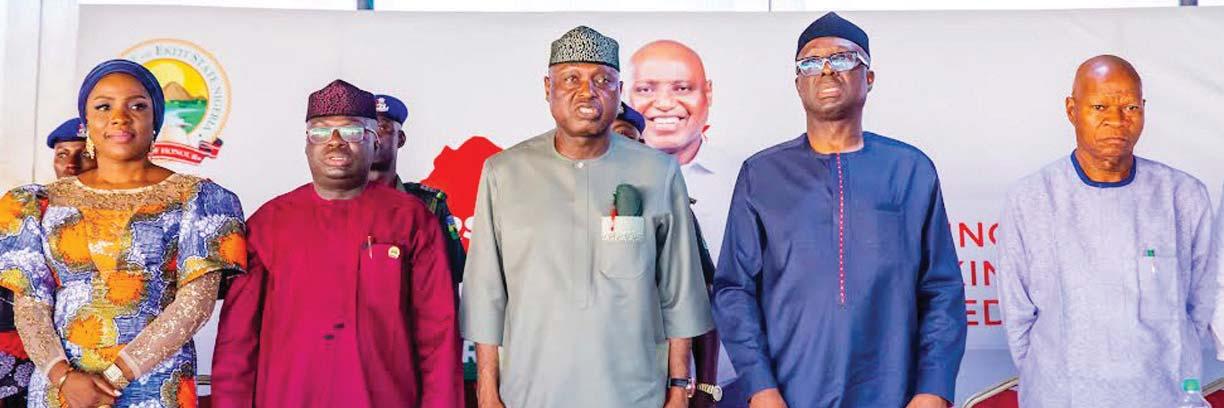
He said: “I want to plead with the workers’ unions and urge the government not to overstretch the people. There must be tangible measures to reassure the people that the renewed hope agenda is truly for real.
“I plead for dialogue between the
labour and government. There should be openness and understanding, bearing in mind that where two elephants fight, it is the grass there that suffers. Let’s be mindful of the effect of total paralysis on our battered economy. Consider the sick, consider the students from our nursery school to the university among several others that would bear the brunt. The loss is simply incalculable.
“I want our labour leaders to cast their minds back to the last prolonged strike by the Academic
Staff Union of Universities and the effect on our students. How do we compensate for the loss of a whole academic session in the lives of the affected students? Such loss is eternal because it is not possible to wind back the hand of the clock. That’s just an example,” the monarch pleaded.
He congratulated President Bola Tinubu; his vice, Kashim Shettima, state governors and the generality of Nigerians on this auspicious occasion.
Niger Delta Groups Urge Tinubu to Completely Clean-up Ogoniland
Ogunfunminiyi Ojoola, Kasimawo Emmanuel Ayomide, Akintaro Isaac Oluwabamise, Oladokun Toheeb Adekola, Hamed Rafiu Olanrewaju and Rofeek Mayowa Ayoade.
Others are Olayiwola Toheeb Olanrewaju, Olusegun-Ola Oreoluwa Casmir, Samson Rotimi, Enoch Fiyinfoluwa Omotoso, Omodele Peter Idowu, Ayinde Azeez Olamide, John Pascal Daniel, Akinkuade Fisayo Folarin and Olanese Bolaji Michael.
Leatherworld Celebrates Independence with Discount to Customers
Foremost Luxury furniture brand, Leatherworld Nigeria Limited has announced special discounts for its clientele as part of its plans to mark Nigeria’s Independence Day.
Leatherworld Nigeria is a leading furniture and interior decoration brand that has been in operation as a Nigerian
company over the past thirty years. During this period, the furniture company has gained a reputation as a trusted brand in the industry.
According to a statement, the special offer which offers clients up to 40 percent off select items will last between the 2nd-7th October.
The Ogoni-American organisations; National Union of Ogoni Students, NUOS Int’l USA, Center for Democracy Human Rights and Anti- Corruption and Movement for the Survival of the Ogoni People, MOSOP have urged the Federal Government of Nigeria, under President Bola Ahmed Tinubu, through the Ministry of the Niger Delta Development, on the need to clean up oil spills in Ogoniland, Rivers State and bring more development to the area.
While congratulating the newly appointed Minister of Niger Delta Development, Abubakar Momoh, the groups said that it is time for the ministry to look into the land that had been producing the wealth of the nation. According to them, almost all the previous administrations in the country have done little or nothing to develop Ogoniland in Rivers State, which they said has been suffering deprivation owing to oil spillage and total neglect.
The groups maintained that the people of Ogoniland they have suffered the devastation of their ecosystems and land. They explained that HYPREP has achieved little or nothing in cleaning up the Ogoni area “but instead has turned the cleaning into a fat cat erectitude, scammed and fraud, while we call on the federal government to launch or conduct a forensic probe and investigation into HYPREP daylight robbery.
The United Nations Envi-
ronment Programme (UNEP) released its Environmental Assessment of Ogoniland in August 2011.
The report was commissioned by and delivered to the Federal Government of Nigeria. It made recommendations to the government, the oil and gas industry and communities to begin a comprehensive cleanup of Ogoniland, restore polluted environments and put an end to all forms of ongoing oil contamination in the region.
Customs, Army, Moves to End Transborder Crimes in Katsina
Francis Sardauna in Katsina
The Nigeria Customs Service (NCS), Nigerian Army (NA), Nigeria Police Force, Nigeria Immigration Service (NIS), and other security agencies in Katsina state have promised to maintain their synergy to combat cross-border and internal security threats posed to the nation by criminal elements.
The heads of the agencies made the vow when the Controller of the Katsina Area Command of the NCS, Mohammed Abubakar Umar, paid them a courtesy visit in their respective offices in Katsina, the state capital.
Speaking at the Headquarters of the 17 Brigade, Nigeria Army, Katsina, the Controller solicited the cooperation of the Brigade
Commander, Brigadier-General Oluremi Ayobami Fadairo, in curbing transborder crimes in the state.
A statement issued by the Public Relations Officer of the NCS, yesterday, quoted Umar as advocating a joint security taskforce and credible intelligence sharing among military and paramilitary agencies to tame
transborder crimes and other security challenges bedeviling the state.
Umar explained that the sharing of credible intelligence would further enhance national security and foster friendship, and unity, and eliminate all forms of reveries among security agencies in the state.
NEWS News Editor: Gboyega Akinsanmi E-mail: gboyega.akinsanmi@thisdaylive.com,08152359253 THISDAY, THE SUNDAY NEWSPAPER OCTOBER 1, 2023 70
Kemi Olaitan in Ibadan and Sunday Aborisade in Abuja
L-R: Deputy Speaker, Ekiti State House of Assembly, Hon Bolaji Egbeyemi-Olagbaju; Speaker, Hon. Adeoye Aribasoye; Governor Biodun Oyebanji; first civilian Governor of the state, Otunba Niyi Adebayo; and Chairman, State Chapter of All Progressives Congress, Paul Omotoso; at the APC leaders and stakeholders meeting in Ado-Ekiti…recently
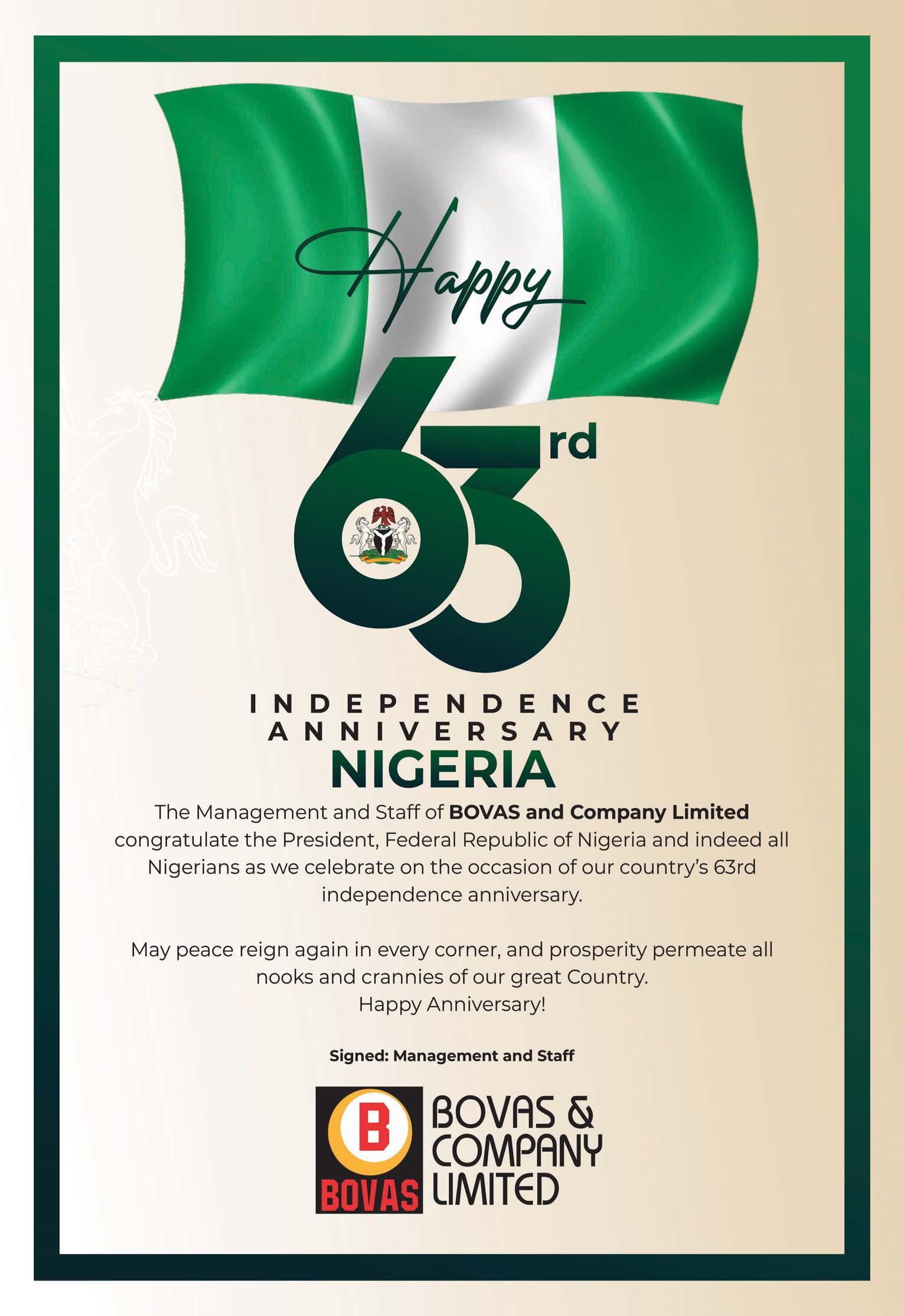
SUNDAY OCTOBER 1, 2023 • THISDAY 71
WAZIRI ADIO
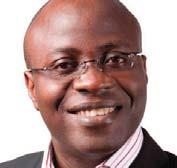
Urgent Need to Fix Nigeria’s Civil Service























One of the major but least discussed problems with Nigeria is its civil service.




The civil service should be the fulcrum of government, the engine of growth and development in society. But in Nigeria, this engine is severely broken and ill-suited for the task of efficient and effective governance in the 21st Century.
Save for a few exceptions, Nigeria’s civil service is largely deficient in quality and professionalism. Culturally, it is anchored on a vaunting sense of entitlement and a crude inversion of the sense of service. For most of the civil servants, it is more about service to selves than to society. And the rules of engagement are overly protective, fashioned by the same people they are meant to keep in line, and invariably enabling bad behaviours.
Nigeria cannot make the desired progress with its civil service as presently constituted, remunerated and socialised. Comprehensive overhaul and upgrades are urgently needed.
Two developments within the week should remind us about some of the key challenges with our civil service and the pressing need for a comprehensive reform. The first is the face-off between the Minister of Works, Senator David Umahi, and some workers of the ministry. The second is about some of the approvals reportedly made by the former Chairman of the Federal Inland Revenue Service (FIRS), Mr. Muhammed Nami.
I will discuss the two episodes, then examine the larger issues.




According to media reports, Umahi ordered the gates of the ministry to be locked after 9.30am on Thursday. This was after he found out that only about 15% of the staff of the ministry had reported for work that day. The adjusted resumption time in the ministry is 9am. Hundreds of workers of the ministry, including directors, were reportedly locked out because they came late by more than 30 minutes.
The workers were miffed by the minister’s effrontery. They reportedly locked him in too, switched off the light in the building, barricaded the road, and started a protest against the minister. This went on for hours. The minister eventually came down to address the workers. There is a long, hard-to-watch video on social media where the leader of the workers publicly chastised the minister for not following due process, for fancying himself as a sole-administrator, for mistaking ‘federal government for a state’, for ‘not constructing even a kilometre of road’ since he assumed office, and where the minister, tactically, ate the humble pie by apologising for offending the workers. It was a sorry sight.
There is a lot to unpack from this unfortunate turn of events. To start with, a case can be made that a minister has no business with gates or the locking of gates and with the floor-level staff members of the ministry. That is too downstream. Ministers should be engaging directly with permanent secretaries, who are the chief accounting officers in the ministries, and with the heads of agencies in their ministries and maybe some relevant directors. It is the permanent secretary that the minister should charge with and hold responsible for enforcing punctuality and discipline. A permanent secretary that cannot get his civil servants to behave can at least be moved elsewhere. Also, a manual register or preferably a biometric log-in device is less dramatic but a more effective way of monitoring
Tinubu
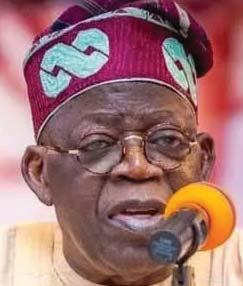
and documenting punctuality.
However, the fact that late-comers who ordinarily should be ashamed and remorseful took umbrage at being locked out shows how low the civil service has sunk. Staging a protest, preventing others from working or accessing a public road, and speaking openly in such an indecorous manner to the political head of the ministry go beyond the pale and negate everything the service should stand for. At issue here is not just habitual late-coming but also insubordination, gross indiscipline and public nuisance—serious infractions frowned at by the very permissive Public Service Rules (PSR). It is important to nip this degeneration in the bud, otherwise it will lead to further deterioration.
The really sad part is that what transpired in the Ministry of Works on Thursday is not an isolated occurrence. In most Ministries, Departments and Agencies (MDAs), it is not unusual for most civil servants to get to work late, to leave before closing time and to saunter in and out during working hours. This is hardly seen as bad behaviour by the perpetrators or those who should enforce discipline and productivity in these MDAs. I documented my own experience in my book, ‘The Arc of the Possible’.
The treatment meted to Senator Umahi is standard fare in agencies where the CEOs insist on discipline and worse where the workers are unionised. It is not so unusual for workers to insult or blackmail or threaten or lock out or make life difficult for CEOs who simply ask them to report for work on time and do their jobs diligently. And they do this without consequences, which emboldens other protesting workers to even push the button further.
To be fair, there are a few centres of excellence and there are some really, really hardworking, conscientious, upright and exceptional civil servants in Nigeria. But for most, the civil service is a place of ease, a place where putting in the minimum shift or even none is the norm, where no one bothers anyone else, and where the rules provide almost iron-clad security of employment.
I understand the principle behind making it difficult to sanction or sack erring civil servants. It accords with universal best practices of insulating the civil service from political interference and protecting civil servants against the whims and vindictiveness of political office
holders. But it has created a situation where most civil servants play with their jobs and underserve the country that spends the bulk of its earnings in paying their salaries. For context, Federal Government’s total revenue for 2022 was N5.3 trillion, according to data from the Office of the Accountant General of the Federation. Out of this, personnel cost and pension gulped N3.8 trillion. This means that 72% of FG’s revenue for the year went to paying a tiny portion of the country’s population.
It can be argued and it is true that most of our civil servants are poorly paid. We need to pay them better and more competitive salaries. Contrary to received wisdom, we actually need more civil servants. According to the Bureau of Public Service Reforms, the total number of federal civil servants as at 2022 was 720, 000. Some other estimates have put the figure at 1.2 million. By the time we add the civil servants employed by states and LGAs, the number will be about five million. For a country with a population of more than 200 million people, all these figures are paltry.
Given our developmental challenges, we actually need more teachers, more doctors and nurses, more firefighters and other emergency responders, more agriculture extension workers, more health inspectors, more police officers and soldiers etc., etc. The problem now is that of misalignment: our civil service is more skewed toward people who just go to the office and push files or just watch Nollywood movies or do their side businesses even in the office. We need to rebalance the service, give civil servants the tool to function optimally and pay them much better.
But the problem goes beyond money. There are actually some government agencies whose staff are as well paid as those who work in the private sector, and in some instances, some civil servants are even better paid than their peers in the private sector. The argument for creating special salary structures for some agencies, especially parastatals, is compelling: to be able to attract and retain the best of those with scarce skills, to pay staff of regulatory agencies as close to the salaries of the sectors they regulate, to insulate those who hold sensitive positions from temptation and capture.
Good arguments in theory. In practice, however, the arguments collapse like the sand houses that kids build on the beach. These organisations are hardly populated by people with scarce skills, and their staff members are rarely above temptation and capture and they hardly exhibit a work ethic commensurate with their special salary scales or different from those in the mainland MDAs. For our politicians, political appointees and political authorisers, these special agencies are good places to plant their wards, relatives and constituents. For the staff members of these agencies, such places are just good places to work, places where they can have the best of all worlds: decent salaries, the protection/ permissiveness of civil service, and regular even if vacuous trainings.
This leads me to the second development of the week. According to The Cable (an online newspaper), the former FIRS boss, Nami, approved expenditure worth N11 billion days after he was relieved of his position. He has denied any wrongdoing. He may or may not be right. However, one of the things that caught my attention, which has not been
denied, was approval for trainings for the staff of the organisation. The Cable revealed that the former FIRS boss approved N1.4 billion for a ‘business case for strategic leadership’ retreat for 807 nominees, N250 million for a course on data mining and analytics for taxation, N221 million for a skills development and management improvement training, and more than N1 billion for different trainings on tax disputes, capital market operations, tax evasion strategies and others. That was at least N2.9 billion as training for a single agency from approvals made in a single day.
The issue for me is not whether Mr. Nami followed due process or not. Nor is it about whether civil servants need constant trainings. It is about what agencies do when they are awash with cash. Some government agencies have become governments within the government, with a few of them receiving more allocations than the National Assembly or the Judiciary, which are whole arms of government. These agencies are those classed as revenue-generating: some are allowed to keep a portion of the revenue they generate or are assigned a special levy or granted a percentage of the money they generate. FIRS falls into the last category, as it keeps 4% of non-oil taxes. Three of these commission-raking agencies received more than N300 billion as their costs of collection in 2021 alone.
I get the argument about the need to incentivise agencies to bring in more revenues to government or the need to earmark money for strategic purposes. But this has ended up as a perverse incentive, and there should be a better way to provide incentive and limit the abuses. Now, every agency wants a special status or wants to generate revenue. This happens at the expense of the citizens and companies that are over-taxed and even at a cost to public treasury. Worse is that the well-resourced agencies spend money on gleaming offices, official cars, foreign trips, sundry allowances and trainings to make their staff sweet and happy (the staff come to see the trainings as entitlement too.) A version of the Parkinson Law states that expenditure rises to meet available revenue. So, no one should be surprised about the absurd spending decisions of these juicy agencies, a widespread practice enabled by the political authorisers.

My point here is that the problem of our civil service goes beyond poor remuneration and limited funding. Since independence, we have had various attempts to reposition the civil service. Notable among these are the Morgan Commission of 1963, the Adebo Commission of 1971, the Udoji Commission of 1972 to 1974, the Dotun Phillips Commission of 1985 and the Oronsaye Panel of 2011. Most of these attempts have been limited to renumeration, structure, tenure and cutting costs. All of these are important. But we can do all these well and still get a suboptimal civil service if we continue to see our civil service as a dumping ground and as a place where bad decisions and bad behaviours are the norm.
The president needs to urgently appoint a reform czar who will be charged with implementing thorough-going but sensible reforms to ensure that our civil servants have the skillsets, the attitude and the ethos to propel the country forward. This won’t be an easy task and it won’t be a vote-winner (as many governors who tried quality of teaching reforms sadly found out). But it is a necessary task. Without improving state capacity for getting things done, all else will be in vain.
Printed and Published in Lagos by Leaders & Company Limited . Lagos: 35 Creek Road, Apapa, Lagos. Abuja: Plot 1, Sector Centre B, Jabi Business District, Solomon Lar Way, Jabi North East, Abuja . All Correspondence to POBox 54749, Ikoyi, Lagos. EMAIL: editor@thisdaylive.com, info@thisdaylive.com. TELEPHONE Lagos: 0802 2924721-2, 08022924485. Abuja: Tel: 08076290487, 08076290488 MISSILE TRUTH & REASON Sunday 1 October, 2023 Price: N400
“Sixty-three years ago, when this great country acquired independence, it was upon the promise of abundant prosperity and the principle of social justice” – Former Vice President, Atiku Abubakar, reminding the federal government that the Nigeria is at crossroads.
Printed and Published in Lagos by THISDAY Newspapers Limited. Lagos: 35 Creek Road, Apapa, Lagos. Abuja: Plot 1, Sector Centre B, Jabi Business District, Solomon Lar Way, Jabi North East, Abuja . All Correspondence to POBox 54749, Ikoyi, Lagos. EMAIL: editor@thisdaylive.com, info@thisdaylive.com. TELEPHONE Lagos: 0802 2924721-2, 08022924485. Abuja: Tel: 08155555292, 08155555929 24/7 ADVERTISING HOT LINES: 0811 181 3085, 0811 181 3086, 0811 181 3087, 0811 181 3088, 0811 181 3089, 0811 181 3090. ENQUIRIES & BOOKING: adsbooking@thisdaylive.com
Atiku to FG
POSTSCRIPT






































 Bill GatesWarren
Bill GatesWarren




























 Vanessa Obioha
Vanessa Obioha

















































